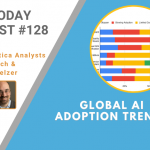- Affärsnyheter
- Alternativ hälsa
- Amerikansk fotboll
- Andlighet
- Animering och manga
- Astronomi
- Barn och familj
- Baseball
- Basket
- Berättelser för barn
- Böcker
- Brottning
- Buddhism
- Dagliga nyheter
- Dans och teater
- Design
- Djur
- Dokumentär
- Drama
- Efterprogram
- Entreprenörskap
- Fantasysporter
- Filmhistoria
- Filmintervjuer
- Filmrecensioner
- Filosofi
- Flyg
- Föräldraskap
- Fordon
- Fotboll
- Fritid
- Fysik
- Geovetenskap
- Golf
- Hälsa och motion
- Hantverk
- Hinduism
- Historia
- Hobbies
- Hockey
- Hus och trädgård
- Ideell
- Improvisering
- Investering
- Islam
- Judendom
- Karriär
- Kemi
- Komedi
- Komedifiktion
- Komediintervjuer
- Konst
- Kristendom
- Kurser
- Ledarskap
- Life Science
- Löpning
- Marknadsföring
- Mat
- Matematik
- Medicin
- Mental hälsa
- Mode och skönhet
- Motion
- Musik
- Musikhistoria
- Musikintervjuer
- Musikkommentarer
- Näringslära
- Näringsliv
- Natur
- Naturvetenskap
- Nyheter
- Nyhetskommentarer
- Personliga dagböcker
- Platser och resor
- Poddar
- Politik
- Relationer
- Religion
- Religion och spiritualitet
- Rugby
- Så gör man
- Sällskapsspel
- Samhälle och kultur
- Samhällsvetenskap
- Science fiction
- Sexualitet
- Simning
- Självhjälp
- Skönlitteratur
- Spel
- Sport
- Sportnyheter
- Språkkurs
- Stat och kommun
- Ståupp
- Tekniknyheter
- Teknologi
- Tennis
- TV och film
- TV-recensioner
- Underhållningsnyheter
- Utbildning
- Utbildning för barn
- Verkliga brott
- Vetenskap
- Vildmarken
- Visuell konst

AI Today Podcast: Artificial Intelligence Insights, Experts, and Opinion
Cognilytica's AI Today podcast focuses on relevant information about what's going on today in the world of artificial intelligence.
500 avsnitt • Längd: 25 min • Veckovis: Onsdag
Om podden
Cognilytica’s AI Today podcast focuses on relevant information about what’s going on today in the world of artificial intelligence. Hosts Kathleen Walch and Ron Schmelzer discuss pressing topics around artificial intelligence with easy to digest content, interview guests and experts on the subject, and cut through the hype and noise to identify what is really happening with adoption and implementation of AI.
The podcast AI Today Podcast: Artificial Intelligence Insights, Experts, and Opinion is created by AI & Data Today. The podcast and the artwork on this page are embedded on this page using the public podcast feed (RSS).
Avsnitt
AI Use Case Series: AI in Automotive [AI Today Podcast]
![AI Use Case Series: AI in Automotive [AI Today Podcast]](https://www.cognilytica.com/wp-content/uploads/2024/09/use-case-AI-in-auto-150x150.png)
In this episode of AI Today hosts Kathleen Walch and Ron Schmelzer discuss how AI is being applied in the AI in Automotive industry.
Continue reading AI Use Case Series: AI in Automotive [AI Today Podcast] at Cognilytica.
AI Use Case Series: AI in Pharma [AI Today Podcast]
![AI Use Case Series: AI in Pharma [AI Today Podcast]](https://www.cognilytica.com/wp-content/uploads/2024/09/use-case-AI-in-pharma-150x150.png)
Artificial intelligence is transforming everything from disease identification and diagnosis to drug discovery, clinical trial optimization, and even manufacturing efficiency. With access to massive amounts of biological, chemical, and patient data, pharma is perfectly positioned to harness the true power of AI. After all, data is the heart of AI. And this industry has plenty of it.
Continue reading AI Use Case Series: AI in Pharma [AI Today Podcast] at Cognilytica.
AI Use Case Series: AI in Insurance [AI Today Podcast]
![AI Use Case Series: AI in Insurance [AI Today Podcast]](https://www.cognilytica.com/wp-content/uploads/2024/09/use-case-AI-in-insurance-150x150.png)
In this episode of AI Today hosts Kathleen Walch and Ron Schmelzer discuss how AI is being applied in insurance. We explore how AI is reshaping the insurance industry in many ways. From smarter risk assessment and personalized underwriting to faster claims processing and fraud detection, AI is helping insurers operate more efficiently and deliver better customer experiences.
Continue reading AI Use Case Series: AI in Insurance [AI Today Podcast] at Cognilytica.
AI Use Case Series: AI in the Supply Chain [AI Today Podcast]
![AI Use Case Series: AI in the Supply Chain [AI Today Podcast]](https://www.cognilytica.com/wp-content/uploads/2024/09/use-case-AI-in-supply-chain-150x150.png)
In this episode of AI Today hosts Kathleen Walch and Ron Schmelzer discuss various ways AI is being used in the supply chain.
Continue reading AI Use Case Series: AI in the Supply Chain [AI Today Podcast] at Cognilytica.
AI Use Case Series: AI in Human Resources [AI Today Podcast]
![AI Use Case Series: AI in Human Resources [AI Today Podcast]](https://www.cognilytica.com/wp-content/uploads/2024/09/use-case-AI-in-HR-150x150.png)
AI is significantly transforming the Human Resources (HR) industry by streamlining processes, improving decision-making, and enhancing employee experiences. This episode of AI Today discusses how AI is being applied to Human Resources.
Significant use of AI is happening around helping with hiring and recruitment. This is especially true for organizations that have constant jobs to fill such as in warehouses and logistics, or seasonal jobs.
Continue reading AI Use Case Series: AI in Human Resources [AI Today Podcast] at Cognilytica.
AI Use Case Series: AI in Marketing [AI Today Podcast]
![AI Use Case Series: AI in Marketing [AI Today Podcast]](https://www.cognilytica.com/wp-content/uploads/2024/09/use-case-AI-in-marketing-150x150.png)
AI has been game-changing for marketers, transforming how companies analyze data, engage with customers, write copy, create images and optimize campaigns. In this episode of AI Today hosts Kathleen Walch and Ron Schmelzer discuss how AI is being used in marketing.
From the hyperpersonalization pattern of AI where you target each individual at scale to predictive analytics where you’re able to look at past or current data to help make better predictions, AI is empowering marketers to achieve unprecedented levels of efficiency and effectiveness.
Continue reading AI Use Case Series: AI in Marketing [AI Today Podcast] at Cognilytica.
AI Use Case Series: AI in Telecommunications [AI Today Podcast]
![AI Use Case Series: AI in Telecommunications [AI Today Podcast]](https://www.cognilytica.com/wp-content/uploads/2024/09/use-case-AI-in-Telecommunications-150x150.png)
AI is driving significant advancements in the telecommunications industry, improving network management, customer service, and operational efficiency.
In this episode of AI Today hosts Kathleen Walch and Ron Schmelzer discuss various ways that AI is being applied in Telecommunications.
With the help of AI telecommunication companies can optimize network performance by analyzing vast amounts of data in real time and then using that data to help predict and resolve network issues before they affect users.
Continue reading AI Use Case Series: AI in Telecommunications [AI Today Podcast] at Cognilytica.
AI Use Case Series: AI in Real Estate [AI Today Podcast]
![AI Use Case Series: AI in Real Estate [AI Today Podcast]](https://www.cognilytica.com/wp-content/uploads/2024/09/use-case-AI-in-real-estate-150x150.png)
The real estate industry is embracing AI for enhancements across a wide range of applications. In this episode of AI Today hosts Kathleen Walch and Ron Schmelzer discuss how AI is being applied in real estate.
AI is helping with data-driven decisions. It can quickly analyze a variety of different data points such as historical sales data, market trends, and specific features for each individual home to provide accurate pricing recommendations, ensuring properties are neither undervalued nor overpriced.
Continue reading AI Use Case Series: AI in Real Estate [AI Today Podcast] at Cognilytica.
AI Use Case Series: AI in Legal [AI Today Podcast]
![AI Use Case Series: AI in Legal [AI Today Podcast]](https://www.cognilytica.com/wp-content/uploads/2024/09/use-case-AI-in-legal-150x150.png)
AI is helping lawyers and the legal profession in a number of ways. In this episode of AI Today hosts Kathleen Walch and Ron Schmelzer discuss how AI is being applied in legal.
AI is helping to assist with research and discovery. AI powered legal research platforms are able to use natural language processing to quickly analyze vast data stores of legal documents, case law, statutes, and regulations.
Continue reading AI Use Case Series: AI in Legal [AI Today Podcast] at Cognilytica.
AI Use Case Series: AI in Media and Entertainment [AI Today Podcast]
![AI Use Case Series: AI in Media and Entertainment [AI Today Podcast]](https://www.cognilytica.com/wp-content/uploads/2024/09/use-case-AI-in-media-150x150.png)
AI tools are helping to transform the media and entertainment industry. In this episode of AI Today hosts Kathleen Walch and Ron Schmelzer discuss various ways that AI is being applied to media and entertainment.
Automated systems are helping with brainstorming ideas, writing articles, summarizing information, and even drafting movie scripts. In the age of streaming, personalization has become a welcome and expected part of audience engagement.
AI Use Case Series: AI Applications in Government [AI Today Podcast]
![AI Use Case Series: AI Applications in Government [AI Today Podcast]](https://www.cognilytica.com/wp-content/uploads/2024/09/use-case-AI-in-gov-150x150.png)
Public sector agencies, which include federal and national governments, provincial, state, and local government agencies, are increasingly making use of AI. AI in government is having an impact on everything from facial recognition and computer vision technology to AI enabled chatbots. In this episode of AI Today hosts Kathleen Walch and Ron Schmelzer share how AI is being adopted and AI applications governments.
AI Use Case Series: AI in Defense [AI Today Podcast]
![AI Use Case Series: AI in Defense [AI Today Podcast]](https://www.cognilytica.com/wp-content/uploads/2024/09/use-case-AI-in-defense-150x150.png)
From autonomous systems to advanced cybersecurity, AI is revolutionizing defense in ways we never imagined. In this episode of AI Today hosts Kathleen Walch and Ron Schmelzer discuss how AI is being applied in defense.
Show Notes:
- CPMAI Training and certification
- Free Intro to CPMAI
- AI Use Case Series: AI in Project Management [AI Today Podcast]
- AI Use Case Series: AI in Transportation [AI Today Podcast]
- AI Use Case series: AI in Manufacturing [AI Today Podcast]
Continue reading AI Use Case Series: AI in Defense [AI Today Podcast] at Cognilytica.
AI Use Case Series: AI in Energy [AI Today Podcast]
![AI Use Case Series: AI in Energy [AI Today Podcast]](https://www.cognilytica.com/wp-content/uploads/2024/09/use-case-AI-in-energy-150x150.png)
When it comes to AI, the topic of energy is quickly becoming a point of discussion. It’s no surprise that AI is energy hungry, whether we’re using that energy to train complicated AI models or responding to the huge amount of demand for generating results and inferences from those trained models. However, AI is also increasingly helping with the generation, transmission, and consumption of energy.
Continue reading AI Use Case Series: AI in Energy [AI Today Podcast] at Cognilytica.
AI Use Case Series: AI in Transportation [AI Today Podcast]
![AI Use Case Series: AI in Transportation [AI Today Podcast]](https://www.cognilytica.com/wp-content/uploads/2024/09/use-case-AI-in-transportation-150x150.png)
In this episode of AI Today hosts Kathleen Walch and Ron Schmelzer discuss various ways that AI is being used in transportation.
Continue reading AI Use Case Series: AI in Transportation [AI Today Podcast] at Cognilytica.
AI Use Case series: AI in Manufacturing [AI Today Podcast]
![AI Use Case series: AI in Manufacturing [AI Today Podcast]](https://www.cognilytica.com/wp-content/uploads/2024/09/use-case-AI-in-manufacturing-150x150.png)
AI is being used in every industry and manufacturing is no exception. In this episode of AI Today hosts Kathleen Walch and Ron Schmelzer discuss how AI is being used in manufacturing.
We discuss how AI is improving the manufacturing process. AI-driven robots are used for automating repetitive tasks, such as assembly, welding, and material handling.
Continue reading AI Use Case series: AI in Manufacturing [AI Today Podcast] at Cognilytica.
AI Use Case Series: AI in Retail [AI Today Podcast]
![AI Use Case Series: AI in Retail [AI Today Podcast]](https://www.cognilytica.com/wp-content/uploads/2024/08/use-case-AI-in-retail-150x150.png)
AI is revolutionizing the retail industry by enhancing customer experience, optimizing operations, and driving innovation. In this episode of AI Today hosts Kathleen Walch and Ron Schmelzer discuss the impact of AI in retail.
Show Notes:
- AI Today Podcast #126: Autonomous RetailAI Today Podcast: Hyperpersonalization at Diageo: Interview with Nick Owen, Diageo
Continue reading AI Use Case Series: AI in Retail [AI Today Podcast] at Cognilytica.
AI Use Case Series: AI and Customer Experience [AI Today Podcast]
![AI Use Case Series: AI and Customer Experience [AI Today Podcast]](https://www.cognilytica.com/wp-content/uploads/2024/08/use-case-AI-in-cust-experience-150x150.png)
The experiences that customers are important. In this episode of AI Today hosts Kathleen Walch and Ron Schmelzer discuss how AI is being used to enhance the customer experience.
We discuss how brands are using AI to provide personalized product or service recommendations. No longer do people need to be provided general suggestions.
Continue reading AI Use Case Series: AI and Customer Experience [AI Today Podcast] at Cognilytica.
AI Use Case Series: AI in Healthcare [AI Today Podcast]
![AI Use Case Series: AI in Healthcare [AI Today Podcast]](https://www.cognilytica.com/wp-content/uploads/2024/08/use-case-AI-in-healthcare-150x150.png)
AI is having an impact on just about every industry. In this episode of AI Today hosts Kathleen Walch and Ron Schmelzer discuss the impact of AI is healthcare.
From streamlining operations to enhancing patient outcomes, AI is rapidly becoming an integral part of modern healthcare. We share how one of the most significant impacts of AI is its role in diagnostics.
Continue reading AI Use Case Series: AI in Healthcare [AI Today Podcast] at Cognilytica.
AI Use Case Series: AI in Construction [AI Today Podcast]
![AI Use Case Series: AI in Construction [AI Today Podcast]](https://www.cognilytica.com/wp-content/uploads/2024/08/use-case-AI-in-construction-150x150.png)
The construction industry is increasingly using AI in a range of ways. In this episode of AI Today hosts Kathleen Walch and Ron Schmelzer discuss how AI is being applied in a number of ways.
Design and Planning for construction
AI and generative AI tools are helping to optimize building designs. We discuss how AI tools analyze vast amounts of data to suggest the most efficient and cost-effective design solutions, reducing material waste and construction time.
Continue reading AI Use Case Series: AI in Construction [AI Today Podcast] at Cognilytica.
AI Use Case Series: AI in Agriculture [AI Today Podcast]
![AI Use Case Series: AI in Agriculture [AI Today Podcast]](https://www.cognilytica.com/wp-content/uploads/2024/08/use-case_-AI-in-agriculture-150x150.png)
One of the oldest professions is agriculture, and over the course of time has undergone significant transformations. Agriculture is now experiencing another transformation with the integration of AI into various processes. In this episode of AI Today hosts Kathleen Walch and Ron Schmelzer discuss how AI in agriculture is having a profound impact.
AI’s impact on agriculture
One of the most significant ways AI is being applied in agriculture is through precision farming.
Continue reading AI Use Case Series: AI in Agriculture [AI Today Podcast] at Cognilytica.
AI Use Case Series: AI in Education [AI Today Podcast]
![AI Use Case Series: AI in Education [AI Today Podcast]](https://www.cognilytica.com/wp-content/uploads/2024/08/use-case_-AI-in-education-150x150.png)
Using AI in education can have a dramatic impact on students and teachers alike. In this episode of AI Today hosts Kathleen Walch and Ron Schmelzer discuss how AI is being applied in education and learning.
AI powered education
Indeed, AI-powered learning is really exciting people! In this episode we discuss how hyperpersonalized learning is allowing each individual to learn at their own pace.
Continue reading AI Use Case Series: AI in Education [AI Today Podcast] at Cognilytica.
AI Use Case Series: AI in Journalism and News [AI Today Podcast]
![AI Use Case Series: AI in Journalism and News [AI Today Podcast]](https://www.cognilytica.com/wp-content/uploads/2024/08/use-case-journalism-1-150x150.png)
AI in impacting every industry and Journalism & News is no exception. In this episode of AI Today hosts Kathleen Walch and Ron Schmelzer will discuss the use of AI in Journalism and News industry.
Assisting with producing content for journalism and news
For newsrooms that need to get content generated, but might not have enough reporters, AI can quickly produce data-driven articles based on structured data, allowing journalists to focus on more complex stories.
Continue reading AI Use Case Series: AI in Journalism and News [AI Today Podcast] at Cognilytica.
Mastering Critical Project Success Areas with GenAI: Interview with Donna Gregorio [AI Today Podcast]
![Mastering Critical Project Success Areas with GenAI: Interview with Donna Gregorio [AI Today Podcast]](https://www.cognilytica.com/wp-content/uploads/2024/11/Interview-with-Donna-Gregorio--150x150.png)
As GenAI tools are becoming even more accessible, project professionals are seeing tremendous value when using these tools. In this episode of AI Today hosts Kathleen Walch and Ron Schmelzer interview Donna Gregorio. She is the department head of the IT project management office at MITRE Corporation and also Vice President of professional development for the PMI Massachusetts Bay Chapter.
The Future of AI in Project Management: Interview with Pierre Le Manh, CEO of Project Management Institute (PMI) [AI Today Podcast]
![The Future of AI in Project Management: Interview with Pierre Le Manh, CEO of Project Management Institute (PMI) [AI Today Podcast]](https://www.cognilytica.com/wp-content/uploads/2024/11/Interview-with-Pierre-Le-Manh-150x150.png)
AI is having a profound impact on many professions, and project management is no exception. In this episode of AI Today hosts Kathleen Walch and Ron Schmelzer interview Pierre Le Manh. He is President and CEO of the Project Management Institute (PMI). Pierre shares insights into PMI’s recent acquisition of Cognilytica and how it’s helping PMI expand its AI-focused offerings.
Essential Skills for AI-Driven Project Managers: Interview with Jay Kiew [AI Today Podcast]
![Essential Skills for AI-Driven Project Managers: Interview with Jay Kiew [AI Today Podcast]](https://www.cognilytica.com/wp-content/uploads/2024/10/Interview-with-Jay-Kiew-150x150.png)
AI tools have been proving valuable to help handle a variety of different tasks. And, project managers are seeing the value AI tools provide. In this episode of AI Today we interview Jay Kiew who is a Founder at Citizen Centric. He discusses the essentials skills for AI-Driven project managers.
Jay discusses the critical abilities project managers need to succeed in the AI landscape.
Applying CPMAI Methodology to AI Projects: Interview with Chris Mielke [AI Today Podcast]
![Applying CPMAI Methodology to AI Projects: Interview with Chris Mielke [AI Today Podcast]](https://www.cognilytica.com/wp-content/uploads/2024/10/Interview-with-Chris-Mielke-150x150.png)
Companies of all sizes in just about every single industry are looking to see how AI, machine learning, and cognitive technology projects can provide a competitive edge, provide efficiencies, and improve ROI in today’s competitive landscape. As a result, this creates tremendous opportunity in the field of AI for professionals who are CPMAI certified and follow the CPMAI methodology.
Ethical AI and Project Management: Interview with Vince Lynch, CEO of IV.AI [AI Today Podcast]
![Ethical AI and Project Management: Interview with Vince Lynch, CEO of IV.AI [AI Today Podcast]](https://www.cognilytica.com/wp-content/uploads/2024/10/Interview-with-Vince-Lynch-150x150.png)
This episode is the audio recording of the discussion moderated by Kathleen Walch at PMI’s Global Summit 2024 event. This event took place in LA on September 20th. On this panel we get insights from Vince Lynch who is CEO of IV.AI.
The discussion starts off with Vince sharing some of the biggest challenges he’s seen with managing AI-driven projects.
AI Use Case Series: AI in Customer Service [AI Today Podcast]
![AI Use Case Series: AI in Customer Service [AI Today Podcast]](https://www.cognilytica.com/wp-content/uploads/2024/08/use-case-customer-service-150x150.png)
in today’s competitive landscape, quality service is crucial for long-term success of any business. In this episode of the AI Today hosts Kathleen Walch and Ron Schmelzer discuss the use of AI in customer service.
AI-Powered Offerings
The use of AI chatbots and LLMs are having a significant impact on customer service.
Continue reading AI Use Case Series: AI in Customer Service [AI Today Podcast] at Cognilytica.
AI Use Case Series: AI in Finance [AI Today Podcast]
![AI Use Case Series: AI in Finance [AI Today Podcast]](https://www.cognilytica.com/wp-content/uploads/2024/08/use-case-finance-150x150.png)
The financial industry, long known for its use of technology and data, is embracing AI as a tool for innovation and efficiency. In this episode of AI Today hosts Kathleen Walch and Ron Schmelzer discuss how AI is being applied in finance.
AI Helping to Streamline and Enhance Finance Operations
AI is being applied to automate routine tasks, reduce human error, and optimize processes.
Continue reading AI Use Case Series: AI in Finance [AI Today Podcast] at Cognilytica.
AI Use Case Series: AI in Project Management [AI Today Podcast]
![AI Use Case Series: AI in Project Management [AI Today Podcast]](https://www.cognilytica.com/wp-content/uploads/2024/08/use-case-PM-150x150.png)
Enterprises are increasingly incorporating AI into many aspects of their daily business. And, with this, the project professional is increasingly using AI for a number of tasks. From AI chatbots, to predictive analytics, to generative AI applications that help automate project management duties such as project documentation, meeting minutes, or report generation, the use of AI among project managers is growing.
Continue reading AI Use Case Series: AI in Project Management [AI Today Podcast] at Cognilytica.
Cognilytica is now part of PMI! [AI Today Podcast]
![Cognilytica is now part of PMI! [AI Today Podcast]](https://www.cognilytica.com/wp-content/uploads/2024/08/Cognilytica-is-now-part-of-PMI-150x150.png)
We have some super exciting news to share with you all! And, we want our community to hear this news directly from us. Project Management Institute (PMI), the world’s leading organization for the project management profession has acquired Cognilytica and Managing Partners Kathleen Walch and Ron Schmelzer have joined PMI’s Senior Leadership Team!
In this episode of AI Today hosts Kathleen Walch and Ron Schmelzer reflect on Cognilytica’s and AI Today’s journey these past eight years.
Continue reading Cognilytica is now part of PMI! [AI Today Podcast] at Cognilytica.
Is the Mood Turning Against AI? [AI Today Podcast]
![Is the Mood Turning Against AI? [AI Today Podcast]](https://www.cognilytica.com/wp-content/uploads/2024/08/Is-the-Mood-Turning-Against-AI--150x150.png)
In our very first podcast we asked the question “Why Does AI Matter?”. So we thought it only fitting as we start our eighth season of AI Today to come back to this topic. In this episode of AI Today hosts Kathleen Walch and Ron Schmelzer discuss whether or not the mood is turning against AI.
Continue reading Is the Mood Turning Against AI? [AI Today Podcast] at Cognilytica.
AI Use Case Series: AI in Fitness and Wellness [AI Today Podcast]
![AI Use Case Series: AI in Fitness and Wellness [AI Today Podcast]](https://www.cognilytica.com/wp-content/uploads/2024/08/use-case-fitness-150x150.png)
AI continues to impact and enhance every industry. From better nutrition, better sleep, practicing mindfulness and meditation, to improved insights on one’s overall health AI is having a big impact on fitness and wellness. In this episode of AI Today hosts Kathleen Walch and Ron Schemzler share AI’s impact on the fitness and wellness industry.
Continue reading AI Use Case Series: AI in Fitness and Wellness [AI Today Podcast] at Cognilytica.
AI Use Case Series: How AI is being Applied in Sports [AI Today Podcast]
![AI Use Case Series: How AI is being Applied in Sports [AI Today Podcast]](https://www.cognilytica.com/wp-content/uploads/2024/08/AI-in-sports-150x150.png)
AI is being used in many industries and sports is no exception. AI is being applied to enhance all areas of sports from the athlete to the fan, the coach to the referee, and even in judging athletic competition. In this episode of AI Today hosts Kathleen Walch and Ron Schmelzer discuss how AI is being applied in professional sports.
The Need for Adaptability with AI [AI Today Podcast]
![The Need for Adaptability with AI [AI Today Podcast]](https://www.cognilytica.com/wp-content/uploads/2024/08/adaptability-150x150.png)
Adaptability is the ability to adjust to new conditions, environments, or situations effectively and efficiently. It involves being open to change, learning quickly from experiences, and having the flexibility to modify one’s approach in response to shifting circumstances. In this episode of AI Today hosts Kathleen Walch and Ron Schmelzer continue with the soft skills series and discuss the soft skill of adaptability.
Continue reading The Need for Adaptability with AI [AI Today Podcast] at Cognilytica.
What is an AI-First Mindset? [AI Today Podcast]
![What is an AI-First Mindset? [AI Today Podcast]](https://www.cognilytica.com/wp-content/uploads/2024/08/What-is-an-AI-First-Mindset-150x150.png)
An AI-First Mindset refers to a proactive and strategic approach to integrating AI into all aspects of your life both personally and professionally. It involves prioritizing and using AI as a key driver for decision-making, innovation, and problem-solving. In this episode of AI Today hosts Kathleen Walch and Ron Schmelzer discuss what having an AI-First mindset means.
Continue reading What is an AI-First Mindset? [AI Today Podcast] at Cognilytica.
What’s happening with AI and Search? [AI Today Podcast]
![What’s happening with AI and Search? [AI Today Podcast]](https://www.cognilytica.com/wp-content/uploads/2024/08/Search-and-AI-150x150.png)
If you’re ever done a web search you know that getting relevant and appropriate answers on the web can take a lot of effort. Oftentimes, it also requires multiple attempts to get relevant results. In this episode of AI Today hosts Kathleen Walch and Ron Schmelzer discuss the changing landscape of AI and search.
How AI is changing search
Already, AI is proving to be a massive enhancement and augmentation to the everyday work and tasks of businesses, enterprises, and organizations of all types.
Continue reading What’s happening with AI and Search? [AI Today Podcast] at Cognilytica.
Understanding and Power Skills – Keys to AI Success: Interview with Rich Maltzman, Boston University

Data is integral at any organization. However, data on it’s own doesn’t provide much value. If we want to get more from our data and AI systems, and if we truly want to get machines to become more intelligent, we need to bridge that gap with at least some understanding of those patterns. In this episode of AI Today hosts Kathleen Walch and Ron Schmelzer interivew Rich Maltzman.
How AI is Transforming Manufacturing and Other Industries: Interview with Linda Yao, Lenovo [AI Today Podcast]
![How AI is Transforming Manufacturing and Other Industries: Interview with Linda Yao, Lenovo [AI Today Podcast]](https://www.cognilytica.com/wp-content/uploads/2024/07/Lenovo-interview-150x150.png)
CIOs everywhere are gearing up for increased investments in AI, while facing challenges and overcoming barriers that come with implementing and scaling AI. In this episode of AI Today hosts Kathleen Walch and Ron Schmelzer interview Linda Yao. Linda is COO and Head of AI Solutions and Services at Lenovo.
AI’s Impact on CIOs
Recently, Lenovo conducted a global survey of CIOs.
Skip the AI Proof of Concept [AI Today Podcast]
![Skip the AI Proof of Concept [AI Today Podcast]](https://www.cognilytica.com/wp-content/uploads/2024/07/Skip-the-Proof-of-Concept-150x150.png)
Here’s a hint as to what is separating the AI failures from successes: skip the proof of concept. When it comes to AI projects go right for pilot projects. In this episode of AI Today hosts Kathleen Walch and Ron Schmelzer discuss AI Pilots vs. Proof of Concepts.
AI Pilots vs. Proof of Concepts
A proof-of-concept is a project that is a trial or test run to illustrate if something is even possible and to prove your technology works.
Continue reading Skip the AI Proof of Concept [AI Today Podcast] at Cognilytica.
How AI is Transforming Insurance: Interview with Connor Atchison & Itay Mishan, Wisedocs [AI Today Podcast]
![How AI is Transforming Insurance: Interview with Connor Atchison & Itay Mishan, Wisedocs [AI Today Podcast]](https://www.cognilytica.com/wp-content/uploads/2024/07/Wisedocs-interview-150x150.png)
AI and generative AI is proving transformational in every industry. This includes long established industries like insurance. In particular, the growth of generative AI in the insurance and insurtech space in showing tremendous potential. In this episode of AI Today we interview Connor Atchison (CEO) & Itay Mishan (CTO) at Wisedocs.
How is AI used in the insurance industry?
Are We Still Repeating the Same Mistakes with AI? [AI Today Podcast]
![Are We Still Repeating the Same Mistakes with AI? [AI Today Podcast]](https://www.cognilytica.com/wp-content/uploads/2024/07/Are-We-Still-Repeating-the-Same-Mistakes-with-AI-150x150.png)
Artificial intelligence has been on the horizon for over seventy years. In fact, the term AI was officially coined in 1956. So, why does it seem so close but also so unattainable? In this episode of AI Today hosts Kathleen Walch and Ron Schmelzer discuss the question: Are we still repeating the same mistakes with AI?
What Iteration Really Means with AI [AI Today Podcast]
![What Iteration Really Means with AI [AI Today Podcast]](https://www.cognilytica.com/wp-content/uploads/2024/07/What-Iteration-Really-Means-with-AI-150x150.png)
AI projects aren’t dying because of big problems. Rather it’s the small things that are causing projects to fail. In this episode of AI Today hosts Kathleen Walch and Ron Schmelzer discuss what iteration really means for AI projects.
Continuous Model Iteration
We always say that AI projects are never set it and forget it.
Continue reading What Iteration Really Means with AI [AI Today Podcast] at Cognilytica.
Why “Move Fast and Break Things” Doesn’t Work for AI [AI Today Podcast]
![Why “Move Fast and Break Things” Doesn’t Work for AI [AI Today Podcast]](https://www.cognilytica.com/wp-content/uploads/2024/07/why-move-fast-break-things-doesnt-work-with-AI-150x150.png)
Move Fast and Break Things worked for high flying Silicon Valley startup megatech companies but it doesn’t work for AI projects. Between 70%-80% of AI projects are failing to meet their objectives. With stats like this, it’s clear that breaking things isn’t leading to success in AI. In this episode of AI Today hosts Kathleen Walch and Ron Schmelzer dig into this topic.
The Necessary (and often Missing) “U” in the DIKUW Pyramid [AI Today Podcast]
![The Necessary (and often Missing) “U” in the DIKUW Pyramid [AI Today Podcast]](https://www.cognilytica.com/wp-content/uploads/2024/07/DIKUW-pyramid-150x150.png)
One of the most vexing problems in even today’s highly capable intelligence systems is for systems to actually understand what they are generating as output. Repeating a pattern, even a sophisticated pattern, while showing good knowledge of the pattern, doesn’t really help if the system doesn’t really understand what it is generating. In this episode of AI Today hosts Kathleen Walch and Ron Schmelzer discuss this DIKUW pyramid and why the “U” understanding level is a critical, but often left out, layer of the pyramid.
Soft Skills for AI: Why Collaboration is Key for AI Success [AI Today Podcast]
![Soft Skills for AI: Why Collaboration is Key for AI Success [AI Today Podcast]](https://www.cognilytica.com/wp-content/uploads/2024/06/collaboration-150x150.png)
Soft skills are increasingly becoming important for AI, and in particular Generative AI. Collaboration can accelerate learning, creativity, and innovation. In this episode of AI Today hosts Kathleen Walch and Ron Schmelzer discuss the critical skill of collaboration.
Why Collaboration skills are needed for AI
In this episode we discuss why collaboration skills are important to improve your interaction with AI systems.
AI in Local Government: Interview with Roxy Ndebumadu [AI Today Podcast]
![AI in Local Government: Interview with Roxy Ndebumadu [AI Today Podcast]](https://www.cognilytica.com/wp-content/uploads/2024/06/Roxy-Ndebumadu-150x150.png)
AI is being adopted by many organizations and they are seeing dramatic improvement, increased productivity, and cost savings. However, government at all levels, including local governments, are also seeing dramatic improvements when adopting AI. On this episode of AI Today we interview Roxy Ndebumadu. She is the District 4 Councilmember at Bowie, MD City Council.
Unlocking the power of Communication with AI [AI Today Podcast]
![Unlocking the power of Communication with AI [AI Today Podcast]](https://www.cognilytica.com/wp-content/uploads/2024/06/communication-150x150.png)
Effective communication is vital for enhancing both human-to-machine and human-to-human interactions with AI. Clear communication ensures more accurate and optimal outputs from AI systems. Additionally, AI tools can improve our communication skills by helping us better articulate and present our ideas and creative needs. In this episode of AI Today hosts Kathleen Walch and Ron Schmelzer continue with the soft skills series and discuss the soft skill of communication.
Continue reading Unlocking the power of Communication with AI [AI Today Podcast] at Cognilytica.
Soft Skills for AI: The Necessity & Enhancement of Creativity with AI [AI Today Podcast]
![Soft Skills for AI: The Necessity & Enhancement of Creativity with AI [AI Today Podcast]](https://www.cognilytica.com/wp-content/uploads/2024/06/creativity-150x150.png)
Creativity is a uniquely human trait that allows for the expression of individuality and a range of emotions. In this episode of AI Today hosts Kathleen Walch and Ron Schmelzer continue with our soft skills series discussing creativity.
AI, especially generative AI, is transforming personal and professional tasks like writing, report generation, and image creation, making them easier and more accessible.
AI Accountability & Colorado’s Trailblazing AI Consumer Law: Interview with Rep Manny Rutinel [AI Today Podcast]
![AI Accountability & Colorado’s Trailblazing AI Consumer Law: Interview with Rep Manny Rutinel [AI Today Podcast]](https://www.cognilytica.com/wp-content/uploads/2024/06/Manny-Rutinel-150x150.png)
On May 17, 2024, Governor Jared Polis signed SB24-205, a pioneering law to protect Colorado consumers using AI systems. The legislation mandates transparency and accountability, ensuring AI technologies are developed ethically and fairly. In this episode of AI Today hosts Kathleen Walch and Ron Schmelzer interview Rep Manny Rutinel. He is a Colorado State Representative and a Prime Sponsor of the bill in the House.
The Rise of Agentic AI [AI Today Podcast]
![The Rise of Agentic AI [AI Today Podcast]](https://www.cognilytica.com/wp-content/uploads/2024/06/Agentic-AI-150x150.png)
Generative AI has significantly influenced content creation, data analysis, and interactive communication, but there is a growing need for intelligent systems to perform tasks with minimal human input. In this episode of AI Today hosts Kathleen Walch and Ron Schmelzer dicuss the concept of Agentic AI, including what it is, and why it’s becoming popular.
Continue reading The Rise of Agentic AI [AI Today Podcast] at Cognilytica.
Applying CPMAI Methodology to AI Projects: Interview with Laetitia Callegari [AI Today Podcast]
![Applying CPMAI Methodology to AI Projects: Interview with Laetitia Callegari [AI Today Podcast]](https://www.cognilytica.com/wp-content/uploads/2024/06/Interview-with-Laetitia-Callegari--150x150.png)
Companies of all sizes across the globe in just about every single industry are looking to see how AI can provide them a competitive edge. They want AI to provide efficiencies and improve ROI in today’s competitive landscape. As a result, this creates tremendous opportunity in the field of AI for project professionals who are CPMAI certified and follow the CPMAI methodology.
Why Critical Thinking is Crucial for AI [AI Today Podcast]
![Why Critical Thinking is Crucial for AI [AI Today Podcast]](https://www.cognilytica.com/wp-content/uploads/2024/05/critical-thinking-150x150.png)
The widespread adoption and use of generative AI means that folks no longer need to be an expert in “hard” skills such as statistics & probability, calculus, or linear algebra to get value from using Generative AI. Instead, the need to use soft skills such as communication, curiosity, problem solving, and adaptability is becoming more important.
Continue reading Why Critical Thinking is Crucial for AI [AI Today Podcast] at Cognilytica.
Cognilytica’s AI-Enabled Vision of the Future: Pervasive Knowledge [AI Today Podcast]
![Cognilytica’s AI-Enabled Vision of the Future: Pervasive Knowledge [AI Today Podcast]](https://www.cognilytica.com/wp-content/uploads/2024/05/Pervasive-Knowledge-150x150.png)
The Four-Part AI-Enabled Vision of the Future
In 2018, when at the time we thought AI hype couldn’t get any more hype-y, we at Cognilytica spent time thinking about what the broad implications of AI would be on our individual lives, our business and work lives, and on society in general. This thinking led us to put together our four-part vision we called the “AI-Enabled Vision of the Future”.
Cognilytica’s AI-Enabled Vision of the Future: Enhancing the Human Experience [AI Today Podcast]
![Cognilytica’s AI-Enabled Vision of the Future: Enhancing the Human Experience [AI Today Podcast]](https://www.cognilytica.com/wp-content/uploads/2024/05/Enhanced-human-experience-150x150.png)
The Four-Part AI-Enabled Vision of the Future
In 2018, when at the time we thought AI hype couldn’t get any more hype-y, we at Cognilytica spent time thinking about what the broad implications of AI would be on our individual lives, our business and work lives, and on society in general. This thinking led us to put together our four-part vision we called the “AI-Enabled Vision of the Future”.
Cognilytica’s AI-Enabled Vision of the Future: AI-Augmented Everything [AI Today Podcast]
![Cognilytica’s AI-Enabled Vision of the Future: AI-Augmented Everything [AI Today Podcast]](https://www.cognilytica.com/wp-content/uploads/2024/05/Augmented-everything-150x150.png)
The Four-Part AI-Enabled Vision of the Future
In 2018, when at the time we thought AI hype couldn’t get any more hype-y, we at Cognilytica spent time thinking about what the broad implications of AI would be on our individual lives, our business and work lives, and on society in general. This thinking led us to put together our four-part vision we called the “AI-Enabled Vision of the Future”.
Cognilytica’s AI-Enabled Vision of the Future: The AI-Enhanced Organization [AI Today Podcast]
![Cognilytica’s AI-Enabled Vision of the Future: The AI-Enhanced Organization [AI Today Podcast]](https://www.cognilytica.com/wp-content/uploads/2024/05/AI-enhanced-org-150x150.png)
The Four-Part AI-Enabled Vision of the Future
In 2018, when at the time we thought AI hype couldn’t get any more hype-y, we at Cognilytica spent time thinking about what the broad implications of AI would be on our individual lives, our business and work lives, and on society in general. This thinking led us to put together our four-part vision we called the “AI-Enabled Vision of the Future”.
Cognilytica’s AI-Enabled Vision of the Future – UPDATED [AI Today Podcast]
![Cognilytica’s AI-Enabled Vision of the Future – UPDATED [AI Today Podcast]](https://www.cognilytica.com/wp-content/uploads/2024/05/AI-Vision-of-Future-150x150.png)
Back in 2018, when at the time we thought AI hype couldn’t get any more hype-y, we at Cognilytica spent time thinking about what the broad implications of AI would be on our individual lives, our business and work lives, and on society in general. This thinking led us to put together our four-part vision we called the “AI-Enabled Vision of the Future”.
Prompt Engineering Best Practices: Soft Skills [AI Today Podcast]
![Prompt Engineering Best Practices: Soft Skills [AI Today Podcast]](https://www.cognilytica.com/wp-content/uploads/2024/05/soft-skills-150x150.png)
Generative AI is one of the most accessible forms of AI currently available. While in the past, you might have used AI without knowing it, you can use Generative AI purposefully in ways that have immediate and dramatic impact on your daily life. In this episode of AI Today hosts Kathleen Walch and Ron Schmelzer discuss what soft skills are necessary to get what we want out of Generative AI.
Continue reading Prompt Engineering Best Practices: Soft Skills [AI Today Podcast] at Cognilytica.
AI’s Impact on Project Management: Interview with Saby Waraich [AI Today Podcast]
![AI’s Impact on Project Management: Interview with Saby Waraich [AI Today Podcast]](https://www.cognilytica.com/wp-content/uploads/2024/04/Saby-Waraich-150x150.png)
AI, and in particular generative AI, is having a profound impact on just about every industry. In this episode of AI Today hosts Kathleen Walch and Ron Schmelzer interview Saby Waraich to discuss AI’s impact on Project Management. Saby is CIO at Clackamas Community College and and speaking at the PMI Austin, TX Professional Development Day May 2, 2024.
AI’s Impact on Communication skills: Interview with Patti DeNucci [AI Today Podcast]
![AI’s Impact on Communication skills: Interview with Patti DeNucci [AI Today Podcast]](https://www.cognilytica.com/wp-content/uploads/2024/04/Patti-DeNucci-150x150.png)
Effective communication is an important skill to have. And, in this AI-era it’s more important than ever. In this episode of AI Today hosts Kathleen Walch and Ron Schmelzer interview Patti DeNucci. She is an author, speaker, workshop facilitator, consultant and keynoting the PMI Austin, TX Professional Development Day May 2, 2024.
How does AI impact communication?
Prompt Engineering Best Practices: Hack and Track [AI Today Podcast]
![Prompt Engineering Best Practices: Hack and Track [AI Today Podcast]](https://www.cognilytica.com/wp-content/uploads/2024/04/hack-and-track-150x150.png)
Experimenting, testing, and refining your prompts are essential. The journey to crafting the perfect prompt often involves trying various strategies to discover what works best for your specific needs. A best practice is to constantly experiment, practice, and try new things using an approach called “hack and track”. This is where you use a spreadsheet or other method to track what prompts work well as you experiment.
Prompt Engineering Best Practices: Using Plugins [AI Today Podcast]
![Prompt Engineering Best Practices: Using Plugins [AI Today Podcast]](https://www.cognilytica.com/wp-content/uploads/2024/04/Using-Plugins-150x150.png)
Plugins for Large Language Models (LLMs) are additional tools or extensions that enhance the LLM’s capabilities beyond its base functions. In this episode hosts Kathleen Walch and Ron Schmelzer discuss this topic in greater detail.
Can I use plugins with ChatGPT?
Plugins can access external databases, perform specific computations, or interact with other software and APIs to fetch real-time data, execute code, and more.
Continue reading Prompt Engineering Best Practices: Using Plugins [AI Today Podcast] at Cognilytica.
Prompt Engineering Best Practices: Using Custom Instructions [AI Today Podcast]
![Prompt Engineering Best Practices: Using Custom Instructions [AI Today Podcast]](https://www.cognilytica.com/wp-content/uploads/2024/04/Custom-Instructions-1-150x150.png)
As folks continue to use LLMs, best practices are emerging to help users get the most out of LLMs. OpenAI’s ChatGPT allows users to tailor responses to match their tone and desired output goals. Many have reported that using custom instructions results in much more accurate, precise, consistent, and predictable results. But why would you want to do this and why does it matter?
Applying CPMAI Methodology in the real world: Interview with George Fountain, Booz Allen Hamilton (BAH) [AI Today Podcast]
![Applying CPMAI Methodology in the real world: Interview with George Fountain, Booz Allen Hamilton (BAH) [AI Today Podcast]](https://www.cognilytica.com/wp-content/uploads/2024/04/George-Fountain-150x150.png)
Companies of all sizes in every industry are looking to see how Artificial Intelligence (AI), machine learning (ML), and cognitive technology projects can provide them a competitive edge. They want to provide efficiencies and improve ROI in today’s competitive landscape. As a result, this creates tremendous opportunity in the field of AI for professionals who are CPMAI certified and follow the CPMAI methodology.
Prompt Engineering Best Practices: What is Prompt Chaining? [AI Today Podcast]
![Prompt Engineering Best Practices: What is Prompt Chaining? [AI Today Podcast]](https://www.cognilytica.com/wp-content/uploads/2024/04/Prompt-Chaining-150x150.png)
To improve the reliability and performance of LLMs, sometimes you need to break large tasks/prompts into sub-tasks. Prompt chaining is when a task is split into sub-tasks with the idea to create a chain of prompt operations. Prompt chaining is useful if the LLM is struggling to complete your larger complex task in one step.
Prompt Engineering Best Practices: Using a Prompt Pattern [AI Today Podcast]
![Prompt Engineering Best Practices: Using a Prompt Pattern [AI Today Podcast]](https://www.cognilytica.com/wp-content/uploads/2024/04/Using-a-prompt-pattern-1-150x150.png)
LLMs are basically big “text predictors” that try to generate outputs based on what it expects is the most likely desired output based on what the user provides as the text-based input, the prompt. Prompts are natural language instructions for an LLM provided by a human so that it will deliver the desired results you’re looking for.
How AI will Re-imagine Air Travel: Interview with Bernadette Berger, Alaska Airlines [AI Today Podcast]
![How AI will Re-imagine Air Travel: Interview with Bernadette Berger, Alaska Airlines [AI Today Podcast]](https://www.cognilytica.com/wp-content/uploads/2024/04/Bernadette-Berger-Alaska-Airlines-150x150.png)
AI is helping to re-imagine experiences of all sorts, including air travel. At the 2024 SXSW Conference and Festivals Bernadette Berger, who is Director of Innovation at Alaska Airlines presents on “The Sky’s the Limit: How AI will Re-imagine Airports”. In this episode of the AI Today podcast hosts and AI thought leaders Kathleen Walch and Ron Schmelzer have the opportunity to interview Bernadette.
AI’s impact in the practice of medicine: Interview with Dr. Jag Singh, Mass General Brigham [AI Today Podcast]
![AI’s impact in the practice of medicine: Interview with Dr. Jag Singh, Mass General Brigham [AI Today Podcast]](https://www.cognilytica.com/wp-content/uploads/2024/03/Dr.-Jag-SIngh-150x150.png)
AI is having an impact on every industry, including healthcare. AI’s impact in the practice of medicine is helping to reshape the practice of medicine both now, and in the future. In this episode of the AI Today podcast we interview Dr. Jag Singh. He is a Professor of Medicine at Harvard Medical School, focusing on the application of AI in the practice of medicine.
AI Everywhere with Software and Hardware: Interview with Wei Li, Intel [AI Today Podcast]
![AI Everywhere with Software and Hardware: Interview with Wei Li, Intel [AI Today Podcast]](https://www.cognilytica.com/wp-content/uploads/2024/03/Wei-Li-Intel-150x150.png)
During the SXSW 2024 event, Wei Li presented on AI Everywhere with Software and Hardware. In this episode of the AI Today podcast we interview Wei Li. He is VP/GM of the AI Software Engineering Team at Intel.
He shares with what insights from that talk and what he means by AI being everywhere in both hardware and software.
Lowering Barriers to Entry for AI: Interview with Nuri Cankaya, Intel [AI Today Podcast]
![Lowering Barriers to Entry for AI: Interview with Nuri Cankaya, Intel [AI Today Podcast]](https://www.cognilytica.com/wp-content/uploads/2024/03/Nuri-Cankaya-Intel-150x150.png)
As organizations continue to adopt AI the idea of innovation and sustainability are becoming important conversations. Intel wants to accelerate AI adoption by lowering barriers to entry for customers. In this episode of the AI Today podcast we interview Nuri Cankaya. He is the VP of AI Marketing at Intel.
Nuri sheds light on the myriad challenges faced by companies as they navigate the integration of AI with real-world data.
AI’s Impact on Healthcare: Interview with Dr. Jesse Ehrenfeld, AMA [AI Today Podcast]
![AI’s Impact on Healthcare: Interview with Dr. Jesse Ehrenfeld, AMA [AI Today Podcast]](https://www.cognilytica.com/wp-content/uploads/2024/03/Interview-with-Dr-Ehrenfeld-150x150.png)
AI is having an impact on just about every industry and healthcare is no exception. In this episode of the AI Today podcast Cognilytica AI thought leaders Kathleen Walch and Ron Schmelzer interview Dr. Jesse Ehrenfeld. He is President of the American Medical Association (AMA). He also recently spoke at the 2024 SXSW Conference and Festivals.
The People Side of AI: Interview with Ian Beacraft, Signal and Cipher [AI Today podcast]
![The People Side of AI: Interview with Ian Beacraft, Signal and Cipher [AI Today podcast]](https://www.cognilytica.com/wp-content/uploads/2024/03/Interview-with-Ian-Beacraft-150x150.png)
The people side of AI is changing. Generative AI is reshaping how teams brainstorm, collaborate, and embrace the future. In this episode of the AI Today podcast we interview Ian Beacraft who is CEO at Signal and Cipher, and also CPMAI certified.
Is AI helping or hurting society?
In recent years the idea of responsible, ethical, and trustworthy AI has gained a lot of attention.
Explainable AI Concepts [AI Today Podcast]
![Explainable AI Concepts [AI Today Podcast]](https://www.cognilytica.com/wp-content/uploads/2024/03/Explainable-AI-Concepts-150x150.png)
The Explainable AI Layer of the Cognilytica Trustworthy AI Framework addresses the technical methods that go into understanding system behavior and make black boxes less so. In this episode of the AI Today podcast Cognilytica AI experts Ron Schmelzer and Kathleen Walch discuss the interpretable and explainable AI layer.
The Explainable AI Layer
Separate from the notion of transparency of AI systems is the concept of AI algorithms being able to explain how they arrived at particular decisions.
Continue reading Explainable AI Concepts [AI Today Podcast] at Cognilytica.
Who is on the AI Team? [AI Today podcast]
Governed AI Concepts [AI Today Podcast]
![Governed AI Concepts [AI Today Podcast]](https://www.cognilytica.com/wp-content/uploads/2024/03/Governed-AI-Concepts-150x150.png)
Anyone looking to use and/or develop AI systems need ways that maintain trust, provide visibility and transparency, and utilize processes and methods that can provide greater oversight and accountability for potent AI systems that need to address – the layers of trustworthy AI. In this episode of the AI Today podcast Cognilytica thought leaders Kathleen Walch and Ron Schmelzer go over the Governed AI layer of the Cognilytica Trustworthy AI Framework.
Continue reading Governed AI Concepts [AI Today Podcast] at Cognilytica.
Determining AI Project Costs [AI Today Podcast]
![Determining AI Project Costs [AI Today Podcast]](https://www.cognilytica.com/wp-content/uploads/2024/03/AI-projectcosts-150x150.png)
What are you really spending on in an AI Project? This is a question we often get asked. So, we wanted to spend some time on this podcast to discuss how to determine AI project costs.
First, it’s important to remember that it all comes down to scope. Our motto: Think Big. Start Small.
Continue reading Determining AI Project Costs [AI Today Podcast] at Cognilytica.
Transparent AI Concepts [AI Today Podcast]
![Transparent AI Concepts [AI Today Podcast]](https://www.cognilytica.com/wp-content/uploads/2024/02/What-is-AI-System-Transparency-150x150.png)
AI system transparency is about how we manage and run our AI systems. Transparency needs to address how you plan to provide visibility or transparency into how AI systems are created or applied. In this episode of the AI Today podcast hosts Kathleen Walch and Ron Schmelzer discuss the transparent layer of AI as part of Cognilytica’s Trustworthy AI Framework.
Continue reading Transparent AI Concepts [AI Today Podcast] at Cognilytica.
Properly Scoping AI Projects [AI Today Podcast]
![Properly Scoping AI Projects [AI Today Podcast]](https://www.cognilytica.com/wp-content/uploads/2024/02/AI-project-scope-150x150.png)
The best practice for any high risk, emerging technology project with ill-defined goals is: Think Big. Start Small. Iterate Often. But, what does that really mean? How do you think big? And how do you start small? What does iteration look like? And how does this connect to project scope? In this episode of the AI Today podcast we discuss what it means to think big when it comes to AI.
Continue reading Properly Scoping AI Projects [AI Today Podcast] at Cognilytica.
Has AI Crossed the Chasm? [AI Today Podcast]
![Has AI Crossed the Chasm? [AI Today Podcast]](https://www.cognilytica.com/wp-content/uploads/2024/02/AI-cross-the-chasm-150x150.png)
In the context of technology adoption, “crossing the chasm” refers to the pivotal moment when an emerging technology moves beyond the early adopters and innovators phase to reach the early majority of users. This concept, popularized by Geoffrey A. Moore in his book “Crossing the Chasm,” highlights the gap or “chasm” that exists between the initial acceptance of a technology by enthusiasts and visionaries and its broader acceptance by a more pragmatic, mainstream market.
Continue reading Has AI Crossed the Chasm? [AI Today Podcast] at Cognilytica.
Pseudo AI: Still a Thing, Still a Problem [AI Today Podcast]
![Pseudo AI: Still a Thing, Still a Problem [AI Today Podcast]](https://www.cognilytica.com/wp-content/uploads/2024/02/pseudo-AI-150x150.png)
What is pseudo AI?
While AI is all about machines that have the intelligence like people, Pseudo AI or “AI washing” is when a company or product claims that AI is being used for a specific task or feature, but in reality, it’s people doing that task. In the startup world, “faking it until you make it”, is a common practice.
Continue reading Pseudo AI: Still a Thing, Still a Problem [AI Today Podcast] at Cognilytica.
AI Education Series: Data Debt [AI Today Podcast]
![AI Education Series: Data Debt [AI Today Podcast]](https://www.cognilytica.com/wp-content/uploads/2024/02/Data-Debt-150x150.png)
What is Data Debt?
Organizations are awash with data. And data has been growing at organizations for decades. Data is accumulating across many different systems, processes, and as organizations evolve, merge, and change. What comes out of this is the idea of data debt, which is the accumulation of data-related problems over time as a result of the accumulation of data systems.
Continue reading AI Education Series: Data Debt [AI Today Podcast] at Cognilytica.
Trustworthy AI Series: Responsible AI Concepts [AI Today Podcast]
![Trustworthy AI Series: Responsible AI Concepts [AI Today Podcast]](https://www.cognilytica.com/wp-content/uploads/2024/02/What-is-Responsible-AI--150x150.png)
What is a responsible AI?
AI systems have the potential to provide great value, but also the potential to cause great harm. Knowing how to build or use AI systems is simply not going to be enough. You need to know how to build, use, and interact with these systems ethically and responsibly. Additionally you need to understand that Trustworthy AI is a spectrum that addresses various aspects relating to societal, systemic, and technical areas.
Continue reading Trustworthy AI Series: Responsible AI Concepts [AI Today Podcast] at Cognilytica.
The Increasingly Anti-Competitive World of AI and Open Source AI [AI Today Podcast]
![The Increasingly Anti-Competitive World of AI and Open Source AI [AI Today Podcast]](https://www.cognilytica.com/wp-content/uploads/2024/02/Open-source-AI-150x150.png)
What can possibly go wrong when you embed someone else’s AI models in your systems? This episode of the AI Today podcast aims to answer this question. And, provide alternative options to Open Source AI. Despite the increasingly walled garden that is becoming the Large Language Models (LLMs) such as OpenAI’s ChatGPT, organizations are creating and embedding AI solutions powered by third-party models they have little visibility and control into.
Trustworthy AI Series: Ethical AI Concepts [AI Today Podcast]
![Trustworthy AI Series: Ethical AI Concepts [AI Today Podcast]](https://www.cognilytica.com/wp-content/uploads/2024/02/Ethical-AI-150x150.png)
What are the 5 ethics in artificial intelligence?
AI systems have the potential to provide great value, but also the potential to cause great harm. Knowing how to build or use AI systems is simply not going to be enough. You need to know how to build, use, and interact with these systems ethically and responsibly.
Continue reading Trustworthy AI Series: Ethical AI Concepts [AI Today Podcast] at Cognilytica.
Do you need a Chief AI Officer? [AI Today Podcast]
![Do you need a Chief AI Officer? [AI Today Podcast]](https://www.cognilytica.com/wp-content/uploads/2024/02/Chief-AI-Officer-1-150x150.png)
What is a Chief AI Officer (CAIO)?
There has been a lot of talk lately, including a new executive order in the US, about the need for a Chief AI Officer. But, what is this role? And, is it really needed? We wanted to spend some time in today’s podcast revisiting a topic we first wrote about in 2019.
Continue reading Do you need a Chief AI Officer? [AI Today Podcast] at Cognilytica.
Growing Key AI and Data Skills with CPMAI: Interview with Selvie Thevathasan [AI Today Podcast]
![Growing Key AI and Data Skills with CPMAI: Interview with Selvie Thevathasan [AI Today Podcast]](https://www.cognilytica.com/wp-content/uploads/2024/01/Interview-with-Selvie-Thevathasan--150x150.png)
In an era where Artificial Intelligence is revolutionizing various industries, professionals equipped with the right skills and certifications are in high demand. The Certified Project Management for AI (CPMAI) certification is a game-changer for those seeking to excel in planning, managing, and executing AI and ML projects. And for those looking to grow critical AI and data skills.
The Layers of Trustworthy AI Revisited [AI Today Podcast]
![The Layers of Trustworthy AI Revisited [AI Today Podcast]](https://www.cognilytica.com/wp-content/uploads/2024/01/Layers-of-Trustworthy-AI-revisited-150x150.png)
How can AI be trustworthy?
AI systems have the potential to provide great value, but also the potential to cause great harm. Knowing how to build or use AI systems is simply not going to be enough for organizations. You need to know how to build, use, and interact with these systems ethically and responsibly.
Continue reading The Layers of Trustworthy AI Revisited [AI Today Podcast] at Cognilytica.
AI Glossary Series: Retrieval Augmented Generation (RAG) [AI Today Podcast]
![AI Glossary Series: Retrieval Augmented Generation (RAG) [AI Today Podcast]](https://www.cognilytica.com/wp-content/uploads/2024/01/RAG-150x150.png)
It’s hard to have a conversation about AI these days without the topics of Generative AI and Large Language Models (LLMs) coming up. And, Large Language Models (LLMs) have been proving useful for a variety of things such as helping write text, write code, generate images, and help augment human workers. However, as people are using LLMs, they are demanding even greater accuracy and relevance to their specific industry and/or topic area.
Overview of the Comprehensive Trustworthy AI Framework [AI Today Podcast]
![Overview of the Comprehensive Trustworthy AI Framework [AI Today Podcast]](https://www.cognilytica.com/wp-content/uploads/2024/01/The-Comprehensive-Trustworthy-AI-Framework-150x150.png)
In today’s fast paced landscape, AI has emerged as a transformative technology. It’s being used as an augmented intelligence tool to help people do their job and tasks better. AI is also being used to help people create content and art. It’s being used to make decisions, both big and small. Loan decisions, product recommendations, movie recommendations, and so much more.
Revisiting the Seven Patterns of AI in 2024 [AI Today Podcast]
![Revisiting the Seven Patterns of AI in 2024 [AI Today Podcast]](https://www.cognilytica.com/wp-content/uploads/2024/01/Seven-Patterns-revisied-in-2024-150x150.png)
How many categories of AI are there?
Artificial Intelligence and machine learning is maturing considerably. You can now find AI projects in every industry. At Cognilytica, we spend a considerable amount of time on use cases and how different industries are using AI. As we analyze hundreds of different use cases, interact with many customers, deliver our AI and ML training courses, and write dozens of articles we find that there are seven common patterns that seem to continuously show up in all these use cases.
Continue reading Revisiting the Seven Patterns of AI in 2024 [AI Today Podcast] at Cognilytica.
Applying CPMAI Methodology to AI Projects: Interview with Christina Kucek, CAI [AI Today Podcast]
![Applying CPMAI Methodology to AI Projects: Interview with Christina Kucek, CAI [AI Today Podcast]](https://www.cognilytica.com/wp-content/uploads/2024/01/Interview-with-Christina-Kucek-CAI-150x150.png)
Companies of all sizes in just about every single industry across the globe are looking to see how Artificial Intelligence (AI), machine learning (ML), and cognitive technology projects can provide a competitive edge, provide efficiencies, and improve ROI in today’s competitive landscape. As a result, this creates tremendous opportunity in the field of AI for professionals who are CPMAI certified and follow the CPMAI methodology.
Trustworthy AI Best Practices: Lessons Learned from the Rite Aid Facial Recognition Ban [AI Today Podcast]
![Trustworthy AI Best Practices: Lessons Learned from the Rite Aid Facial Recognition Ban [AI Today Podcast]](https://www.cognilytica.com/wp-content/uploads/2024/01/Lessons-Learned-from-the-Rite-Aid-Facial-Recognition-Ban-150x150.png)
Facial recognition falls under the recognition pattern of AI. On it’s own the technology is neutral. However, it’s the application and use (or misuse) of this technology that can have severe consequences. Rite Aid is one of the most recent companies to come under fire for their use of facial recognition. In this episode of the AI Today podcast we explore what happened that that caused the FTC to give retailer Rite Aid fa facial recognition ban for 5 years.
AI Today Podcast: Hyperpersonalization at Diageo: Interview with Nick Owen, Diageo

Hyperpersonalization is focused on machine learning approaches that can develop a profile of an individual that can evolve over time rather than categorizing or “bucketing” an individual into a pre-defined category. One of the seven patterns of AI, the goal is to treat each individual as an individual. As you can imagine, this is a marketers dream.
AI Today Podcast: The Critical AI and Data Skills Needed for AI Project Managers

AI projects are really data-centric projects. After all, data is the heart of AI. So it should come as no surprise that project managers who are managing AI projects need to move beyond just general project management skills. These provide a good foundation for managing schedules, resources, and the people needed to meet organizational goals.
AI Today Podcast: Looking ahead at AI (and AI Today) in 2024

In this episode of the AI Today podcast we want to look at some of the biggest trends in AI, including where AI is headed in 2024 and what this means for you.
Generative AI Gets Embedded in Everything
The ease and availability of Generative AI makes it easy to embed in everything.
Continue reading AI Today Podcast: Looking ahead at AI (and AI Today) in 2024 at Cognilytica.
AI Today Podcast: Looking back at AI in 2023

In this episode of the AI Today podcast we want to take a look back at some of the highlights in AI, including headline-making AI news. 2023 was the year for generative AI. It was also the year for Trustworthy AI.
Generative AI all day, every day
Despite a pullback in other areas, Venture Capital investment in AI continues to be hot in 2023.
Continue reading AI Today Podcast: Looking back at AI in 2023 at Cognilytica.
AI Today Podcast: The EU AI Act – What does it mean for you?

The EU AI Act is a groundbreaking law that is the first ever law that will regulate AI. It’s the world’s first comprehensive AI law. It’s the first major regulatory framework for AI at a continental level, and the world’s first rules on AI. One of the goals of the AI Act is to provide a comprehensive set of rules for trustworthy AI.
Continue reading AI Today Podcast: The EU AI Act – What does it mean for you? at Cognilytica.
AI Today Podcast: How AI is Transforming CPG: Interview with Nandini Nandakumar, Diageo

AI continues to have an impact on just about every single industry. Companies are on their AI journey to see how it can help with hypersonalization, improve efficiencies, and help them gain a competitive edge. The Consumer Packaged Goods (CPG) industry is embracing AI in number of ways. In this episode of the AI Today podcast hosts Kathleen Walch and Ron Schmelzer interview Nandini Nandakumar.
AI Today Podcast: Different Time to ROI for Different Types of AI Projects
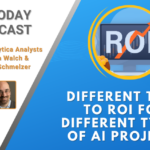
Depending on the type of AI project that you do, it can have different lengths to see ROI. In this episode of the AI Today podcast hosts Kathleen Walch and Ron Schmelzer discuss the different lengths of time to ROI for different types of AI projects.
Augmented Intelligence is where machines and humans work together to help assist the human to be better at tasks.
AI Today Podcast: When to do Automation Versus AI

We often get asked what projects are appropriate for AI versus other forms of technology. So, we thought it was a great topic for a podcast. In this episode of the AI Today podcast hosts Kathleen Walch and Ron Schmelzer go over when to do automation versus AI.
Automation is using technology to perform repetitive tasks.
Continue reading AI Today Podcast: When to do Automation Versus AI at Cognilytica.
AI Today Podcast: AI in Pharma – Interview with Xiong (Sean) Liu, Novartis

AI is impacting very about every single industry and pharma is no exception. AI has tremendous potential in streamlining processes, optimizing drug discovery, and enhancing patient care in ways we’ve never seen before. In this episode of the AI Today podcast we have an insightful conversation with Xiong (Sean) Liu. He is the Director of Data Science and AI at Novartis.
AI Today Podcast: AI Glossary Series – Proof-of-Concept, Pilot, Production

You may have heard the terms proof-of-concept, pilot, and production thrown around relating to various projects at your organization. But, do you know the difference between all of them?
And when running and AI project should you start with a proof-of-concept or pilot project?
In this episode of the AI Today podcast hosts Kathleen Walch and Ron Schmelzer define the terms Proof-of-Concept, Pilot, and Production.
AI Today Podcast: AI Glossary Series – Anonymization, General Data Protection Regulation (GDPR), Uncanny Valley

In this episode of the AI Today podcast hosts Kathleen Walch and Ron Schmelzer define the terms Anonymization, General Data Protection Regulation (GDPR), Uncanny Valley, explain how these terms relate to AI and why it’s important to know about them.
If you’re not familiar with the General Data Protection Regulation (GDPR) is a European Union regulation focused on data protection and privacy first published in 2016.
AI Today Podcast: AI Glossary Series – Hadoop, MapReduce

Hadoop and MapReduce changed the world of big data. And data is the heart of AI, so it should come as no surprise that talk about big data in the context of AI. In this episode of the AI Today podcast hosts Kathleen Walch and Ron Schmelzer define the terms Hadoop, MapReduce, explain how these terms relate to AI and why it’s important to know about them.
Continue reading AI Today Podcast: AI Glossary Series – Hadoop, MapReduce at Cognilytica.
AI Today Podcast: AI Glossary Series – Algorithmic Discrimination, Governance, Pseudo AI
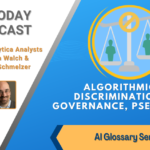
In this episode of the AI Today podcast hosts Kathleen Walch and Ron Schmelzer define the terms Algorithmic Discrimination, Governance, Pseudo AI. Why are these terms vital in the AI landscape? And what do they mean?
Algorithmic discrimination
If you’re unfamiliar with the term algorithmic discrimination, it’s when bias in data used to train the algorithm can result in unfair decisions and results.
AI Today Podcast: AI Glossary Series – Malicious AI, Adversarial Attack, DeepFake

With the use of malicious AI on the rise, it’s hard to believe anything you read, hear, or see these days. In this episode of the AI Today podcast hosts Kathleen Walch and Ron Schmelzer define the terms Malicious AI, Adversarial Attack, DeepFake, explain how these terms relate to AI and why it’s important to know about them.
AI Today Podcast: CPMAI in the Real World, Interview with Dr. Philipp Schlenkhoff, CPMAI

Companies of all sizes in just about every single industry across the globe are looking to see how Artificial Intelligence (AI), machine learning (ML), and cognitive technology projects can provide a competitive edge, provide efficiencies, and improve ROI in today’s competitive landscape. As a result, this creates tremendous opportunity in the field of AI and for professionals who are CPMAI certified.
AI Today Podcast: Generative AI Series: Implementing Generative AI in production

Generative AI continues to be a hot topic discussion. People are using generative AI to help with many things, but just like with any technology it’s important to understand it’s a tool. In this episode of the AI Today podcast hosts Kathleen Walch and Ron Schmelzer discuss how to actually put Generative AI into the apps and products that you use including how to use it in production.
AI Today Podcast: AI Glossary Series- methodology, waterfall, Agile, CRISP-DM, Cognitive Project Management for AI (CPMAI)

In this episode of the AI Today podcast hosts Kathleen Walch and Ron Schmelzer define the terms Methodology, Waterfall, Agile, CRISP-DM, Cognitive Project Management for AI (CPMAI).
In this episde we explain how these terms relate to AI and why it’s important to know about them. Just about every single industry is using AI in some shape or form to help streamline and improve processes, increase productivity, gain a competitive edge, and stand out from others.
AI Today Podcast: Discussing the AI-Native Future: Interview with Gi Jung Kim, CEO & Co-Founder, CoxWave

Conversation is a natural form of communication for humans. Therefore, it should come as no surprise that the future will be AI-Native. But what does an “AI-native future” mean? In this episode of the AI Today podcast hosts Kathleen Walch and Ron Schmelzer interview Gi Jung Kim who is the CEO and co-founder of Coxwave.
AI Today Podcast: Generative AI Series: How to Avoid Getting Screwed with Generative AI

It’s hard to have a conversation about AI these days without the topic of Generative AI coming up. People are using gen AI to help with many things from text creation, image creation, and more. But, just like with any technology, there can be a downside as well.
However, what happens when we become too reliant on technology?
AI Today Podcast: AI in Architecture, Engineering, and Construction (AEC): Interview with Sergio Villanueva-Meyer, CPMAI

Companies of all sizes in just about every single industry from healthcare to finance to construction are looking to see how Artificial Intelligence (AI), machine learning (ML), and cognitive technology projects can provide a competitive edge. They want to be able to have technology provide efficiencies, and improve ROI in today’s competitive landscape. As a result, this creates tremendous opportunity for people looking to manage these types of projects.
AI Today Podcast: Trustworthy AI Series: Explainable & Interpretable AI

AI systems have the potential to provide great value. But also the potential to cause great harm. Knowing how to build or use AI systems is simply not going to be enough. You need to know how to build, use, and interact with these systems ethically and responsibly. Additionally you need to understand that Trustworthy AI is a spectrum that addresses various aspects relating to societal, systemic, and technical areas.
AI Today Podcast: AI Glossary Series – Black Box, Explainable AI (XAI), Interpretable AI

In this episode of the AI Today podcast hosts Kathleen Walch and Ron Schmelzer define the terms Black Box, Explainable AI (XAI), Interpretable AI, explain how these terms relate to AI and why it’s important to know about them.
📖 Learn about Black Box Technology 📦: Kathleen and Ron will unravel the mystery behind Black Box technology, explaining its connection to deep learning in the realm of artificial intelligence.
AI Today Podcast: Lessons Learned from AI Project Management: Interview with Jonelle Martinez

Companies of all sizes in just about every single industry are looking to see how Artificial Intelligence (AI), machine learning (ML), and cognitive technology projects can be used. They want to see how AI can provide a competitive edge, provide efficiencies, and improve ROI in today’s competitive landscape. As a result, this creates tremendous opportunity for people looking to manage these types of projects.
AI Today Podcast: Generative AI Series: The Drawbacks and Challenges of Generative AI
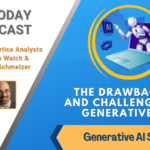
It’s hard to have a conversation about AI these days without the topic of Generative AI coming up. People are using gen AI to help with many things such as generating content and images. However, just like with any technology there can be a downside as well. In this podcast episode hosts Kathleen Walch and Ron Schmelzer take a deeper look at ge AI.
AI Today Podcast: AI Glossary Series- Data Engineer, Data Engineering, Data Pipeline, Data Wrangling, Data feed, Data Governance, Data integration

In this episode of the AI Today podcast hosts Kathleen Walch and Ron Schmelzer define terms related to data. Because, data is the heart of AI. So it’s important to understand the role data plays in AI and ML projects. In this episode we go over the terms data engineer, data engineering, and data pipeline.
AI Today Podcast: Trustworthy AI Series: Governed AI

AI systems have the potential to provide great value. But, also the potential to cause great harm. Knowing how to build or use AI systems is simply not going to be enough. You need to know how to build, use, and interact with these systems ethically and responsibly. Additionally you need to understand that Trustworthy AI is a spectrum.
Continue reading AI Today Podcast: Trustworthy AI Series: Governed AI at Cognilytica.
AI Today Podcast: AI Glossary Series – Data Science, Data Scientist, Citizen Data Scientist / Citizen Developer, Data Custodian
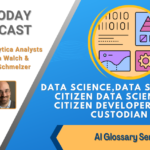
In this episode of the AI Today podcast hosts Kathleen Walch and Ron Schmelzer delve into the diverse roles and concepts within the data universe: Data Science, Data Scientist, Citizen Data Scientist/Citizen Developer, and Data Custodian.
Data Science isn’t just a buzzword; it’s the art of transforming raw data into meaningful insights. And Data Scientists may be the sexiest job of the 21st Century, but do you know what they do?
AI Today Podcast: Generative AI Series: Foundation Models, Fine-Tuning, and Domain-Specific LLMs

It’s hard to have a conversation about AI these days without the topic of Generative AI coming up. People are using generative AI and LLMs to help with many things. But what do these technologies mean at an organizational level? And how do you apply this technology for your organization?
In this podcast episode hosts Kathleen Walch and Ron Schmelzer take a deeper look at generative AI.
AI Today Podcast: AI Glossary Series – Analytics, Data Visualization, Descriptive Analytics, Diagnostic Analytics, Predictive Analytics, Proscriptive / Projective Analytics

Analytics are statistical and other methods to gain informational insight from data. Since data is the heart of AI, it makes sense analytics should be understood. In this episode of the AI Today podcast hosts Kathleen Walch and Ron Schmelzer define the terms Analytics, Data Visualization, Descriptive Analytics, Diagnostic Analytics, Predictive Analytics, Proscriptive / Projective Analytics.
AI Today Podcast: Trustworthy AI Series: AI System Transparency

AI systems have the potential to provide great value, but also the potential to cause great harm. Knowing how to build or use AI systems is simply not going to be enough. You need to know how to build, use, and interact with these systems ethically and responsibly. Additionally you need to understand that Trustworthy AI is a spectrum that addresses various aspects relating to societal, systemic, and technical areas.
Continue reading AI Today Podcast: Trustworthy AI Series: AI System Transparency at Cognilytica.
AI Today Podcast: Lessons Learned from AI Project Management: Interview with Jeff Eason, Salt Lake County Health Department

Companies of all sizes in just about every single industry are looking to see how Artificial Intelligence (AI), machine learning (ML), and cognitive technology projects can provide a competitive edge, provide efficiencies, and improve ROI in today’s competitive landscape. As a result, this creates tremendous opportunity for people looking to manage these types of projects and there is a significant and growing demand for skilled AI project managers across the whole range of AI capabilities.
AI Today Podcast: Generative AI Series: Diffusion Models and Image Generation

It’s hard to have a conversation about AI these days without the topic of Generative AI coming up. People are using generative AI to help with many things, including creating images. But what do these technologies mean at an organizational level? And how do you apply this technology for your organization? In this podcast episode hosts Kathleen Walch and Ron Schmelzer take a deeper look at generative AI for images, in particular Diffusion Models and Image Generation.
AI Today Podcast: AI Glossary Series – Data Warehouse, Data Lake, Extract Transform Load (ETL)

In this episode of the AI Today podcast hosts Kathleen Walch and Ron Schmelzer define the terms Data, Dataset, Big Data, DIKUW Pyramid, explain how these terms relate to AI and why it’s important to know about them.
Show Notes:
- FREE Intro to CPMAI mini course
- CPMAI Training and Certification
- AI Glossary
- AI Glossary Series – DevOps, Machine Learning Operations (ML Ops)
- AI Glossary Series – Automated Machine Learning (AutoML)
- AI Glossary Series – Data Preparation, Data Cleaning, Data Splitting, Data Multiplication, Data Transformation
- AI Glossary Series – Data Augmentation, Data Labeling, Bounding box, Sensor fusion
- AI Glossary Series – Data, Dataset, Big Data, DIKUW Pyramid
AI Today Podcast: Trustworthy AI Series: Responsible AI
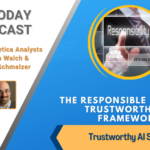
AI systems have the potential to provide great value, but also the potential to cause great harm. Knowing how to build or use AI systems is simply not going to be enough. You need to know how to build, use, and interact with these systems ethically and responsibly. Additionally you need to understand that Trustworthy AI is a spectrum that addresses various aspects relating to societal, systemic, and technical areas.
Continue reading AI Today Podcast: Trustworthy AI Series: Responsible AI at Cognilytica.
AI Today Podcast: AI Glossary Series – Structured Data, Unstructured Data, Semi-structured Data

In this episode of the AI Today podcast hosts Kathleen Walch and Ron Schmelzer define the terms Data, Dataset, Big Data, DIKUW Pyramid, explain how these terms relate to AI and why it’s important to know about them.
Show Notes:
- FREE Intro to CPMAI mini course
- CPMAI Training and Certification
- AI Glossary
- AI Glossary Series – DevOps, Machine Learning Operations (ML Ops)
- AI Glossary Series – Automated Machine Learning (AutoML)
- AI Glossary Series – Data Preparation, Data Cleaning, Data Splitting, Data Multiplication, Data Transformation
- AI Glossary Series – Data Augmentation, Data Labeling, Bounding box, Sensor fusion
- AI Glossary Series – Data, Dataset, Big Data, DIKUW Pyramid
AI Today Podcast: Generative AI Series: Generative AI & Large Language Models (LLMs) – How Do They Work?

It’s hard to have a conversation about AI these days without the topics of Generative AI and Large Language Models (LLMs) coming up. But what do these technologies mean at an organizational level? And how do you apply this technology for your organization? In this podcast episode hosts Kathleen Walch and Ron Schmelzer take a deeper look at what generative AI, Transformer Models, and LLMs are.
AI Today Podcast: AI Glossary Series – V’s of Big Data, Data Volume, Exabyte / Petabyte / Yottabyte / Zettabyte, Data Variety, Data Velocity, Data Veracity

In this episode of the AI Today podcast hosts Kathleen Walch and Ron Schmelzer define the terms V’s of Big Data, Data Volume, Exabyte / Petabyte / Yottabyte / Zettabyte, Data Variety, Data Velocity, Data Veracity, explain how these terms relate to AI and why it’s important to know about them.
Show Notes:
- FREE Intro to CPMAI mini course
- CPMAI Training and Certification
- AI Glossary
- AI Glossary Series – DevOps, Machine Learning Operations (ML Ops)
- AI Glossary Series – Automated Machine Learning (AutoML)
- AI Glossary Series – Data Preparation, Data Cleaning, Data Splitting, Data Multiplication, Data Transformation
- AI Glossary Series – Data Augmentation, Data Labeling, Bounding box, Sensor fusion
- AI Glossary Series – Data, Dataset, Big Data, DIKUW Pyramid
AI Today Podcast: Trustworthy AI Series: Ethical AI
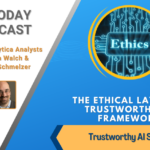
AI systems have the potential to provide great value, but also the potential to cause great harm. Knowing how to build or use AI systems is simply not going to be enough. You need to know how to build, use, and interact with these systems ethically and responsibly. Additionally you need to understand that Trustworthy AI is a spectrum that addresses various aspects relating to societal, systemic, and technical areas.
Continue reading AI Today Podcast: Trustworthy AI Series: Ethical AI at Cognilytica.
AI Today Podcast: AI Glossary Series – Data, Dataset, Big Data, DIKUW Pyramid
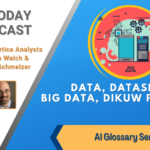
Data is the heart of AI. So, of course we need to have a podcast about data! In this episode of the AI Today podcast hosts Kathleen Walch and Ron Schmelzer define the terms Data, Dataset, Big Data, DIKUW Pyramid.
Data is the basic unit of discrete values that convey meaning, facts, quantities, or other units that computers operate on for further processing, interpretation, and analysis.
AI Today Podcast: Applying CPMAI in the Real World – Interview with Chuck LaBarre, ENI

It’s one thing for us to talk about the Cognitive Project Management for AI (CPMAI) Methodology and the benefits it can bring to managers running AI and advanced data projects, but hearing directly how individuals are learning from and are applying the CPMAI Methodology can be incredibly valuable. In this episode of the AI Today podcast hosts Kathleen Walch and Ron Schmelzer interview Chuck LaBarre, who is Chief Information Officer at ENI and is also CPMAI certified.
AI Today Podcast: AI Glossary Series – Data Augmentation, Data Labeling, Bounding box, Sensor fusion

Data is critical to making AI and machine learning work. In this episode of the AI Today podcast hosts Kathleen Walch and Ron Schmelzer define the terms Data Augmentation, Data Labeling, Bounding box, Sensor fusion.
Data Augmentation are the techniques used to enhance existing data through the use of additional data, manipulations on existing data, or combinations of data in various ways.
AI Today Podcast: Trustworthy AI Series: The Layers of Trustworthy AI

AI systems have the potential to provide great value, but also the potential to cause great harm. Knowing how to build or use AI systems is simply not going to be enough. You need to know how to build, use, and interact with these systems ethically and responsibly. Additionally you need to understand that Trustworthy AI is a spectrum that addresses various aspects relating to societal, systemic, and technical areas.
AI Today Podcast: AI Glossary Series – Data Preparation, Data Cleaning, Data Splitting, Data Multiplication, Data Transformation
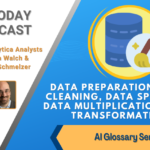
Data is the heart of AI. So, therefore doing things associated with your data is going to be critical for AI projects. This includes Data Preparation, Data Cleaning, Data Splitting, Data Multiplication, and Data Transformation.
In this episode of the AI Today podcast hosts Kathleen Walch and Ron Schmelzer define the terms above and explain why they are important for AI projects.
AI Today Podcast: Trustworthy AI Series: Why are trustworthy, ethical and responsible AI systems necessary?

For anyone who has used or interacted with an AI system you know that trust is required for AI systems if you want them to deliver any meaningful benefit. And once trust is lost, it’s almost impossible to gain back. Therefore, making Trustworthy, ethical & responsible AI a reality is not just a policy statement or a press release.
AI Today Podcast: AI Glossary Series – Robotic Process Automation (RPA), Attended bots, Unattended bots, Low Code, No Code

In this episode of the AI Today podcast hosts Kathleen Walch and Ron Schmelzer define the terms Robotic Process Automation (RPA), Attended bots, Unattended bots, Low Code, No Code, explain how these terms relate to AI and why it’s important to know about them.
Show Notes:
- FREE Intro to CPMAI mini course
- CPMAI Training and Certification
- AI Glossary
- AI Glossary Series – DevOps, Machine Learning Operations (ML Ops)
- AI Glossary Series – Automated Machine Learning (AutoML)
- AI Today Podcast: Roadmap Series: Getting Started on the Automation to Intelligence Journey
- AI Today Podcast Roadmap Series: From Automation to Intelligence – What should we automate and why
- AI Today Podcast: Automation to Intelligence Roadmap Series – What is a Business Process?
AI Today Podcast: AI Glossary Series – Automation, Robot, Robotics, Collaborative Robot (Cobot)

In this episode of the AI Today podcast hosts Kathleen Walch and Ron Schmelzer define the terms Automation, Robot, Robotics, Collaborative Robot (Cobot), explain how these terms relate to AI and why it’s important to know about them.
Show Notes:
- FREE Intro to CPMAI mini course
- CPMAI Training and Certification
- AI Glossary
- AI Glossary Series – DevOps, Machine Learning Operations (ML Ops)
- AI Glossary Series – Automated Machine Learning (AutoML)
- AI Today Podcast: Roadmap Series: Getting Started on the Automation to Intelligence Journey
- AI Today Podcast Roadmap Series: From Automation to Intelligence – What should we automate and why
- AI Today Podcast: Automation to Intelligence Roadmap Series – What is a Business Process?
AI Today Podcast: How AI is Transforming Insurance, Interview with Connor Atchison, Wisedocs

AI is proving transformational in every industry, including long established industries, and insurance is no exception. AI is able to optimize underwriting processes, enable more personalized insurance offerings, enhance the overall customer experience, as well as help with process improvements.
In this episode of the AI Today podcast hosts Kathleen Walch and Ron Schmelzer interview Connor Atchison who is the CEO of Wisedocs, a medical record review machine learning software for insurance carriers, healthcare providers, laws firms, and TPAs.
AI Today Podcast: AI Glossary Series – Data Science Notebooks, Jupyter, Colab

In this episode of the AI Today podcast hosts Kathleen Walch and Ron Schmelzer define the terms Data Science Notebooks, Jupyter, Colab, explain how these terms relate to AI and why it’s important to know about them.
Show Notes:
- FREE Intro to CPMAI mini course
- CPMAI Training and Certification
- AI Glossary
- AI Glossary Series – Data Drift, Model Drift, Model Retraining
- Glossary Series: (Artificial) Neural Networks, Node (Neuron), Layer
- Glossary Series – Machine Learning Development Languages: Python, R, Julia, Scala
AI Today Podcast: AI Glossary Series – Automated Machine Learning (AutoML)
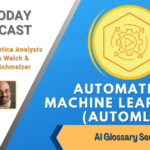
Many organizations want to do AI, but the technical skills needed can present a challenge. Not all organizations have data scientists on hand. Yet, many organizations still want to benefits of AI. In recent years there have been tools and platforms created to help automate many of the aspects of building and developing ML models that previously required very specialized skills and talent.
AI Today Podcast: AI Glossary Series – Machine Learning Tools: Keras, PyTorch, Scikit Learn, TensorFlow, Apache Spark, Kaggle

In this episode of the AI Today podcast hosts Kathleen Walch and Ron Schmelzer define the terms Machine Learning Tools: Keras, PyTorch, Scikit Learn, TensorFlow, Apache Spark, Kaggle, explain how these terms relate to AI and why it’s important to know about them.
Show Notes:
- FREE Intro to CPMAI mini course
- CPMAI Training and Certification
- AI Glossary
- Glossary Series: (Artificial) Neural Networks, Node (Neuron), Layer
- Glossary Series: Bias, Weight, Activation Function, Convergence, ReLU
- Glossary Series: Perceptron
- Glossary Series: Hidden Layer, Deep Learning
- Glossary Series: Loss Function, Cost Function & Gradient Descent
- Glossary Series: Backpropagation, Learning Rate, Optimizer
- Glossary Series: Feed-Forward Neural Network
- AI Glossary Series – Machine Learning, Algorithm, Model
AI Today Podcast: AI Glossary Series – Machine Learning Development Languages: Python, R, Julia, Scala
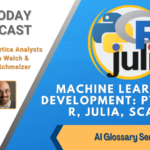
In this episode of the AI Today podcast hosts Kathleen Walch and Ron Schmelzer define the terms Machine Learning Development Languages: Python, R, Julia, Scala, explain how these terms relate to AI and why it’s important to know about them.
Show Notes:
- FREE Intro to CPMAI mini course
- CPMAI Training and Certification
- AI Glossary
- Glossary Series: (Artificial) Neural Networks, Node (Neuron), Layer
- Glossary Series: Hidden Layer, Deep Learning
- Glossary Series: Loss Function, Cost Function & Gradient Descent
- Glossary Series: Backpropagation, Learning Rate, Optimizer
- Glossary Series: Feed-Forward Neural Network
- AI Glossary Series – Machine Learning, Algorithm, Model
- AI Glossary Series – Model Tuning and Hyperparameter
- AI Glossary Series: Overfitting, Underfitting, Bias, Variance, Bias/Variance Tradeoff
AI Today Podcast: AI Glossary Series – DevOps, Machine Learning Operations (ML Ops)

In this episode of the AI Today podcast hosts Kathleen Walch and Ron Schmelzer define the terms DevOps, Machine Learning Operations (ML Ops), explain how these terms relate to AI and why it’s important to know about them.
Show Notes:
- FREE Intro to CPMAI mini course
- CPMAI Training and Certification
- AI Glossary
- AI Glossary Series – Data Drift, Model Drift, Model Retraining
- Glossary Series: (Artificial) Neural Networks, Node (Neuron), Layer
AI Today Podcast: AI Glossary Series – Data Drift, Model Drift, Model Retraining

Data is the heart of AI. Which is why having good, clean data is so critical. But what happens when your data changes of over? What does that do to your models? In this episode of the AI Today podcast hosts Kathleen Walch and Ron Schmelzer discuss the terms Data Drift, Model Drift, and Model Retraining.
AI Today Podcast: AI Glossary Series – Cloud ML, On-Premise, Edge Device, Machine Learning -as-a-Service (MLaaS)
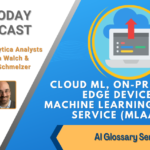
In this episode of the AI Today podcast hosts Kathleen Walch and Ron Schmelzer define the terms Cloud ML, On-Premise, Edge Device, Machine Learning -as-a-Service (MLaaS), explain how these terms relates to AI and why it’s important to know about them.
Show Notes:
- FREE Intro to CPMAI mini course
- CPMAI Training and Certification
- AI Glossary
- Glossary Series: Training Data, Epoch, Batch, Learning Curve
- Glossary Series: (Artificial) Neural Networks, Node (Neuron), Layer
- Glossary Series: Bias, Weight, Activation Function, Convergence, ReLU
- Glossary Series: Perceptron
- Glossary Series: Hidden Layer, Deep Learning
- Glossary Series: Loss Function, Cost Function & Gradient Descent
- Glossary Series: Backpropagation, Learning Rate, Optimizer
- Glossary Series: Feed-Forward Neural Network
- Glossary Series: OpenAI, GPT, DALL-E, Stable Diffusion
- Glossary Series: Natural Language Processing (NLP), NLU, NLG, Speech-to-Text, TTS, Speech Recognition
- AI Glossary Series – Machine Learning, Algorithm, Model
- AI Today Podcast: AI Glossary Series – Batch Prediction, Microservice, Real-time Prediction, Stream Learning, Cold-Path Analytics, Hot-Path Analytics
This episode is sponsored by Algolia:
Algolia Powers Discovery.
AI Today Podcast: AI Glossary Series – Batch Prediction, Microservice, Real-time Prediction, Stream Learning, Cold-Path Analytics, Hot-Path Analytics

In this episode of the AI Today podcast hosts Kathleen Walch and Ron Schmelzer define the terms Batch Prediction, Microservice, Real-time Prediction, Stream Learning, Cold-Path Analytics, and Hot-Path Analytics, explain how these terms relate to AI and why it’s important to know about them.
Show Notes:
- FREE Intro to CPMAI mini course
- CPMAI Training and Certification
- AI Glossary
- Glossary Series: Training Data, Epoch, Batch, Learning Curve
- Glossary Series: (Artificial) Neural Networks, Node (Neuron), Layer
- Glossary Series: Bias, Weight, Activation Function, Convergence, ReLU
- Glossary Series: Perceptron
- Glossary Series: Hidden Layer, Deep Learning
- Glossary Series: Loss Function, Cost Function & Gradient Descent
- Glossary Series: Backpropagation, Learning Rate, Optimizer
- Glossary Series: Feed-Forward Neural Network
- Glossary Series: OpenAI, GPT, DALL-E, Stable Diffusion
- Glossary Series: Natural Language Processing (NLP), NLU, NLG, Speech-to-Text, TTS, Speech Recognition
- AI Glossary Series – Machine Learning, Algorithm, Model
- AI Glossary Series – Model Tuning and Hyperparameter
- AI Glossary Series: Overfitting, Underfitting, Bias, Variance, Bias/Variance Tradeoff
- AI Glossary Series: Operationalization
- Interview with Alex Measure, BLS
This episode is sponsored by Algolia:
Algolia Powers Discovery.
AI Today Podcast: AI Glossary Series – Operationalization

In this episode of the AI Today podcast hosts Kathleen Walch and Ron Schmelzer define the term Operationalization, explain how this term relates to AI and why it’s important to know about them.
Show Notes:
- FREE Intro to CPMAI mini course
- CPMAI Training and Certification
- AI Glossary
- Glossary Series: Training Data, Epoch, Batch, Learning Curve
- Glossary Series: (Artificial) Neural Networks, Node (Neuron), Layer
- Glossary Series: Bias, Weight, Activation Function, Convergence, ReLU
- Glossary Series: Perceptron
- Glossary Series: Hidden Layer, Deep Learning
- Glossary Series: Loss Function, Cost Function & Gradient Descent
- Glossary Series: Backpropagation, Learning Rate, Optimizer
- Glossary Series: Feed-Forward Neural Network
- Glossary Series: OpenAI, GPT, DALL-E, Stable Diffusion
- Glossary Series: Natural Language Processing (NLP), NLU, NLG, Speech-to-Text, TTS, Speech Recognition
- AI Glossary Series – Machine Learning, Algorithm, Model
- For more information on visit Algolia website
- FREE CPMAI Intro Course
- Glossary Series: Natural Language Processing (NLP), NLU, NLG, Speech-to-Text, TTS, Speech Recognition
- Glossary Series: Tokenization, Vectorization
This episode is sponsored by Algolia:
Algolia Powers Discovery.
Continue reading AI Today Podcast: AI Glossary Series – Operationalization at Cognilytica.
AI Today Podcast: AI Glossary – Digital Transformation, Return on Investment (ROI), Key Performance Indicator (KPI)
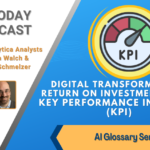
In this episode of the AI Today podcast hosts Kathleen Walch and Ron Schmelzer define the terms Digital Transformation, Return on Investment (ROI), and Key Performance Indicator (KPI), explain how these terms relate to AI and why it’s important to know about them.
Show Notes:
- FREE Intro to CPMAI mini course
- CPMAI Training and Certification
- AI Glossary
- For more information on visit Algolia website
- Glossary Series: Natural Language Processing (NLP), NLU, NLG, Speech-to-Text, TTS, Speech Recognition
- Glossary Series: Tokenization, Vectorization
This episode is sponsored by Algolia:
Algolia Powers Discovery.
AI Today Podcast: Revolutionizing AI-Driven E-commerce Strategy, Interview with Sean Mullaney, Algolia

In this episode of the AI Today Podcast hosts Kathleen Walch and Ron Schmelzer get to talk to Sean Mullaney who is the Chief Technology Officer (CTO) at Algolia. We discuss how AI is revolutionizing e-commerce. Sean shares how vectorization is being used to enhance the relevance and personalization of search results for e-commerce businesses.
AI Today Podcast: AI Glossary Series – Confusion Matrix, Accuracy, Precision, F1, Recall, Sensitivity, Specificity, Receiver-Operating Characteristic (ROC) Curve
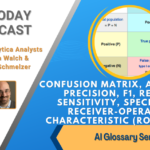
In this episode of the AI Today podcast hosts Kathleen Walch and Ron Schmelzer define the terms Confusion Matrix, Accuracy, Precision, F1, Recall, Sensitivity, Specificity, Receiver-Operating Characteristic (ROC) Curve, explain how these terms relate to AI and why it’s important to know about them.
Show Notes:
- FREE Intro to CPMAI mini course
- CPMAI Training and Certification
- AI Glossary
- Glossary Series: Training Data, Epoch, Batch, Learning Curve
- Glossary Series: (Artificial) Neural Networks, Node (Neuron), Layer
- Glossary Series: Bias, Weight, Activation Function, Convergence, ReLU
- Glossary Series: Perceptron
- Glossary Series: Hidden Layer, Deep Learning
- Glossary Series: Loss Function, Cost Function & Gradient Descent
- Glossary Series: Backpropagation, Learning Rate, Optimizer
- Glossary Series: Feed-Forward Neural Network
- Glossary Series: OpenAI, GPT, DALL-E, Stable Diffusion
- Glossary Series: Natural Language Processing (NLP), NLU, NLG, Speech-to-Text, TTS, Speech Recognition
- AI Glossary Series – Machine Learning, Algorithm, Model
- AI Glossary Series – Model Tuning and Hyperparameter
- AI Glossary Series: Overfitting, Underfitting, Bias, Variance, Bias/Variance Tradeoff
- Glossary Series: Classification & Classifier, Binary Classifier, Multiclass Classifier, Decision Boundary
AI Today Podcast: AI Glossary Series – Model Validation, Validation Data, Test Data, and Cross-Validation

In this episode of the AI Today podcast hosts Kathleen Walch and Ron Schmelzer define the terms Model Validation, Validation Data, Test Data, Cross-Validation, explain how these terms relate to AI and why it’s important to know about them.
Want to dive deeper into an understanding of artificial intelligence, machine learning, or big data concepts?
AI Today Podcast: AI Glossary Series – Model Tuning and Hyperparameter

In this episode of the AI Today podcast hosts Kathleen Walch and Ron Schmelzer define the terms Model Tuning and Hyperparameter, explain how these terms relate to AI and why it’s important to know about them.
Want to dive deeper into an understanding of artificial intelligence, machine learning, or big data concepts? Want to learn how to apply AI and data using hands-on approaches and the latest technologies?
AI Today Podcast: AI Glossary Series – OpenAI, GPT, DALL-E, Stable Diffusion

In this episode of the AI Today podcast hosts Kathleen Walch and Ron Schmelzer discuss and define at a high level the terms OpenAI, GPT, DALL-E, and Stable Diffusion, and share why you should know these terms and how they relate to the overall AI landscape.
Want to dive deeper into an understanding of artificial intelligence, machine learning, or big data concepts?
AI Today Podcast: Digitizing the Mind: Interview with Dmitry Shapiro, YouAi

Large Language Models (LLMs) are all the rage these days. It’s hard to have a conversation about AI without ChatGPT, Google Bard, or LLMs being brought up. However, what if these LLMs could learn more about you individually and provide a much more hyperpersonalized experience and responses?! In this episode of the AI Today podcast hosts Kathleen Walch and Ron Schmelzer interview Dmitry Shapiro who is CEO of YouAi.
AI Today Podcast – AI Glossary Series: Transformer Networks

Transformer models have proven to be especially powerful for Natural Language Processing applications and image generation, and have been popularized by models such as GPT-3, Stable diffusion, and BERT. In this episode of the AI Today podcast hosts Kathleen Walch and Ron Schmelzer define the term Transformer Networks, explain how these terms relate to AI and why it’s important to know about them.
Continue reading AI Today Podcast – AI Glossary Series: Transformer Networks at Cognilytica.
AI Today Podcast: AI Glossary Series – Boltzmann Machine

In this episode of the AI Today podcast hosts Kathleen Walch and Ron Schmelzer define the term Boltzmann Machine, explain how these terms relate to AI and why it’s important to know about them.
Want to dive deeper into an understanding of artificial intelligence, machine learning, or big data concepts? Want to learn how to apply AI and data using hands-on approaches and the latest technologies?
Continue reading AI Today Podcast: AI Glossary Series – Boltzmann Machine at Cognilytica.
AI Today Podcast: AI Glossary Series – Encoder-Decoder, AutoEncoder, and Generative Adversarial Network (GAN)

In this episode of the AI Today podcast hosts Kathleen Walch and Ron Schmelzer define the terms Decoder, AutoEncoder, Generative Adversarial Network (GAN), explain how these terms relate to AI and why it’s important to know about them.
Want to dive deeper into an understanding of artificial intelligence, machine learning, or big data concepts?
AI Today Podcast: AI Glossary Series – Convolutional Neural Network (CNN)

In this episode of the AI Today podcast hosts Kathleen Walch and Ron Schmelzer define the term Convolutional Neural Network (CNN), explain how these terms relate to AI and why it’s important to know about them.
Want to dive deeper into an understanding of artificial intelligence, machine learning, or big data concepts? Want to learn how to apply AI and data using hands-on approaches and the latest technologies?
AI Today Podcast: AI Glossary Series – Recurrent Neural Networks (RNN) and Long-Short Term Memory (LSTM)
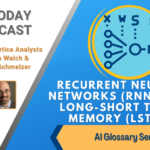
In this episode of the AI Today podcast hosts Kathleen Walch and Ron Schmelzer define the terms Recurrent Neural Networks (RNN) and Long-Short Term Memory (LSTM), explain how these terms relate to AI and why it’s important to know about them.
Want to dive deeper into an understanding of artificial intelligence, machine learning, or big data concepts?
AI Today Podcast: AI Glossary Series – Feed-Forward Neural Network

Usually used as a simple example for how deep learning neural networks work, a feed-forward neural network is the most basic, “vanilla” general kind of neural network. In this episode of the AI Today podcast hosts Kathleen Walch and Ron Schmelzer define the term Feed-Forward Neural Network, explain how these terms relate to AI and why it’s important to know about them.
Continue reading AI Today Podcast: AI Glossary Series – Feed-Forward Neural Network at Cognilytica.
AI Today Podcast: AI Glossary Series – “Ground Truth” Data and Synthetic Data

In order for machine learning systems to work, they need to be trained on data. But there are different types of data and depending on the situation you may want to use one type of data over another, or a combination of different types. In this episode of the AI Today podcast hosts Kathleen Walch and Ron Schmelzer define the terms “Ground Truth” Data and Synthetic Data, explain how these terms relate to AI and why it’s important to know about them.
AI Today Podcast: AI Glossary Series – Pre-Trained Model and Transfer Learning
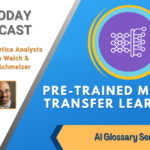
In this episode of the AI Today podcast hosts Kathleen Walch and Ron Schmelzer define the terms Pre-Trained Model and Transfer Learning, explain how these terms relate to AI and why it’s important to know about them.
Want to dive deeper into an understanding of artificial intelligence, machine learning, or big data concepts?
AI Today Podcast: Why Data Storage Matters When it Comes to AI: Interview with Justin Emerson, Pure Storage

As AI applications become more complex and data-intensive, the need for scalable and efficient storage solutions becomes increasingly important. AI models require vast amounts of data to be processed, and as the size and complexity of these models continue to grow, so does the need for more storage. Storage considerations are critical for both the training and the deployment of AI models.
AI Today Podcast: AI Glossary Series – CPU, GPU, TPU, and Federated Learning

In this episode of the AI Today podcast hosts Kathleen Walch and Ron Schmelzer define the terms CPU, GPU, TPU, and Federated Learning, explain how these terms relate to AI and why it’s important to know about them.
Want to dive deeper into an understanding of artificial intelligence, machine learning, or big data concepts?
AI Today Podcast: AI Glossary Series – Tokenization and Vectorization

In this episode of the AI Today podcast hosts Kathleen Walch and Ron Schmelzer define the terms Tokenization and Vectorization, explain how these terms relates to AI and why it’s important to know about them.
Want to dive deeper into an understanding of artificial intelligence, machine learning, or big data concepts? Want to learn how to apply AI and data using hands-on approaches and the latest technologies?
AI Today Podcast: AI Glossary Series – Training Data, Epoch, Batch, Learning Curve
AI Today Podcast: AI Glossary Series – Backpropagation, Learning Rate, and Optimizer

Backpropagation was one of the innovations by Geoff Hinton that made deep learning networks a practical reality. But have you ever heard of that term before and know what it is at a high level? In this episode of the AI Today podcast hosts Kathleen Walch and Ron Schmelzer define the terms Backpropagation, Learning Rate, and Optimizer, explain how these terms relates to AI and why it’s important to know about them.
AI Today Podcast: AI Glossary Series – Loss Function, Cost Function and Gradient Descent

In this episode of the AI Today podcast hosts Kathleen Walch and Ron Schmelzer define the terms Loss Function, Cost Function and Gradient Descent, explain how these terms relates to AI and why it’s important to know about them.
Show Notes:
- FREE Intro to CPMAI mini course
- CPMAI Training and Certification
- AI Glossary
- Glossary Series: Artificial Intelligence
- Glossary Series: Artificial General Intelligence (AGI), Strong AI, Weak AI, Narrow AI
- Glossary Series: Heuristic & Brute-force Search
- AI Glossary Series – Machine Learning, Algorithm, Model
- Glossary Series: (Artificial) Neural Networks, Node (Neuron), Layer
- Glossary Series: Bias, Weight, Activation Function, Convergence, ReLU
- Glossary Series: Perceptron
- Glossary Series: Hidden Layer, Deep Learning
AI Today Podcast: AI Glossary Series- Hidden Layer and Deep Learning

Deep Learning is powering this current wave of AI interest. But do you really know what Deep Learning is? In this episode of the AI Today podcast hosts Kathleen Walch and Ron Schmelzer define the terms hidden layer and deep learning, explain how these terms relates to AI and why it’s important to know about them.
AI Today Podcast: AI Glossary Series – Perceptron

The Perceptron was the first artificial neuron. The theory of the perceptron was first published in 1943 by McCulloch & Pitts, and then developed in 1958 by Rosenblatt. So yes, this was developed in the early days of AI. In this episode of the AI Today podcast hosts Kathleen Walch and Ron Schmelzer define the term Perceptron and explain how the term relates to AI and why it’s important to know about it.
Continue reading AI Today Podcast: AI Glossary Series – Perceptron at Cognilytica.
AI Today Podcast: AI Glossary Series – Bias, Weight, Activation Function, Convergence, and ReLU

In this episode of the AI Today podcast hosts Kathleen Walch and Ron Schmelzer define the terms Bias, Weight, Activation Function, Convergence, and ReLU and explain how they relate to AI and why it’s important to know about them.
Show Notes:
- FREE Intro to CPMAI mini course
- CPMAI Training and Certification
- AI Glossary
- AI Glossary Series – Machine Learning, Algorithm, Model
- Glossary Series: Machine Learning Approaches: Supervised Learning, Unsupervised Learning, Reinforcement Learning
- Glossary Series: Dimension, Curse of Dimensionality, Dimensionality Reduction
- Glossary Series: Feature, Feature Engineering
- Glossary Series: (Artificial) Neural Networks, Node (Neuron), Layer
AI Today Podcast: AI Glossary Series – (Artificial) Neural Networks, Node (Neuron), Layer

If we can replicate neurons and how they are connected, can we replicate the behavior of our brains? In this episode of the AI Today podcast hosts Kathleen Walch and Ron Schmelzer define the terms (Artificial) Neural Networks, Node, and layer, and explain how they relate to AI and why it’s important to know about them.
AI Today Podcast: AI Glossary Series – Feature Reduction, Principal Component Analysis (PCA), and t-SNE

For a number of reasons, it can be important to reduce the number of variables or identified features in input training data so as to make training machine learning models faster and more accurate. But what are the techniques for doing this? In this episode of the AI Today podcast hosts Kathleen Walch and Ron Schmelzer define the terms Feature Reduction, Principal Component Analysis (PCA), and t-SNE, explain how they relate to AI and why it’s important to know about them.
AI Today Podcast: AI Glossary Series – Feature and Feature Engineering

For time-consuming parts of the machine learning workflow people often look for tricks and techniques to help speed up the process. In this episode of the AI Today podcast hosts Kathleen Walch and Ron Schmelzer define the terms feature and feature engineering, explain how they relate to AI and why it’s important to know about them.
AI Today Podcast: AI Glossary Series – Regression and Linear Regression

Regression is a statistical and mathematical technique to find the relationship between two or more variables. In this episode of the AI Today podcast hosts Kathleen Walch and Ron Schmelzer define the terms Regression and Linear Regression and explain how they relate to AI and why it’s important to know about them.
Show Notes:
- FREE Intro to CPMAI mini course
- CPMAI Training and Certification
- AI Glossary
- AI Glossary Series – Machine Learning, Algorithm, Model
- Glossary Series: Machine Learning Approaches: Supervised Learning, Unsupervised Learning, Reinforcement Learning
- Glossary Series: Classification & Classifier, Binary Classifier, Multiclass Classifier, Decision Boundary
- Glossary Series: Clustering, Cluster Analysis, K-Means, Gaussian Mixture Model
AI Today Podcast: AI Glossary Series- Clustering, Cluster Analysis, K-Means, Gaussian Mixture Model

The idea of grouping similar types of data together is the main idea behind clustering. Clustering supports the goals of Unsupervised Learning which is finding patterns in data without requiring labeled datasets. In this episode of the AI Today podcast hosts Kathleen Walch and Ron Schmelzer define the terms Clustering, Cluster Analysis, K-Means, and Gaussian Mixture Model, and explain how they relate to AI and why it’s important to know about them.
AI Today Podcast: AI Glossary Series – Deep Blue

In this episode of the AI Today podcast hosts Kathleen Walch and Ron Schmelzer define DeepBlue, including what it is and why it’s notable for AI.
Show Notes:
- FREE Intro to CPMAI mini course
- CPMAI Training and Certification
- AI Glossary
- AI Glossary Series – Symbolic Systems & Expert Systems
- AI Glossary Series: Cognitive Technology
Continue reading AI Today Podcast: AI Glossary Series – Deep Blue at Cognilytica.
AI Today Podcast: AI Glossary Series: Symbolic Systems & Expert Systems

Before this latest wave of AI where neural nets became the hottest algorithm of choice, an approach to machine learning that uses logic and constructs similar to the way that humans reason through problems called Symbolic Systems were actually the system of choice. Popularized in the late 1980s and early 1990s expert systems became the AI system of choice for organizations investing in cognitive technology.
AI Today Podcast: AI Glossary Series – Random Forest and Boosted Trees

Sometimes for reasons such as improving performance or robustness it makes sense to create multiple decision trees and average the results to solve problems related to overfitting. Or, it makes sense to boost certain decision trees. In this episode of the AI Today podcast hosts Kathleen Walch and Ron Schmelzer define the terms Random Forest and Boosted Trees, and explain how they relate to AI and why it’s important to know about them.
AI Today Podcast: AI Glossary Series – Ensemble Models

Sometimes for reasons such as improving performance or robustness it makes sense to combine the results of multiple different models trained on the same data. In this episode of the AI Today podcast hosts Kathleen Walch and Ron Schmelzer define the term Ensemble Models, and explain how it relates to AI and why it’s important to know about them.
Continue reading AI Today Podcast: AI Glossary Series – Ensemble Models at Cognilytica.
AI Today Podcast: AI Glossary Series – Decision Trees

There are many algorithms that can be used for classification and it’s important to at least know them at a high level. In this episode of the AI Today podcast hosts Kathleen Walch and Ron Schmelzer define the terms Support Vector Machine & Kernel Method, and explain how they relate to AI and why it’s important to know about them.
Continue reading AI Today Podcast: AI Glossary Series – Decision Trees at Cognilytica.
AI Today Podcast: AI Glossary Series – Support Vector Machine & Kernel Method

There are many algorithms that can be used for classification and it’s important to at least know them at a high level. In this episode of the AI Today podcast hosts Kathleen Walch and Ron Schmelzer define the terms Support Vector Machine & Kernel Method, and explain how they relate to AI and why it’s important to know about them.
AI Today Podcast: AI Glossary Series: K-Nearest Neighbor and Lazy Learning

There are many algorithms that can be used for classification and it’s important to at least know them at a high level. In this episode of the AI Today podcast hosts Kathleen Walch and Ron Schmelzer define the terms K-Nearest Neighbor and Lazy Learning, and explain how they relate to AI and why it’s important to know about them.
AI Today Podcast: AI Glossary Series – Bayes’ Theorem, Bayesian Classifier, Naive Bayes

Probabilities play a big part in AI and machine learning. After all, AI systems are Probabilistic systems that must learn what to do. In this episode of the AI Today podcast hosts Kathleen Walch and Ron Schmelzer define the terms Bayes’ Theorem, Bayesian Classifier, Naive Bayes, and explain how they relate to AI and why it’s important to know about them.
AI Today Podcast: AI Glossary Series – Classification & Classifier, Binary Classifier, Multiclass Classifier, Decision Boundary

Determining which categories or “classes” data belongs to in the core aspect of classification. In this episode of the AI Today podcast hosts Kathleen Walch and Ron Schmelzer define the terms Classification & Classifier, Binary Classifier, Multiclass Classifier, Decision Boundary, and explain how they relate to AI and why it’s important to know about them.
AI Today Podcast: How AI and Project Management Fit Together: Interview with Bill Raymond, Agile in Action Podcast
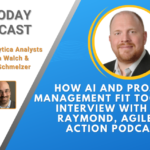
In this episode of the AI Today podcast hosts Kathleen Walch and Ron Schmelzer have a discussion with Bill Raymond who is the host of the Agile In Action podcast. We discuss why project managers should pay attention to AI, how the areas of Agile and AI are intersecting, and how artificial intelligence fits within the project management space both from running AI projects to also how AI will enhance the project manager’s role.
AI Today Podcast: AI Glossary Series: Overfitting, Underfitting, Bias, Variance, Bias/Variance Tradeoff

When it comes to building ML models, you want to make a model simple enough so that it can handle a wide range of real-world data on the one hand, but not too simple that it overgeneralizes or underfits the available data. In this episode of the AI Today podcast hosts Kathleen Walch and Ron Schmelzer define the terms Overfitting, Underfitting, Bias, Variance, and Bias/Variance Tradeoff, and explain how they relate to AI and why it’s important to know about them.
AI Today Podcast: AI Glossary Series – Dimension, Curse of Dimensionality, Dimensionality Reduction

In this episode of the AI Today podcast hosts Kathleen Walch and Ron Schmelzer define the terms Dimension, Curse of Dimensionality, Dimensionality Reduction, and explain how they relate to AI and why it’s important to know about them.
Show Notes:
- FREE Intro to CPMAI mini course
- CPMAI Training and Certification
- AI Glossary
- Glossary Series: Artificial Intelligence
- AI Glossary Series – Machine Learning, Algorithm, Model
- Glossary Series: Prediction, Inference, and Generalization
- Glossary Series: Machine Learning Approaches: Supervised Learning, Unsupervised Learning, Reinforcement Learning
AI Today Podcast: AI Glossary Series- Pattern Recognition
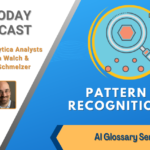
Pattern recognition in general is what machine learning systems do. They use an algorithm to learn patterns from data that can be then used to make predictions on new data. In this episode of the AI Today podcast hosts Kathleen Walch and Ron Schmelzer define the term Pattern Recognition and explain how they relate to AI and why it’s important to know about them.
Continue reading AI Today Podcast: AI Glossary Series- Pattern Recognition at Cognilytica.
AI Today Podcast: AI Glossary – Machine Learning Approaches: Supervised Learning, Unsupervised Learning, Reinforcement Learning
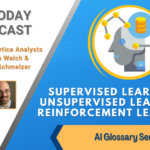
In this episode of the AI Today podcast hosts Kathleen Walch and Ron Schmelzer define terms related to Machine Learning Approaches including Supervised Learning, Unsupervised Learning, Reinforcement Learning and explain how they relate to AI and why it’s important to know about them.
Show Notes:
- FREE Intro to CPMAI mini course
- CPMAI Training and Certification
- AI Glossary
- Glossary Series: Artificial Intelligence
- AI Glossary Series – Machine Learning, Algorithm, Model
- Glossary Series: Probabilistic & Deterministic
- Glossary Series: Classification & Classifier, Binary Classifier, Multiclass Classifier, Decision Boundary
- Glossary Series: Regression, Linear Regression
- Glossary Series: Clustering, Cluster Analysis, K-Means, Gaussian Mixture Model
- Glossary Series: Goal-Driven Systems & Roboadvisor
- Understanding the Goal-Driven Systems Pattern of AI
AI Today Podcast: AI Glossary Series – Machine Learning, Algorithm, Model
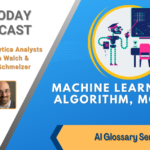
Even though the term Artificial Intelligence does not have an agreed upon definition, the term machine learning does have a definition. In this episode of the AI Today podcast hosts Kathleen Walch and Ron Schmelzer define the terms Machine Learning, Algorithm, Model and explain how they relate to AI and why it’s important to know about them.
AI Today Podcast: AI Glossary – DeepMind, AlphaGo, and AlphaZero

In this episode of the AI Today podcast hosts Kathleen Walch and Ron Schmelzer discuss and define at a high level DeepMind, AlphaGo, and AlphaZero.
Show Notes:
- FREE Intro To CPMAI Mini Course
- CPMAI Training and Certification
- AI Today Podcast #94: Understanding the Goal-Driven Systems Pattern of AI
- AI Glossary
Continue reading AI Today Podcast: AI Glossary – DeepMind, AlphaGo, and AlphaZero at Cognilytica.
AI Today Podcast: AI Glossary Series – Prediction, Inference, and Generalization
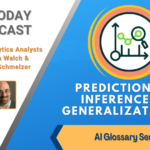
In this episode of the AI Today podcast hosts Kathleen Walch and Ron Schemlzer define and discuss at a high level the terms Prediction, Inference, and Generalization, why it’s important to understand these terms, and how they fit into the overall picture of AI.
Show Notes:
- FREE Intro to CPMAI mini course
- CPMAI Training and Certification
- AI Glossary
- Glossary Series: Machine Learning, Algorithm, Model
- Glossary Series: Classification & Classifier, Binary Classifier, Multiclass Classifier, Decision Boundary
- Glossary Series: Regression, Linear Regression
AI Today Podcast: AI Glossary Series – Heuristic & Brute-force Search

In this episode of the AI Today podcast hosts Kathleen Walch and Ron Schemlzer define and discuss at a high level the terms Heuristic & Brute-force Search, why it’s important to understand these terms, and how they fit into the overall picture of AI.
Show Notes:
- FREE Intro to CPMAI mini course
- CPMAI Training and Certification
- AI Glossary
AI Today Podcast: AI Glossary Series – Goal-Driven Systems & Roboadvisor

One of the seven patterns of AI, the objective of goal driven systems is to find the most optimal path or solution to a problem. In this episode of the AI Today podcast hosts Kathleen Walch and Ron Schemlzer define and discuss at a high level the terms Goal-Driven Systems as well as Roboadvisor, why it’s important to understand these terms, and how they fit into the overall picture of AI.
AI Today Podcast: AI Glossary Series – Probabilistic & Deterministic
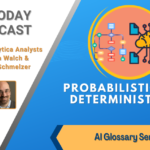
In this episode of the AI Today podcast hosts Kathleen Walch and Ron Schmelzer define the terms Probabilistic & Deterministic and explain how they relate to AI and why it’s important to know about them.
Show Notes:
- FREE Intro to CPMAI mini course
- CPMAI Training and Certification
- AI Glossary
- AI Glossary Series – Artificial Intelligence
AI Today Podcast: AI Glossary Series: Personalization, Recommendation, and Hyperpersonalization

The objective of the hyperpersonalization pattern of AI is to treat each individual as an individual. In this episode of the AI Today podcast hosts Kathleen Walch and Ron Schmelzer define and discuss at a high level the terms Personalization, Recommendation, and Hyperpersonalization, how they are related, and why it’s important to have a light level understanding of these terms, and how machine learning makes hyperpersonalization possible.
AI Today Podcast: AI Glossary Series: Recognition Systems, Computer Vision, ImageNet
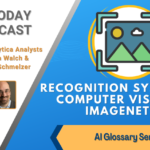
The objective of the recognition pattern of AI is to have machines identify and understand the real world and unstructured data. In this episode of the AI Today podcast hosts Kathleen Walch and Ron Schmelzer define and discuss at a high level the terms Recognition Systems, Computer Vision, and ImageNet, how they are related, and why it’s important to have a light level understanding of these terms.
AI Today Podcast: AI Glossary Series: Turing Test

Named after researcher and AI pioneer Alan Turing, the Turing Test aims to test whether a machine or system is “intelligent” by putting the system to a test. In this episode of the AI Today podcast hosts Kathleen Walch and Ron Schmelzer define the Turing Test at a high level and discuss if it’s now possibly an overly simplistic assessment of whether or not machines have achieved necessary levels of intelligence.
Continue reading AI Today Podcast: AI Glossary Series: Turing Test at Cognilytica.
AI Today Podcast: Where Virtual Agents are headed in 2023, Interview with Pat Calhoun, CEO of Espressive

Virtual agents and chatbots have been proving useful at organizations. But is their real potential yet to be tapped? In this episode of the AI Today Podcast hosts Kathleen Walch and Ron Schmelzer interview Pat Calhoun who is CEO of Espressive. He shares with us where he thinks virtual agents are headed in 2023 including why he thinks virtual agents will be the next Intranet, what the pervasiveness of chatbots means for organizations, and the impact virtual agents will have on the way we work.
AI Today Podcast: AI Glossary Series-Conversational Systems, Chatbots, Voice Assistants, Machine Translation

In this episode of the AI Today podcast hosts Kathleen Walch and Ron Schmelzer define AI Today the term Conversational Systems. We also define the terms Chatbots, Voice Assistants, and Machine Translation and explain how they relate to AI and why it’s important to know about them.
Show Notes:
- FREE Intro to CPMAI mini course
- CPMAI Training and Certification
- AI Glossary
- AI Glossary Series – Natural Language Processing (NLP)
- AI Glossary Series – Content Summarization & Analysis,Sentiment Analysis
- AI Today Podcast #104: Patterns of AI – Conversation / Human Interaction
- AI Today Podcast #012: Chatbots – Are they Useful?
AI Today Podcast: AI Glossary Series: Content Summarization and Analysis, Sentiment Analysis

In this episode of the AI Today podcast hosts Kathleen Walch and Ron Schmelzer define Content Summarization and Analysis and Sentiment Analysis. We explain at a high level what these terms are and how they relate to AI.
Show Notes:
- FREE Intro to CPMAI mini course
- CPMAI Training and Certification
- AI Glossary
- AI Glossary Series – Natural Language Processing (NLP)
- AI Glossary Series – Conversational Systems, Chatbots, Voice Assistants, Machine Translation
- AI Today Podcast #104: Patterns of AI – Conversation / Human Interaction
AI Today Podcast: Glossary Series: Cybernetics

Cybernetics has actually been around longer than the term AI. In this episode of the AI Today podcast hosts Kathleen Walch and Ron Schmelzer define what Cybernetic systems are at a high level.
Show Notes:
- FREE Intro To CPMAI Mini Course
- CPMAI Training and Certification
- AI Glossary
Continue reading AI Today Podcast: Glossary Series: Cybernetics at Cognilytica.
AI Today Podcast: How AI and Project Management Fit Together: Interview with Kendall Lott and Mike Fortezza, PM Point of View Podcast
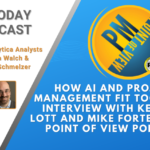
In this episode of the AI Today podcast hosts Kathleen Walch and Ron Schmelzer have a discussion with the hosts of PM Point of View Podcast Kendall Lott and Mike Fortezza. We discuss why project managers should pay attention to AI, why data-centric approaches are needed to run AI projects, and how CPMAI can enhance PM’s ability to run data projects.
AI Today Podcast: AI Glossary Series: Natural Language Processing (NLP), NLU, NLG, Speech-to-Text, TTS, Speech Recognition

In this episode of the AI Today podcast hosts Kathleen Walch and Ron Schmelzer define Natural Language Processing (NLP), Natural Language Understanding (NLU), Natural Language Generation (NLG), Speech-to-Text, Test-to-Speech, and (Automated) Speech Recognition. We share how these terms are related and how they fit into AI.
Show Notes:
- FREE Intro to CPMAI mini course
- CPMAI Training and Certification
- AI Glossary
- AI Glossary Series – Content Summarization & Analysis, Sentiment Analysis
- AI Glossary Series – Conversational Systems, Chatbots, Voice Assistants, Machine Translation
- AI Today Podcast #104: Patterns of AI – Conversation / Human Interaction
AI Today Podcast: AI Glossary Series- Autonomous Systems

In this episode of the AI Today podcast hosts Kathleen Walch and Ron Schmelzer define Autonomous Systems, as well as related terms including Levels of Autonomy, Autonomous vehicle, and Autonomous (automated) Retail.
Show Notes:
- FREE Intro to CPMAI mini course
- CPMAI Training and Certification
- AI Glossary
- AI Today Podcast #112: Patterns of AI – Autonomous Systems
- AI Today Podcast #055: Autonomous Business Process (ABP)
- AI Today Podcast #37: Life with Level 5 Autonomous Vehicles
- The AI-Enabled Future
- AI Today Podcast #29: The First Autonomous Vehicle Fatality — Now What?
Continue reading AI Today Podcast: AI Glossary Series- Autonomous Systems at Cognilytica.
AI Today Podcast: AI Glossary Series: AI Winters
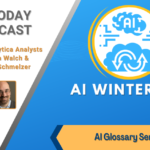
Like all technologies, Artificial Intelligence (AI) is not immune to the waves of obscurity, hyped promotion, plateauing of interest, and decline. In fact, the AI industry has been through two such major waves of interest, hype, plateau, and decline, commonly referred to as the “AI Winters”. In this episode of the AI Today podcast hosts Kathleen Walch and Ron Schmelzer define an “AI Winter” at a high level.
Continue reading AI Today Podcast: AI Glossary Series: AI Winters at Cognilytica.
AI Today Podcast: An Agile Perspective on AI – Interview with Bob Payne, host of the Agile Toolkit podcast

On the AI Today podcast we regularly interview thought leaders who are implementing AI and cognitive technology at various companies and agencies. However we are seeing the cross section of AI and project management and felt it was important to bring in PM experts to the discussion. In this episode hosts Kathleen Walch and Ron Schmelzer interview Bob Payne who is host of the Agile Toolkit podcast.
AI Today Podcast: AI Glossary Series: Seven Patterns of AI
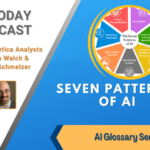
Cognilytica has spent a considerable amount of time on AI use cases and how different industries are using various AI and cognitive technologies and we’ve found that there are seven common patterns that seem to continuously show up in all these use cases. In this podcast hosts Kathleen Walch and Ron Schmelzer define at a high level the seven patterns of AI and explain how they can be used to shortcut AI projects.
Continue reading AI Today Podcast: AI Glossary Series: Seven Patterns of AI at Cognilytica.
AI Today Podcast: Applying CPMAI in the real world, Interview with Andre Barcaui, CPMAI

It’s one thing for us to talk about the Cognitive Project Management for AI (CPMAI) Methodology and the benefits it can bring to project managers running AI and advanced data projects, but hearing directly how individuals are applying the CPMAI Methodology and how it has directly benefit their projects can be incredibly valuable. In this episode of the AI Today podcast hosts Kathleen Walch and Ron Schmelzer interview Andre Barcaui who is a Brazilian project manager and professor and he is also CPMAI certified.
AI Today Podcast: AI Glossary Series: Augmented Intelligence
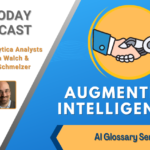
Rather than replacing humans with autonomous agents, businesses and agencies can see significant value in enhancing the capabilities of their existing staff and leveraging AI as a “force multiplier” that enables them to do more with their existing resources. This is the key idea behind the concept of Augmented Intelligence. In this episode of the AI Today podcast hosts Kathleen Walch and Ron Schmelzer discuss the idea of augmented intelligence and what it means when AI can be used to assist humans, rather than replacing them.
Continue reading AI Today Podcast: AI Glossary Series: Augmented Intelligence at Cognilytica.
AI Today Podcast: Interview with Galen Low, host of The Digital Project Manager podcast
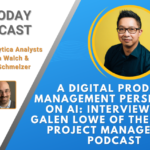
On the AI Today podcast we regularly interview thought leaders and practitioners who are implementing and managing AI and cognitive technology projects at various companies and government agencies. However in this episode hosts Kathleen Walch and Ron Schmelzer interview Galen Low, host of The Digital Project Manager podcast and co-founder of the Digital Project Manager.
AI Today Podcast: AI Glossary Series: Cognitive Technology

Sometimes, talking about what is and isn’t AI isn’t helpful given the lack of a commonly accepted definition of AI. Instead we find that using the term Cognitive technologies when we’re talking about goals of Machines mimicking and approaching Human Intelligence can provide much better results.
In this episode of the AI Today podcast hosts Kathleen Walch and Ron Schmelzer define the term Cognitive Technology.
Continue reading AI Today Podcast: AI Glossary Series: Cognitive Technology at Cognilytica.
AI Today Podcast: AI in Project Management, Interview with Ann Campea, host of The Everyday PM Podcast

On the AI Today podcast we regularly interview thought leaders and practitioners who are implementing and managing AI and cognitive technology projects at various companies and government agencies. However in this episode hosts Kathleen Walch and Ron Schmelzer interview Ann Campea who is the host of The Everyday PM Podcast. Her podcast focuses on project management and we discuss how the project management industry has changed and evolved with technological advancements, how she sees artificial intelligence impact the project management space, as well as what opportunities AI will bring to project managers.
AI Today Podcast: AI Glossary Series: Artificial General Intelligence (AGI), Strong AI, Weak AI, Narrow AI

In order to understand the goal of Artificial General Intelligence (AGI) which is also sometimes reffered to as Strong AI, it’s important to understand the difference between strong AI versus narrow or weak AI. In this episode of the AI Today podcast, hosts Kathleen Walch and Ron Schmelzer share the definitions for AGI/Strong AI and Narrow/Weak AI and explain why the terms Strong AI and Weak AI have fallen out of favor in recent years.
AI Today Podcast: Best Practices in AI Project Management: Excerpts from our Enterprise Data & AI CPMAI Panel

Companies of all sizes in just about every single industry are looking to see how Artificial Intelligence (AI) and machine learning (ML) can provide a competitive edge, provide efficiencies, and improve ROI in today’s competitive landscape. As a result, this creates tremendous opportunity for people looking to manage these types of projects and there is a significant and growing demand for skilled AI project managers across the whole range of AI capabilities.
AI Today Podcast: AI Glossary Series: Artificial Intelligence

The term Artificial Intelligence (AI) was coined in 1956. Despite the fact that the term is now decades old, there still is no commonly accepted definition. In this episode of the AI Today podcast, hosts Kathleen Walch and Ron Schmelzer share Cognilytica’s definition for AI.
Show Notes:
- FREE Intro to CPMAI mini course
- CPMAI Training and Certification
- AI Glossary
Continue reading AI Today Podcast: AI Glossary Series: Artificial Intelligence at Cognilytica.
AI Today Podcast: Bringing AI & Agile Together: Interview with Greg Mester, host of the 5am Mester Scrum podcast

On the AI Today podcast we regularly interview thought leaders who are implementing AI and cognitive technology at various companies and agencies. However in this episode hosts Kathleen Walch and Ron Schmelzer interview Greg Mester who is host of the 5am Mester Scrum podcast. As his podcast talks about Scrum and Agile, he shares with us common misunderstandings about Agile and Scrum, how he sees AI helping Application or Agile Teams, and how the role of project managers is evolving.
AI Today Podcast: Applying CPMAI in the Real World, Interview with Andrew Stone, Maximus

It’s one thing for us to talk about the Cognitive Project Management for AI (CPMAI) Methodology and the benefits it can bring to managers running AI and advanced data projects, but hearing directly how individuals are applying the CPMAI Methodology can be incredibly valuable. In this episode of the AI Today podcast hosts Kathleen Walch and Ron Schmelzer interview Andrew Stone who is Lead Specialist – Product Owner, Data Science at Maximus and he is also CPMAI certified.
AI Today Podcast: Ethical & Responsible AI Series: Ethical & Responsible AI is something you do, not a statement

When putting together your Ethical and Responsible AI Framework it’s important to remember that it needs to be actually implemented. Why spend all this time and resources to put together a framework just to let it sit on a shelf untouched. Remember: Ethical & Responsible AI is something you do, not a statement! In this episode of the AI Today podcast hosts Kathleen Walch and Ron Schmelzer talk more about this topic and why it’s so important to actually do AI right which means doing ethical and responsible AI right as well.
AI Today Podcast: Ethical & Responsible AI Series: Setting up your organization for ethical & responsible AI success

When working on your ethical and responsible AI framework you should not overlook the roles, boards, and committees that will need to be put in place to ensure that the framework is actually implemented and updated as needed for overall AI project success for the long term. In this episode of the AI Today podcast hosts Kathleen Walch and Ron Schmelzer provide a high level overview on how to set up your organization for ethical and responsible AI success.
AI Today Podcast: Ethical & Responsible AI Series: Impact of Emerging Laws and Regulations on AI

The pace of adoption for artificial intelligence (AI) and cognitive technologies continues unabated with widespread, worldwide, rapid adoption of AI and its various patterns. However with any transformative technology laws and regulations may be slow to catch up with the quickly changing technology. In this episode of the AI Today podcast hosts Kathleen Walch and Ron Schmelzer discuss the global and regional impacts laws and regulations have related to data and AI.
AI Today Podcast: Ethical & Responsible AI Series: Explainable and Interpretable AI

Not all algorithms are explainable. So does that mean that it’s ok to not provide any explanation on how your AI system got to the decision it did if you’re using one of those “black box” algorithms? The answer should obviously be no. So, what do you do then when creating Ethical and Responsible AI systems to address this issue around explainable and interpretable AI?
AI Today Podcast: Ethical & Responsible AI Series: AI Auditability, Traceability, and System Control

In order to have people use AI systems they need to feel that they can trust these systems. That includes putting measures in place around AI Auditability, Traceability, and System Control. But what exactly does that mean and how do you do this in the context of your Ethical and Responsible AI Framework? In this episode of the AI Today podcast hosts Kathleen Walch and Ron Schmelzer discuss issues related to AI Auditability, Traceability, and System Control, why it’s important to be transparent with users, and what steps and controls you should have in place.
AI Today Podcast: Ethical & Responsible AI Series: AI System Transparency

When building Ethical and Responsible AI systems it’s important to think about AI System Transparency. These are ethical principles that focus on giving human users as much visibility into overall system behavior, including issues of visibility into data and AI configuration, appropriate disclosure and user consent, means for gaining visibility into bias and potential mitigation of that bias, and use of open systems.
AI Today Podcast: Ethical & Responsible AI Series: Disclosure & Consent
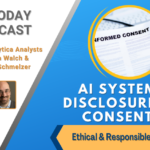
In order to have people use AI systems they need to feel that they can trust these systems. That includes when they system provides an answer they may not want to hear. In this episode of the AI Today podcast hosts Kathleen Walch and Ron Schmelzer discuss issues related to AI Today Podcast: Ethical & Responsible AI Series: Disclosure & Consent including why it’s important to disclose to users they are interacting with an AI, why it’s important to be transparent with users, and what steps you should consider to have users provide consent.
AI Today Podcast: Ethical & Responsible AI Series: AI & Data Privacy

If data is the heart of AI, then it should come as no surprise that data privacy plays a big role in building ethical and responsible AI systems. In this episode of the AI Today podcast hosts Kathleen Walch and Ron Schmelzer discuss issues related to AI and data privacy, why it’s important to stay up to date on these topics, how they can impact your project, and additional factors that need to be taken into consideration when building trustworthy AI systems.
AI Today Podcast: Ethical & Responsible AI Series: AI Safety & Security

AI systems have the potential to provide great value, but also the potential to cause great harm. Knowing how to build or use AI systems is simply not going to be enough. You need to know how to build, use, and interact with these systems ethically and responsibly. In this episode of the AI Today podcast hosts Kathleen Walch and Ron Schmelzer discuss issues that related to AI safety and security and why building trustworthy AI is critical for the success of the project.
AI Today Podcast: AI in Construction – Interview with René Morkos, CEO of ALICE Technologies

Construction companies are increasingly using AI in a range of ways to tackle a number of challenges. From optimizing work schedules to improving workplace safety to keeping a secure watch on construction facilities, AI in the construction industry is already producing value. One such company, ALICE Technologies, is focused on a different challenge: scheduling. In this podcast hosts Kathleen Walch and Ron Schmelzer interview with René Morkos, CEO of ALICE Technologies and Adjunct Professor at Stanford.
AI Today Podcast: Ethical & Responsible AI Series: AI & Data Fairness & Bias

Organizations are increasingly making use of AI systems to power their operations and enable a wide range of applications from the trivial to the mission-critical. As a result it’s more important than ever to understand the many complex issues related to AI and Data fairness and bias. In this Ethical and Responsible AI Series hosts Kathleen Walch and Ron Schemlzer dig deeper into the role data plays in AI, and how building AI systems with fairness in mind is critical.
AI Today Podcast: Ethical & Responsible AI Series: The Layers of Ethical AI & A Framework for Ethical & Responsible AI

Organizations are increasingly making use of AI systems to power their operations and enable a wide range of applications from the trivial to the mission-critical. Many of the concepts of AI ethics generally revolve around the set of what is “right” vs “wrong” with regards to intelligent systems. However, the sort of ethical concepts that are discussed in AI ethics frameworks tend to cluster around five different areas including: Societal Ethical AI, Responsible AI, Trustworthy AI, AI Governance, and Interpretable and Explainable AI.
AI Today Podcast: Ethical & Responsible AI Series: Why is Ethical & Responsible AI Necessary?

AI systems have the potential to provide great value, but also the potential to cause great harm. Knowing how to build or use AI systems is simply not going to be enough. You need to know how to build, use, and interact with these systems ethically and responsibly. As more organizations adopt AI technologies the need to do AI ethically and responsibly is becoming incredibly important.
AI Today Podcast: Adopting AI Best Practices – Interview with Krystene Jennings, Centene

Companies of all sizes in just about every single industry are looking to see how Artificial Intelligence (AI), machine learning (ML), and cognitive technology projects can provide a competitive edge, provide efficiencies, and improve ROI in today’s competitive landscape. As a result, this creates tremendous opportunity for people looking to manage these types of projects and there is a significant and growing demand for skilled AI project managers across the whole range of AI capabilities.
AI Today Podcast: Applying CPMAI in the Real World – Interview with Karen McCann, Toshiba Global Commerce Solutions
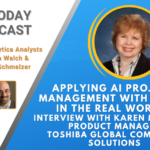
It’s one thing for us to talk about the Cognitive Project Management for AI (CPMAI) Methodology and the benefits it can bring to managers running AI and advanced data projects, but hearing directly how individuals are applying the CPMAI Methodology can be incredibly valuable. In this episode of the AI Today podcast hosts Kathleen Walch and Ron Schmelzer interview Karen McCann who is a Product Manager at Toshiba Global Commerce Solutions and is also CPMAI certified.
AI Today Podcast: AI Failures Series: Falling into the Uncanny Valley

In this episode of the AI Today podcast hosts Kathleen Walch and Ron Schmelzer revisit the discussion around common reasons why AI projects fail. Sometimes AI systems can be too creepy and go into the uncanny valley. The uncanny valley is a relationship between the degree of an object’s resemblance to a human being and the emotional response to the object.
AI Today Podcast: Lessons learned from AI Project Management – Interview with Charles Mendoza, Maximus

It’s one thing for us to talk about the Cognitive Project Management for AI (CPMAI) Methodology and the benefits it can bring to managers running AI and advanced data projects, but hearing directly how companies are applying the CPMAI Methodology can be incredibly valuable. In this episode of the AI Today podcast hosts Kathleen Walch and Ron Schmelzer interview Charles Mendoza, who is Sr.
AI Today Podcast: Why can’t we use Agile for AI?

If you have ever tried to apply Agile methodologies to your AI projects you’ve probably noticed that Agile is challenged by the requirements of AI systems. We need to evolve Agile Methodologies from a Data-First Perspective. In this episode of the AI Today podcast hosts Kathleen Walch and Ron Schmelzer revisit the Agile Manifesto and Agile Methodologies and share why AI and data-centric methodologies, and specifically CPMAI Methodology, are needed for running AI projects successfully.
Continue reading AI Today Podcast: Why can’t we use Agile for AI? at Cognilytica.
AI Today Podcast: AI in the Cloud

In this episode of the AI Today podcast hosts Kathleen Walch and Ron Schmelzer discuss what AI in the cloud really means. They break down what is the cloud with a technical definition and then an economic definition to level set the topic and then dig into the question: What does AI have to do with the Cloud?
Continue reading AI Today Podcast: AI in the Cloud at Cognilytica.
AI Today Podcast: Revisiting AI Failures – Vendor Driven Causes of Failure

Our AI Failures Series podcast was so popular we wanted to revisit some of the main reasons why we see AI projects fail. In this episode of the AI Today podcast hosts Kathleen Walch and Ron Schmelzer revisit the discussion around common reasons why AI projects fail. Not every vendor solution solves your problem, regardless of what they may tell you.
Is Data Scientist still the sexiest job of the 21st Century?

Back in 2012 an article was published in HBR stating that Data Scientist was the sexiest job of the 21st Century. However, about a decade later, does this still hold true? In this episode of the AI Today podcast hosts Kathleen Walch and Ron Schmelzer discuss how Data Project Manager is becoming the new sexy job title of the next decade, why certifications for PMs matter, and how certifications like CPMAI are quickly gaining traction in the PM community.
Continue reading Is Data Scientist still the sexiest job of the 21st Century? at Cognilytica.
AI Today Podcast: An Intro to CPMAI Methodology

Far too often, agencies, organizations, and consulting firms are running data and AI projects without taking the right steps to ensure their success. Agile and iterative approaches have become adopted best practices for application development projects, but why don’t we have something similar when it comes to advanced analytics, big data, and AI projects? Without using best-practices approaches that standardize steps for data preparation, data identification, and data protection, it’s hard to achieve the success you’re expecting, wasting money and resources, leading to failure.
Continue reading AI Today Podcast: An Intro to CPMAI Methodology at Cognilytica.
AI Today Podcast: Is the next AI Winter approaching?

Like all technologies, Artificial Intelligence (AI) is not immune to the waves of obscurity, hyped promotion, plateauing of interest, and decline. In fact, the AI industry has been through two such major waves of interest, hype, plateau, and decline, commonly referred to as the “AI Winters”. Is the next AI Winter approaching? In this episode of the AI Today podcast hosts Kathleen Walch and Ron Schmelzer discuss the 3 main reasons for a winter: decline in investment, interest, and research.
Continue reading AI Today Podcast: Is the next AI Winter approaching? at Cognilytica.
AI Today Podcast: Automation Roadmap Series: Level 3 Intelligent Automation

Level 3 Intelligent Automation allows you to address the greatest challenges of unpredictability and variability and be able to achieve autonomous process discovery, autonomous process analytics, and autonomous process optimization. But is Level 3 Intelligent Automation right for your team or process? In this episode of the AI Today podcast hosts Kathleen Walch and Ron Schmelzer discuss what Level 3 Intelligent Automation is, what questions you need to ask to identify opportunities for Level 3 automation, and some of the challenges with Level 3 automation.
AI Today Podcast: Automation Roadmap Series: Level 2 Intelligent Automation

Level 2 Intelligent Automation allows you to address greater challenges of unpredictability and variability. But how do you know if Level 2 Intelligent Automation is even right for your team? In this episode of the AI Today podcast hosts Kathleen Walch and Ron Schmelzer discuss what Level 2 Intelligent Automation is, how to go beyond NLP & computer vision to use cognitive technology to help spot patterns & anomalies, as well as some of the challenges Level 2 Intelligent Automation presents.
AI Today Podcast: Automation Roadmap Series: Advancing to Level 1 Intelligent Automation

Adding intelligence to automation enables greater degrees of variability and unpredictability. In this episode of the AI Today podcast hosts Kathleen Walch and Ron Schmelzer discuss what it means to have Level 1 automation to handle variability and unpredictability, how to incorporate NLP and computer vision to help handle tasks with unstructured data, some of the challenges Level 1 automation can present, and what the key ingredient to Level 1 automation is.
AI Today Podcast: Automation Roadmap Series: Starting with Level 0 Automation

In this episode of the AI Today podcast hosts Kathleen Walch and Ron Schmelzer dive deep into Level 0 Automation, why so-called “dumb” automation provides tremendous value to your team when implemented correctly. This episode shares examples for immediate ROI with Level 0 automation, how your team should go about identifying and prioritizing opportunities for Level 0 automation, how to plan and iterate, then implement automation.
AI Today Podcast: Automation to Intelligence Roadmap Series: What to automate?

For organizations who want to get started on their AI journey, a great first place to start is with automation. However, what exactly do you automate? In this episode of the AI Today podcast hosts Kathleen Walch and Ron Schmelzer discuss how to find automation opportunities in business processes, questions your team should ask when figuring out what to automate, and when and when not to start with “low hanging fruit”.
AI Today Podcast: Does AI Still Matter in 2022?
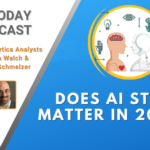
In our first ever AI Today podcast we asked the question “Does AI Matter?” and we revisited this question in our one year anniversary podcast as well. Now about 5 years from our first ever podcast episode we wanted to ask this question again: Does AI still matter in 2022? In this episode of the AI Today podcast hosts Kathleen Walch and Ron Schmelzer dig into this question and share how AI has changed and evolved over the past 5 years.
Continue reading AI Today Podcast: Does AI Still Matter in 2022? at Cognilytica.
AI Today Podcast: Automation to Intelligence Roadmap Series – What is a Business Process?

For organizations who want to get started on their AI journey, a great first place to start is with automation. However before even figuring out what to automate you should have a solid understanding of your business processes and tasks. But, what exactly is a business process? In this episode of the AI Today podcast hosts Kathleen Walch and Ron Schmelzer discuss what a business process is, define processes versus tasks, and bring this into the context of automation.
AI Today Podcast: Interview with Venkat Gunnu, Senior Director, Data Science & Innovation at Comcast

Data science is transforming business and generating new value across the organization. However, for large organizations they need a centralized group that centers on a discipline’s vision, governance, technique, and framework. In this episode of the AI Today podcast hosts Kathleen Walch and Ron Schmelzer Venkat Gunnu who is Senior Director, Data Science & Innovation at Comcast.
AI Today Podcast Roadmap Series: From Automation to Intelligence – What should we automate and why

For organizations who want to get started on their AI journey, a great first place to start is with automation. However, figuring out what to automate, why to automate, and what return on investment (ROI) it will provide can be tricky. In this episode of the AI Today podcast hosts Kathleen Walch and Ron Schmelzer discuss level 0 automation – what is it, why organization should look to automate processes, and what questions to ask in order to get started.
AI Today Podcast: Implementing AI at Scale, Interview with Ella Hilal, Head of Data Science, Engineering, Revenue and Growth at Shopify

Shopify has over 1.7 million merchants across over 175 countries, with hundreds of millions of consumers shopping at their stores. By leveraging the scale of their data they are able to create new experiences for their merchants, and apply Machine Learning at scale. In this episode of the AI Today podcast, hosts Kathleen Walch and Ron Schmelzer interview Ella Hilal, who is the Head of Data Science, Engineering, Revenue and Growth at Shopify.
AI Today Podcast: What is AI Industrialization? Interview with Anil Kumar, Exec. Director at Verizon

As companies are looking to leverage cognitive technology, and deploying machine learning models, organizations need to make sure they have the correct people, processes, and technology in place to succeed. In this episode of the AI Today podcast hosts Kathleen Walch and Ron Schmelzer discuss with Anil Kumar, Exec. Director AI Industrialization at Verizon what AI industrialization is and how Verizon is moving from pockets of AI/ML to AI/ML being implemented across the organization.
AI Today Podcast: Roadmap Series: Getting Started on the Automation to Intelligence Journey
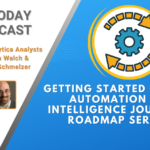
The idea of bringing organizations from automation to intelligence is about the journey, not the destination. In this episode of the AI Today podcast hosts Kathleen Walch and Ron Schmelzer discuss and overview of the automation to intelligence journey including introducing benefits of automation, discussing why the automation journey matters, and how to go about moving up the ladder of automation to intelligence.
AI Today Podcast: AI and Healthcare – Interview with Vignesh Shetty SVP & GM Edison AI and Platform at GE Healthcare Digital

Heavily regulated industries such as healthcare can pose unique challenges, but also provide unique opportunities with it comes to AI and ML. In this episode of the AI Today podcast, hosts Kathleen Walch and Ron Schmelzer interview Vignesh Shetty who is Senior Vice President & General Manager Edison AI and Platform at GE Healthcare Digital.
AI Today Podcast: The Challenges and Issues with Facial Recognition

At a very fundamental level facial recognition is a way of recognizing a human face through technology. Seems straight forward enough, right? Not so fast. For many industries, facial recognition technology is still a gray area, clouded with mystery and mistrust. In this episode of the AI Today podcast, hosts Kathleen Walch and Ron Schmelzer provide an overview of how facial recognition works, discuss the concerns and issues around facial recognition technology, news about how the technology was misused or raised ethical concerns, and pose the question: Is facial recognition technology a technology that is too difficult to get right in practice?
Continue reading AI Today Podcast: The Challenges and Issues with Facial Recognition at Cognilytica.
AI Today Podcast: Overview of Synthetic Data

Machine learning algorithms need examples of data from which they can learn, especially supervised machine learning algorithms. However, one big challenge for those looking to put machine learning into practice is the lack of a sufficient quantity of good quality data examples from which to train systems. To address the needs for large quantities of high quality data, vendors have emerged to provide computer-generated data, known as synthetic data, that matches the range and quality of data needed to train systems.
Continue reading AI Today Podcast: Overview of Synthetic Data at Cognilytica.
AI Today Podcast: AI Education Series: Data Pipelines

This podcast episode provides a snippet of Cognilytica’s AI and ML education from our Cognilytica Education Subscription. Data is at the heart of AI. It should be no surprise then that proper data management is crucial for AI projects. This podcast is an excerpt from our Cognilytica Education course discussing data pipelines. In this clip we discuss the training pipeline the inference pipeline.
Continue reading AI Today Podcast: AI Education Series: Data Pipelines at Cognilytica.
AI Today Podcast: The Expanding Data Infrastructure Layer

As the markets for Data, Automation, Analytics, and AI continue to evolve, so too does Cognilytica’s coverage of these areas. In today’s podcast we discuss how we are expanding our current Cognilytica Classification of the AI Vendor Ecosystem to include a data infrastructure layer. Within this layer falls data generation, big data storage and query, and data engineering and DataOps.
Continue reading AI Today Podcast: The Expanding Data Infrastructure Layer at Cognilytica.
AI Today Podcast: An Overview of the Data Labeling Market
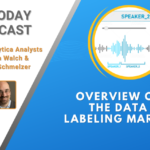
In order for many machine learning algorithms to be trained, especially supervised learning algorithms, they need to be fed relevant data along with the desired meaning of the data. In this episode of the AI Today podcast hosts Kathleen Walch and Ron Schmelzer provide an overview of the data labeling market, what “ground truth” labeling is, the different data labeling and annotation needs, and data labeling and annotation use cases.
Continue reading AI Today Podcast: An Overview of the Data Labeling Market at Cognilytica.
AI Today Podcast: The State of AI (and AI Today) heading into 2022

On today’s AI Today podcast hosts Kathleen Walch and Ron Schmelzer are going to do their annual AI Market Forecast & Trends. They will spend some time reflecting on what they are seeing in the market and where they forecast the AI markets will go in 2022. They will talk about the Data Labeling, Data Engineering & Preparation, ML Platforms, ML Ops, and RPA markets.
Continue reading AI Today Podcast: The State of AI (and AI Today) heading into 2022 at Cognilytica.
AI Today Podcast: Looking back at AI (and AI Today) in 2021

With 2021 quickly fading into the rear view mirror it’s time to do our annual yearly AI recap. On today’s podcast hosts Kathleen Walch and Ron Schmelzer are going to take a look back at 2021 as it relates to AI and share some of the hottest news from the past year, including acquisitions and fund raises, and some of our favorite podcasts of 2021.
Continue reading AI Today Podcast: Looking back at AI (and AI Today) in 2021 at Cognilytica.
AI Today Podcast: AI Failure Series – Overpromising and Underdelivering
AI Today Podcast: Interview with Gilman Louie, Commissioner for the National Security Commission on AI (NSCAI)

Earlier in 2021, The National Security Commission on AI (NSCAI) published their final report that presents the NSCAI’s strategy for winning the artificial intelligence era and provides a strategy to get the United States AI-ready by 2025. On this episode of the AI Today podcast hosts Kathleen Walch and Ron Schmelzer had the opportunity to interview Gilman Louie who is one of 15 commissioners for the National Security Commission on AI (NSCAI) and co-founder and partner of Alsop Louie Partners, an early-stage technology venture capital firm.
AI Today Podcast: Interview with Mignon Clyburn, Commissioner for the National Security Commission on AI (NSCAI)

For anyone following AI, it should come as no surprise that countries around the world are taking a vested interest in AI. In 2021 the NSCAI published their final report explaining the steps the United States must take to responsibly use AI for national security and defense, defend against AI threats, and promote AI innovation.
AI Today Podcast: AI Failure Series – Not Understanding the Model & Data Lifecycle

It’s important for organizations to understand all that’s involved that goes into the model. A common reason that AI projects fail is that the team does not understand the model and data lifecycle. In this episode of the AI Today podcast hosts Kathleen Walch and Ron Schmelzer dig deeper into this subject and share tips for organizations to overcome this common issue.
AI Today Podcast: AI Failure Series – Believing Vendor & Industry Hype

AI is not the solution to all problems. And, not every vendor solution solves your problem, regardless of what they may tell you. In this episode of the AI Today podcast hosts Kathleen Walch and Ron Schmelzer continue the discussion around common reasons why AI projects fail. In this episode they dig into issues that can happen when companies don’t ask the right questions and get caught up believing vendor and industry hype.
AI Today Podcast: AI Failure Series – The Real World Mismatch
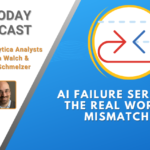
Far too often, organizations move forward with AI projects without having a clear understanding of how their AI and ML models are going to be used in the real world. This lack of real world understanding is a major reasons why AI projects fail. In this episode of the AI Today podcast hosts Kathleen Walch and Ron Schmelzer dig deeper into this topic, and share ways companies can overcome this issue.
Continue reading AI Today Podcast: AI Failure Series – The Real World Mismatch at Cognilytica.
AI Today Podcast: Interview with Albert King, Chief Data Officer of the Scottish Government

Countries across the world are understanding that they can take advantage of the tremendous transformation presented by AI and cognitive technologies and position themselves for global competitiveness in the future. As a result, countries are coming up with their own unique AI strategies. In this episode of the AI Today podcast hosts Kathleen Walch and Ron Schmelzer interview Albert King, Chief Data Officer of the Scottish Government to discuss the Scottish AI strategy that was published in March 2021.
AI Today Podcast: Data Science through a Human Lens – Interview with Felipe Flores, host of Data Futurology Podcast

On the AI Today podcast we regularly interview thought leaders who are implementing AI and cognitive technology at various companies and agencies. However in this episode hosts Kathleen Walch and Ron Schmelzer interview Felipe Flores, host of Data Futurology Podcast. On his podcast he talks about Data Science through a human lens and discusses the human side of data with leaders from across the globe.
AI Today Podcast: AI Failure Series – Iteration Time & Proof of Concept vs. Pilots

In order for projects to be successful, the time between concept to execution needs to be reasonably set. Far too often, we see the iteration time of AI projects to be months, if not years, from the initial pilot. Additionally, we see organizations run a proof of concept in a controlled lab setting (why?) rather than a pilot using real world systems.
AI Today Podcast: AI Education Series: Managing Data for AI

This podcast episode provides a snippet of Cognilytica’s AI and ML education from our Cognilytica Education Subscription. Data is at the heart of AI. It should be no surprise then that proper data management is crucial for AI projects. This podcast is an excerpt from our Cognilytica Education course “Managing Data for AI”. In this clip we discuss the history of how we stored data in the past and moving from transactional systems to analytics systems.
Continue reading AI Today Podcast: AI Education Series: Managing Data for AI at Cognilytica.
AI Today Podcast: AI Failure Series- Data Quality Issues
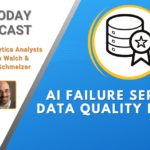
The saying garbage in is garbage out couldn’t be more true when it comes to data being fed into AI and ML models. In this podcast, hosts Kathleen Walch and Ron Schmelzer discuss the importance of data quality and why bad data is a main reason for AI project failure.
Show Notes:
- CPMAI Methodology
- CPMAI MethodologyIntro to CPMAI webinar
- AI Today Podcast: AI Failure Series – Data Quantity & Data Understanding Issues
- AI Today Podcast: AI Failure Series – ROI Misalignment
Continue reading AI Today Podcast: AI Failure Series- Data Quality Issues at Cognilytica.
AI Today Podcast: From Data Reporter to AI Strategist, Interview with Mara Pometti, Global AI Strategist at IBM

Organizations are finding that data is only part of their AI strategy. In order to fully utilize their data, they need to be able to make sense of that data and effectively communicate the story their data is telling. In this episode of the AI Today podcast, hosts Kathleen Walch and Ron Schmelzer interview Mara Pometti, Global AI Strategist at IBM.
AI Today Podcast: AI Failure Series – Data Quantity & Data Understanding Issues

AI and ML projects revolve around data so it’s important to understand how much data you really need. Understanding how to plan, manage, and operationalize AI & ML Projects is crucial for project success. In this episode of the AI Today podcast hosts Kathleen Walch and Ron Schmelzer continue the discussion around common reasons why AI projects fail.
AI Today Podcast: AI Education Series: Model Evaluation and Testing

This podcast episode provides a snippet of Cognilytica’s AI and ML education from our Cognilytica Education Subscription. When creating ML models it’s important to focus on model evaluation and testing and evaluating AI models vs. the heuristic. This podcast is an excerpt from our Cognilytica Education course “Model Evaluation and Testing”. In this clip we discuss what is overfit and underfit and bias and variance of data.
Continue reading AI Today Podcast: AI Education Series: Model Evaluation and Testing at Cognilytica.
AI Today Podcast: AI Failure Series – ROI Misalignment

In order for a project to be successful, there needs to be some positive return on the investment (ROI) involved to get this project off the ground and into production. This ROI can be measured by cost savings, but also by people savings, resource savings, and/or time allocation savings.
A common reason we see AI projects fail is that the ROI is not justified.
Continue reading AI Today Podcast: AI Failure Series – ROI Misalignment at Cognilytica.
AI Today Podcast: The State of Ethical AI – Interview with Radical AI Podcast hosts Jessie J. Smith and Dylan Doyle

On the AI Today podcast we regularly interview thought leaders who are implementing AI and cognitive technology at various companies and agencies. However in this episode hosts Kathleen Walch and Ron Schmelzer interview Jessie J. Smith and Dylan Doyle, hosts of the Radical AI podcast. On their podcast they try to probe and advance the field of Artificial Intelligence Ethics so it was only natural to discuss what they see as the most common themes around responsible and ethical use of AI as well as where we currently stand with ethical AI.
AI Today podcast: AI Failure Series- AI projects are NOT like traditional software development projects
AI Today Podcast: Data science in the Enterprise: Interview with Sanyam Bhutani, host of Chai Time Data Science podcast

On the AI Today podcast we regularly interview thought leaders who are implementing AI and cognitive technology at various companies and agencies. However in this episode hosts Kathleen Walch and Ron Schmelzer interview Sanyam Bhutani, host of Chai Time Data Science podcast. As his podcast talks about Data Science, he shares with us where things really stand in enterprises with data science, some of the biggest trends emerging in data and data science today, and some of the mundane but crucial aspects to data science that people need to be aware of.
AI Today Podcast: Insights into the AI Startup Scene: Interview with Alexandra Petrus, host of the Applied AI Pod

On the AI Today podcast we regularly interview thought leaders who are implementing AI and cognitive technology at various companies and agencies. However in this episode hosts Kathleen Walch and Ron Schmelzer interview Alexandra Petrus, host of the Applied AI Pod. On her podcast she talks to anyone who is applying AI today including startup founders, startup engineers, AI community leaders, research scientists, innovation leaders, product builders, passionate AI practitioners.
AI Today podcast: AI Education Series: Thinking and Acting Like a Data Scientist

This podcast episode provides a snippet of Cognilytica’s AI and ML education from our Cognilytica Education Subscription. There are many paths to data science and different skills are needed for creating successful data scientists. These skills include curiosity, analytical thinking, performing analysis, taking a strong position and arguing that position, being a data driven problem solver, having an impact-driven mindset, and being good at storytelling.
AI Today Podcast: Interview with Andy Ilachinski and David Broyles, hosts of the AI with AI podcast

On the AI Today podcast we regularly interview thought leaders who are implementing AI and cognitive technology at various companies and agencies. However in this episode hosts Kathleen Walch and Ron Schmelzer interview Andy Ilachinski and David Broyles, hosts of the AI with AI podcast. On their podcast they explore the latest breakthroughs in artificial intelligence and autonomy, as well as their military implications so naturally we discussed with them some of the biggest trends they are seeing emerging out of AI today, some of the challenges to AI adoption especially in military applications, and some of the surprising insights and trends they have seen over the 4 years they have hosted their podcast.
AI Today Podcast: Interview with Harvard Data Science Review (HDSR) Podcast hosts Liberty Vittert & Xiao-Li Meng

On the AI Today podcast we regularly interview thought leaders who are implementing AI and cognitive technology at various companies and agencies. However in this episode hosts Kathleen Walch and Ron Schmelzer interview Liberty Vittert & Xiao-Li Meng, hosts of the Harvard Data Science Review (HDSR) podcast. On their podcast they discuss news, policy, and business through the lens of data science so they shared ways in which data is being used or misused as well as some of the most interesting articles published in Harvard Data Science Review.
AI Today Podcast: AI Education Series: Ethical & Responsible AI

This podcast episode provides a snippet of Cognilytica’s AI and ML education from our Cognilytica Education Subscription. For AI to have a lasting positive impact it must be done responsibly. In our education we go into great detail explaining and breaking down AI, including fundamentals of AI including terms and concepts of AI and how it all fits together.
Continue reading AI Today Podcast: AI Education Series: Ethical & Responsible AI at Cognilytica.
AI Today Podcast: Interview with Craig Smith, host of Eye on AI podcast
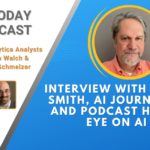
On the AI Today podcast we regularly interview thought leaders who are implementing AI and cognitive technology at various companies and agencies. However in this episode hosts Kathleen Walch and Ron Schmelzer interview Craig Smith, host of the Eye on AI podcast. Just like with our podcast, Craig interviews thought leaders in AI. He shares with us interesting insights and common themes he has seen among guests as well as what guests have surprised him.
AI Today Podcast: From IndyCar To AI: An Interview With Alex Castrounis

On the AI Today podcast we regularly interview thought leaders who are implementing AI and cognitive technology at various companies and agencies. In this episode hosts Kathleen Walch and Ron Schmelzer interview Alex Castrounis, the host from AI with Alex YouTube channel and Why of AI founder. We discuss the area of responsible AI including ethics, fairness, and safety as well as some of the biggest trends emerging in AI today.
AI Today Podcast: AI Education Series: Data Preparation for AI

This podcast episode provides a snippet of Cognilytica’s AI and ML education from our Cognilytica Education Subscription. In our education we go into great detail explaining and breaking down AI, including fundamentals of AI including actually learning the terms and concepts of AI and how it all fits together. This podcast is an excerpt from our Cognilytica Education course “Data Preparation of AI”.
Continue reading AI Today Podcast: AI Education Series: Data Preparation for AI at Cognilytica.
AI Today Podcast: Interview with David Asboth and Shaun McGirr from Half Stack Data Science podcast

On the AI Today podcast we regularly interview thought leaders who are implementing AI and cognitive technology at various companies and agencies. However in this episode hosts Kathleen Walch and Ron Schmelzer interview David Asboth and Shaun McGirr, the hosts from Half Stack Data Science podcast. As their podcast talks about realities of Data Science in the enterprise, they share with us where things really stand in enterprises with their data science practices and some of the biggest trends emerging in data and data science today.
AI Today Podcast: Interview with Francesco Gadaleta, host of Data Science at Home podcast

On the AI Today podcast we regularly interview thought leaders who are implementing AI and cognitive technology at various companies and agencies. However in this episode hosts Kathleen Walch and Ron Schmelzer interview Francesco Gadaleta, host of the Data Science at Home podcast. As his podcast talks about about data and data science trends, Francesco shares with us some of the biggest trends emerging in this area today as well as how organizations are dealing with and managing their data.
AI Today Podcast: AI Education Series: Fundamentals of AI

This podcast episode provides a snippet of Cognilytica’s AI and ML education from our Cognilytica Education Subscription. In our education we go into great detail explaining and breaking down AI, including fundamentals of AI including actually learning the terms and concepts of AI and how it all fits together. This podcast is an excerpt from our Cognilytica Education course “Fundamentals of AI”.
Continue reading AI Today Podcast: AI Education Series: Fundamentals of AI at Cognilytica.
AI Today Podcast: Interview with Andrey Kurenkov and Sharon Zhou from Let’s Talk AI Podcast

On the AI Today podcast we regularly interview thought leaders who are implementing AI and cognitive technology at various companies and agencies. However in this episode hosts Kathleen Walch and Ron Schmelzer interview Andrey Kurenkov and Sharon Zhou from the Let’s Talk AI Podcast. As their podcast covers the latest AI news, we discussed what they are seeing as some of the biggest trends emerging out of AI today.
AI Today Podcast: Methodologies and Best Practices for Successful RPA Implementation

Automation has provided tremendous value to organizations and agencies of all sorts. However, if you want to see real value from automation, and in particular Robotic Process Automation (RPA), it’s important to know what these bots can and can’t do, and how AI is being applied to help handle more complex tasks.
Hosts Kathleen Walch and Ron Schmelzer walk through different methodologies including the Cognitive Project Management for AI (CPMAI) methodology to provide you with the foundation needed for project success, especially as you incorporate AI into your intelligent automation projects.
AI Today Podcast: AI Education Series: Best Practices & Methodologies for Successful AI Implementation
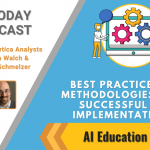
This podcast episode is part of our AI Education series and provides a snippet of Cognilytica’s AI and ML education from our Cognilytica Education Subscription. In this podcast we’re sharing a clip from our Best Practices & Methodologies for Successful AI Implementation course. Knowing best practices for implementing AI on a large scale is critical for the success of your project.
AI Today Podcast: Interview with Sagar Indurkhya, Head of NLP at Virtualitics

Many companies are trying to adopt AI at their organization. However, it’s important to have the right mindset and methodologies in place when adopting a transformative technology. In this episode of the AI Today podcast hosts Kathleen Walch and Ron Schmelzer interview Sagar Indurkhya who is Head of NLP at Virtualitics. He shares with us challenges he has seen organizations face regarding AI and ML adoption, especially for non-technical users.
AI Today Podcast: Are Legal Digital Assistants the future? Interview with Rick McFarland, Chief Data Officer at LexisNexis

The legal profession is still largely dominated by humans. However, AI and ML is steadily being adopted, enhancing legal processes and activities of all sorts. In this episode of the AI Today podcast, Cognilytica analysts interview Rick McFarland, Chief Data Officer at LexisNexis. He shares with us some of the challenges with AI adoption in the legal profession as well as some of the opportunities he sees around domain specific AI-driven Q&A platforms.
AI Today Podcast: AI Education Series: Applications of AI

This podcast episode provides a snippet of Cognilytica’s AI and ML education from our Cognilytica Education Subscription. In our education we go into great detail explaining and breaking down AI, including applications of AI. Because, it’s one thing to learn the terms and concepts of AI but it’s another thing to see how AI can actually be applied.
Continue reading AI Today Podcast: AI Education Series: Applications of AI at Cognilytica.
AI Today Podcast: Big Data Analytics Evolution with Antonio Cotroneo at OmniSci
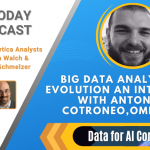
AI and advanced big data analytics have been transforming organizations and helping them get answers from their largest datasets for years. In this episode of the AI Today podcast hosts Kathleen Walch and Ron Schmelzer interview Antonio Cotroneo, Director of Technical Content Strategy at OmniSci. He shares how big data analytics has evolve over the past few years, how different industries are embracing AI and ML, and where the future is headed when it comes to AI usage.
AI Today Podcast: AI Education Series: Foundations of Data Science

At Cognilytica we’re spending lots of time educating our customers about Artificial Intelligence and related topics and areas. This podcast episode provides a snippet of Cognilytica’s AI and ML education from our Cognilytica Education Subscription where we dig deeper into the foundations of Data Science. The course is for those looking to get a foundational level overview of data science and provides a foundation of data science concepts, key terms, and additional knowledge and competencies needed to perform analysis.
Continue reading AI Today Podcast: AI Education Series: Foundations of Data Science at Cognilytica.
AI Today Podcast: Revisiting Worldwide Laws and Regulation around Data and AI

In this episode of the AI Today podcast we’ll share some of our insights and key findings from a recent Cognilytica market intelligence coverage area. We’ll be digging deeper into the state of worldwide laws and regulations and in particular data and AI laws. In recent research, Cognilytica analyzed over 200 countries with specific emphasis of various regions, states, and territories to figure out the real state with regards to laws and regulations around AI and related areas.
AI Today Podcast: AI Education Series: Attended and Unattended RPA Bots

This podcast episode provides a snippet of Cognilytica’s AI and ML education from our Cognilytica Education Subscription. While automation is not intelligence, the real value of automation, especially software automation and Robotic Process Automation (RPA) comes from removing the bot from the human. In this podcast we’ll explain in more detail what attended and unattended bots are as well as the benefits of each.
AI Today Podcast: AI’s role in process automation, Interview with James Spencer, Blue Prism

The role of automation, and more intelligent forms of process automation, have played a big role for companies during the pandemic. In this episode of the AI Today podcast hosts Kathleen Walch and Ron Schmelzer interview James Spencer who is a Solutions Engineer Manager at Blue Prism. He shares with us how important robotic process automation (RPA) has become since the pandemic dramatically changed the way people work, examples of RPA in practice, as well as what he predicts the future of process automation will be and how AI is changing process automation for the better.
AI Today Podcast: AI at Heineken, Interview with Raam Roch Hai
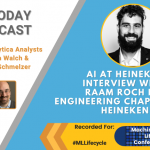
Heineken has leveraged AI and ML to help with a variety of things at the company . In this episode of the AI Today podcast we interview Raam Roch Hai who is Engineering Chapter Lead at Heineken. He shares with us examples of how Heineken has leveraged AI and ML, some of the challenges highly distributed organizations like Heineken face with adoption of ML and AI, as well as general issues and challenges related to enterprise data science.
Continue reading AI Today Podcast: AI at Heineken, Interview with Raam Roch Hai at Cognilytica.
AI Today Podcast: AI in Finance, Interview with Sravan Kasarla, Chief Data Officer of Thrivent

For many years companies in the financial services industry have been at the forefront of using technology to help with many operations and processes. In this interview podcast hosts Kathleen Walch and Ron Schmelzer interview Sravan Kasarla, Chief Data Officer (CDO) of Thrivent Financial. He discusses how AI is currently being applied in financial services, where the financial services industry rates in their adoption of AI compared to other industries, as well as how can companies create a responsive business especially from an AI perspective.
AI Today podcast: The State of Ethical AI Frameworks 2021

AI Ethics is a critical topic that organizations adopting or building AI systems need to consider. In recent research, Cognilytica analyzed over 60 ethical AI frameworks produced by governmental organizations, corporations, multinational groups, non-profits, and other groups. We learned a lot about the state of those AI Ethics frameworks, and this podcast will share some of those insights that will help you as a builder, user, or participant in the AI ecosystem.
Continue reading AI Today podcast: The State of Ethical AI Frameworks 2021 at Cognilytica.
AI Today Podcast: Moving AI Innovation Forward, Interview with Erwin Gianchandani, Deputy Assistant Director, National Science Foundation (NSF)

To the surprise of some, the National Science Foundation (NSF) is a very large funder of many AI projects every year. In this episode of the AI Today podcast hosts Kathleen Walch and Ron Schmelzer interview Erwin Gianchandani, Deputy Assistant Director, Computer and Information Science and Engineering at National Science Foundation. He discusses some of the projects that the NSF has funded.
AI Today Podcast: Leading Data Scientists The Right Way, Interview with Ylan Kazi, UnitedHealth Group

As organizations continue to hire more data scientists it’s important to make sure they are being utilized to emphasize their skill sets. In this episode of the AI Today podcast hosts Kathleen Walch and Ron Schmelzer interview Ylan Kazi, Vice President, Data Science and Machine Learning at UnitedHealth Group. He shares with us his thoughts on why it’s important to leading data scientists the right way, what are some of the key traits you look for when hiring data scientists, as well as some of the barriers to ML adoption he has seen.
AI Today Podcast: Challenges in Federal AI Adoption, Interview with Justin Marsico, Chief Data Officer at the Bureau Of The Fiscal Service

The Federal Government continues to modernize their management of data, including data governance and analytics. In the episode of the AI Today podcast we interview Justin Marsico who is the Chief Data Officer at the Bureau of the Fiscal Service, a part of the United States Department of the Treasury. Justin oversees the Fiscal Service’s provision of data to the public, including on USAspending.gov and shared with us some of the unique opportunities around data at the federal level, challenges in data governance, security, ownership, as well as what areas of seeing AI he sees effectively being used in the federal government.
AI Today Podcast: Insights into No-Code ML: Interview with Matt Chambers & Juan Buhler, Boon AI

In this episode of the AI Today podcast hosts Kathleen Walch and Ron Schmelzer interview Matt Chambers, Principal Architect & Juan Buhler, Sr. Data Science Engineer at Boon AI. They share with us some challenges they see organizations face today with trying to make sense of their unstructured data, especially video data, as it relates to AI.
AI Today Podcast: Data and AI at the State level, interview with Joy Bonaguro, CDO of California

On the AI Today podcast we often discuss how AI is being applied at the federal level. However many states are also facing many of the same data challenges, hiring needs, and adopting AI technologies as well. In the episode of the AI Today podcast we interview Joy Bonaguro, Chief Data Officer for the state of California.
AI Today Podcast: Insights into the future of ML Development: Interview with Gideon Mendels, CEO of Comet

As companies begin to move machine learning models into production there are a variety of factors that need to be addressed. In this podcast Cognilytica analysts Kathleen Walch and Ronald Schmelzer interview Gideon Mendels, CEO of Comet. He discusses challenges organizations face today with trying to bring ML models into production, why it’s important to have a tool for data scientists and teams to track, compare, explain and optimize experiments and models, and where ML Ops fits into the overall ML ecosystem.
AI Today Podcast: Advancing AI in Finance, Interview with Agus Sudjianto, Wells Fargo

The finance and banking industries have long been ahead of other industries with their adoption of AI. From fraud detection, to roboadvising, to NLP applications the finance industry is adopting every pattern of the Seven Patterns of AI. In this episode of the AI Today podcast hosts Kathleen Walch and Ron Schmelzer interview Agus Sudjianto, Executive Vice President, Head of Corporate Model Risk at Wells Fargo.
AI Today Podcast: Interview with Dr. Tim Persons, Chief Scientist And Managing Director at U.S. Government Accountability Office (GAO)

AI is transforming the federal workplace, allowing employees to work more productively and efficiently. However with this technology comes the need for oversight considerations for policymakers and federal managers related to such issues as the right to privacy, accuracy of results, safety assurances, and algorithmic oversight. In this episode of the AI Today podcast we interview Dr.
AI Today Podcast: The transformation of ML Ops, Interview with Kfir Yeshayahu, Veritone

Successful MLOps not only requires strong collaboration between the AI data team, AI model team, and DevOps it’s the ability to effectively manage and mitigate risk across the deployment, integration, scale, monitoring, and compliance stages of an AI project. In this episode of the AI Today podcast hosts Kathleen Walch and Ron Schmelzer interview Kfir Yeshayahu who is the Senior Vice President of Products at Veritone.
AI Today Podcast: The Expanding MLOps Platform, Interview with Sivan Metzger, Managing Director of MLOps and Governance at DataRobot

As AI continues to move into the mainstream and more companies are looking to bring AI and ML into their organizations, the tools have also evolved to keep up with the changing demand. In this episode of the AI Today podcast hosts Kathleen Walch and Ron Schemlzer interview Sivan Metzger, Managing Director of MLOps and Governance at DataRobot.
AI Today Podcast: Discussion of MLOps, Interview with Nir Bar-lev, CEO of ClearML

As companies move from building models to buying models the focus shifts from tooling and platforms focused solely on model development to tools and platforms focused on the overall usage, consumption, and management of models. In this podcast Cognilytica analysts Kathleen Walch and Ronald Schmelzer interview Nir Bar-lev, CEO of ClearML to discuss the overlap between DevOps and MLOps, where ML Ops is fitting into the overall ML ecosystem, and how he thinks it will continue to evolve over the next few years.
AI Today Podcast: Human-Centric Design driven ML Ops, Interview with Ahmer Inam and Mark Persaud at Pactera Edge

As companies move from AI and ML projects as just a concept to actual production they need to find value in these projects. In this episode of the AI Today podcast hosts Kathleen Walch and Ron Schmelzer interview Ahmer Inam and Mark Persaud at Pactera Edge. They discuss some of the challenges they have seen companies face with their data science projects and why they fail to deliver for their executive sponsors and how companies can overcome this.
AI Today Podcast: A Trusted Approach to ML Ops, Interview with Harish Doddi, CEO Datatron

As companies continue to advance in their adoption of AI and ML, they need a trusted approach to machine learning operations (MLOps). In this podcast hosts Kathleen Walch and Ron Schmelzer interview Harish Doddi who is CEO of Datatron. He shares with us some of the challenges companies face as they use ML models in production.
AI Today Podcast: 2021 AI Market Predictions

In the face of the many of the challenges that 2020 represented, AI has continued at its unrelenting pace of adoption, investment and growth in both the private and public sectors. In this podcast hosts Kathleen Walch and Ron Schmelzer share their AI market predictions and forecasts for where AI will make waves in 2021 including the continued worldwide adoption of AI and ML, hot markets including the ML Platforms space, ML Ops players, and data labeling.
Continue reading AI Today Podcast: 2021 AI Market Predictions at Cognilytica.
AI Today Podcast: Data and AI in the state of North Dakota, Interview with Dorman Bazzell, CDO of North Dakota
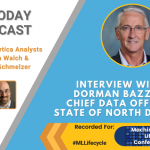
On the AI Today podcast we often discuss how AI is being applied at the federal level. However many states are also applying automation and AI technologies as well. In the episode of the AI Today podcast we interview Dorman Bazzell, Chief Data Officer for the state of North Dakota. He shares with us some of the unique challenges around data, data science and data privacy at the state level.
AI Today Podcast: Machine Learning Lifecycle 2021 Conference Preview

In this episode of the AI Today podcast we wanted to highlight our upcoming Machine Learning Lifecycle 2021 Conference taking place Jan 26-28, 2021. The 5 main areas of focus for sessions and content during the conference include: ML Model Development, ML Model Management, ML Operations (MLOps), ML Model Governance, and General Sessions Related to the ML Lifecycle.
AI Today Podcast: A Look Back at AI in 2020

With 2020 quickly (thankfully) fading into the rear view mirror it’s time to reflect on the year that was including looking at our predictions for 2020 and see how accurate they were, some of the big AI news, use cases and activity. In this podcast hosts Kathleen Walch and Ron Schmelzer discuss some of the big newsmakers and insights from this year in the world of AI as well as some of the highlight episodes from 2020.
Continue reading AI Today Podcast: A Look Back at AI in 2020 at Cognilytica.
AI Today Podcast: Machine Learning (ML) Platforms 2020 – A Market Update

Machine learning systems are core to enabling each of the seven patterns of AI. Machine learning platforms facilitate and accelerate the development of machine learning models by providing functionality that combines many necessary activities for model development and deployment. In this podcast, hosts Kathleen Walch and Ron Schmelzer share high level details for the recent ML Platforms Report 2020 report.
AI Today Podcast: AI in Pharma, Interview with Subroto Mukherjee, Head of Innovation and Emerging Technology, Americas at GlaxoSmithkline Consumer Healthcare

Artificial Intelligence (AI) is rapidly transforming the pharmaceutical and health care industries. No doubt with the recent global pandemic AI and machine learning is being put to use in the fight against the pandemic. In this episode of the AI Today podcast hosts Kathleen Walch and Ron Schmelzer interview Subroto Mukherjee, Head of Innovation and Emerging Technology, Americas at GlaxoSmithkline Consumer Healthcare.
AI Today Podcast: Energy Sector Adoption of AI, Interview with Dr. Satyam Priyadarshy, Technology Fellow and the Chief Data Scientist at Halliburton

The energy sector has long used data methods and various technologies to make processes more efficient. However, in heavily regulated industries such as the energy industry there can be some unique challenges to technology adoption. In this episode of the AI Today podcast hosts Ron Schmelzer and Kathleen Walch interivew Dr. Satyam Priyadarshy, who is Technology Fellow and the Chief Data Scientist at Halliburton.
AI Today Podcast: AI in Hungary, Interview with Gergely Szertics
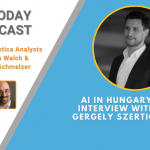
The pace of worldwide AI adoption continues to accelerate. AI is transforming just about every single industry and transforming the way humans work, live, and interact with each other. It’s no surprise then that countries see this technology as so important they are creating their own country level AI strategies. In this episode of the AI Today podcast hosts Kathleen Walch and Ron Schmelzer interview Gergely Szertics who is leading the transformative programs in the AI strategy for Hungary.
Continue reading AI Today Podcast: AI in Hungary, Interview with Gergely Szertics at Cognilytica.
AI Today Podcast: Ethics, Transparency, and AI Policy at the Department of Defense (DoD) – Interview with Alka Patel, Head of AI Ethics Policy at the Joint AI Center (JAIC)

The US Department of Defense (DoD) takes the topics of topics of Ethics, transparency, and Ethics Policy very seriously. A few years ago the DoD stood up the Joint Artificial Intelligence Center, also referred to as the JAIC, to help figure out how to best move forward with this transformative technology. In this episode of the AI Today podcast hosts Kathleen Walch and Ron Schmelzer interview Alka Patel, who is Head of AI Ethics Policy at Department of Defense, Joint AI Center.
AI Today Podcast: What is GPT-3 and why is it important?

You may have seen headlines in the news about GPT-3. But, what exactly is it, and, why is it important? In this episode of the AI Today podcast hosts Kathleen Walch and Ron Schmelzer discuss what GPT-3 is, how it came about, what we can do with it, and the future of GPT-3.
Show Notes:
- GPT-3 Creative Fiction
- GPT-3 Examples
- List of free sites/programs that are powered by GPT-3 and can be used now without a waiting list
Continue reading AI Today Podcast: What is GPT-3 and why is it important? at Cognilytica.
AI Today Podcast: AI at the GSA, interview with Emily Murphy, Administrator of the General Services Administration (GSA)

The General Services Administration (GSA) has been a very forward thinking agency in the US Federal Government. In this episode of the AI Today podcast hosts Kathleen Walch and Ron Schmelzer interview Emily Murphy, Administrator of the General Services Administration (GSA). She shares with us how is AI helping with GSA’s mission, what role the Center of Excellence is playing at the GSA, and some of the unique opportunities the public sector has around AI.
AI Today Podcast: AI and Healthcare, Interview with Gil Alterovitz, Director of AI at the Department of Veterans Affairs (VA)

AI technologies have been positively impacting a number of industries, and medicine and healthcare is one of these such industries. In this episode of the AI Today podcast hosts Kathleen Walch and Ron Schmelzer interview Gil Alterovitz, Director of Artificial Intelligence at the Department of Veterans Affairs (VA). He shares how how AI is impacting the VA, details about recently created the National Artificial Intelligence Institute at the VA, and how AI will provide benefits to veterans.
AI Today Podcast: The Importance of Data Harmonization, Interview with Shiv Misra at CVS Health

Over the last decade, data and analytics has grown to be more than just a quantitative support function. In this episode of the AI Today we interview Shiv Misra who is the Head of Medicare Retention Analytics at CVS Health. He has a very diverse background working at multiple large organizations. He shares with us how these various companies have approached data, some of the insights and challenges for dealing with data and AI from a healthcare and insurance perspectives, and more.
AI Today Podcast: How Data Privacy is Impacting AI – Interview with Rajeev Sambyal, BNY Mellon

Data is increasingly playing an important role at organizations, and especially financial institutions. Data privacy is increasingly becoming an important topic and something that should be considered through all stages of the data lifecycle and ML model lifecycle. In this episode of the AI Today podcast we interview Rajeev Sambyal who is Director, Artificial Intelligence and Innovation at BNY Mellon.
AI Today Podcast: How AI is Transforming E-Commerce: Interview with Khalifeh Al Jadda, Director of Core Data Science at The Home Depot

Retailers are turning to artificial intelligence and data science to help solve challenging E-commerce problems. From product recommendation systems to logistics and supply management, AI is helping in a variety of ways. In this AI Today podcast episode we interview Khalifeh Al Jadda, Director of Core Data Science at The Home Depot. He shares with us how The Home Depot is using data science, AI, and ML to help solve challenging e-commerce problems for HomeDepot, some opportunities retail operations face when it comes to AI adoption, as well as some of the challenges involved.
AI Today Podcast: AI at the state level: Interview with Carlos Rivero, Chief Data Officer for the Commonwealth of Virginia
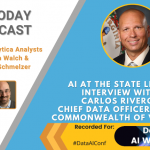
On the AI Today podcast we often discuss how AI is being applied at the federal level. However many states are also applying automation and AI technologies as well. In the episode of the AI Today podcast we interview Carlos Rivero, Chief Data Officer for the Commonwealth of Virginia. He shares will us how automation, advanced data analytics, and AI play an increasing role in state government, some unique challenges around data at the state level, some interesting or surprising insights you can share about how Virginia is using ML and AI and more.
AI Today Podcast: Automating Data Collection: Interview with Shariq Ahmad, Head of Technology for Morningstar’s Data Collection group

Morningstar has been forward thinking in their use of artificial intelligence and machine learning to enhance various processes. In this episode of the AI Today podcast we interview Shariq Ahmad, Head of Technology for Morningstar’s Data Collection group. He shares with us how Morning is automating data collection, lessons learned along the way, as well as insights on responsible AI.
AI Today Podcast: Humanizing Privacy and Ethics: Interview with Shyamala Prayaga, Autonomous Digital Assistant Vision Lead at Ford
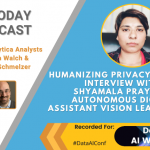
Voice assistants are increasingly becoming a part of our everyday lives. It should come as no surprise then that one of the visions for voice assistants is to bring voice applications to vehicles. In this episode of the AI Today podcast hosts Kathleen Walch and Ron Schmelzer interview Shyamala Prayaga, Autonomous Digital Assistant Vision Lead at Ford.
AI Today Podcast: AI at the City Level, Interview with Dan Hoffman, Assistant City Manager of Gainesville, FL

It’s so surprise that the Federal Government is adopting AI. However it’s often less talked about how AI is being adopted at the state and local level. In the episode of the AI Today podcast we interview Dan Hoffman, Assistant City Manager for the City of Gainesville. He shares will us how automation, advanced data analytics, and AI play an increasing role in local government, some unique challenges local governments face with implementing AI solutions and attracting AI talent, and more.
AI Today Podcast: AI’s Long History At Dept. of Energy, Interview with Cheryl Ingstad, Director, Artificial Intelligence & Technology Office

The United States Department of Energy (DOE) has a long history with AI. As the first Director of the Artificial Intelligence & Technology Office (AITO) within the DOE, Cherly has been helping to develop, deliver and manage AI technologies in support of DOE with over 600 AI projects currently in place. In this podcast we explore how AI is impacting the DOE, their perspective on ethics and responsible use of AI, how the DOE is engaging industry and private sector in their AI efforts, and more.
AI Today Podcast: The Human Side of Data for AI, interview with Jad Abou Maarouf, Chief Data Officer

For many years banks have been at the forefront of using technology to help with many operations and processes. In this episode of the AI Today podcast we interview Jad Abou Maarouf who is Chief Data Officer at a regional mid-atlantic bank. He shares with us how banks are thinking about using automation and AI and more.
AI Today Podcast: AI and ML For Fraud Detection & Risk – Interview with Rajat Jain, VP Fraud & Risk Management, American Express

American Express has been very forward thinking with their use of AI, in particular around pattern and fraud detection. In this episode of the AI Today podcast we interview Rajat Jain who is Vice President and Global Head for Identity and Authentication Strategy at American Express. He shares with us how machine learning can be applied successfully to detect and catch fraud, how AI and machine learning are being used for the overall customer experience at American Express, and some surprising insights about AI adoption.
AI Today Podcast: The Human Side of Data for AI, interview with Jad Abou Maarouf, Chief Data Officer
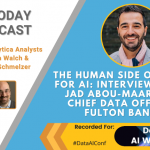
For many years banks have been at the forefront of using technology to help with many operations and processes. In this episode of the AI Today podcast we interview Jad Abou Maarouf who is Chief Data Officer at a regional mid-atlantic bank. He shares with us how banks are thinking about using automation and AI and more.
AI Today Podcast: Interview with Branka Panic, Founder and Executive Director at AI for Peace

AI can be an immense helping tool in augmenting human capabilities to tackle some of the world’s greatest challenges. However, as organizations and governments look to increasing use and adopt AI for a variety of different use cases it’s important to have discussions around the ethics of AI and make sure these systems are being used for good.
AI Today Podcast: Data for AI Conference Preview

For people who have been following our podcast, you know that data is a central part to AI. Many of our listeners and Cognilytica clients need help around the Data life cycle including Data Engineering, Data Preparation, Data Labeling & Annotation, Sourcing Data and Data Generation for AI. We’re running The Data For AI Conference Week, taking place September 14-18, 2020, to address all this.
Continue reading AI Today Podcast: Data for AI Conference Preview at Cognilytica.
AI Today Podcast: How AI Is Being Applied In Banking

In this episode of the AI Today podcast we explore various ways that banks are adopting AI technologies.
Continue reading AI Today Podcast: How AI Is Being Applied In Banking at Cognilytica.
AI Today Podcast: How AI is Being Applied to the Stock Market – Use Case Series

Recently, adoption of AI in financial trading has seen a significant uptick. Wealth managers are using AI to help serve more clients. Traders are using AI and augmented intelligence tools to gain slight market advantages. And many are starting to see some real value gains from using AI. In this episode of the AI Today podcast hosts Kathleen Walch and Ron Schmelzer dig deeper into how AI is impacting the stock market and trading floor.
AI Today Podcast: The 2020 State of AI – Interview with Wilson Pang, CTO at Appen

2020 has been an interesting year to say the least. In the episode of the AI Today podcast we interview Wilson Pang, who is the CTO at Appen. He shares with us findings from Appen’s “2020 State of AI report” including where organization’s feel they are on their AI adoption journey, why an increasing number of enterprises are getting behind responsible AI as a component to business success, and how COVID-19 has impacted organization’s adoption of AI.
AI Today Podcast: Is Artificial General Intelligence Coming Soon? Interview with Dr. Ben Goertzel, Founder & CEO, SingularityNET

Many in the industry have varying views about AGI, and if or when it will ever be achieved. On this episode of the AI Today podcast we interview Dr. Ben Goertzel, CEO & Founder of the SingularityNET Foundation. He shares he views on where industry and academic research right now in terms of realizing the goals of Artificial General Intelligence (AGI), what are some of the barriers right now to AGI research and adoption, and more.
AI Today Podcast: AI Center of Excellence in the US Federal Government – Interview with Neil Chaudhry, GSA

The US Federal Government has made AI a priority and many agencies are pushing forward with their AI efforts. On this episode of the AI Today podcast we interview Neil Chaudhry who is Director, AI Implementations at the AI Center of Excellence within the General Service Administration (GSA). He shares with us how adoption of new technologies such as AI can bring about unique challenges, why trustworthy and transparent AI is important to gain citizen trust in AI systems, and more.
AI Today Podcast: What’s Happening with Robotics?

Intelligent, Autonomous robots have long been the dream of science fiction with shows and movies alike showing robots interacting and working with humans. However, despite this dream the current reality of robots is quite different. In this podcast hosts Kathleen Walch and Ron Schmelzer share the current state of robotics, dig into why many robotics companies are going under, and a look to the future.
Continue reading AI Today Podcast: What’s Happening with Robotics? at Cognilytica.
AI Today Podcast: Digitization, Digitalization, and how this fits into AI

At first glance, it may seem that digitization has nothing to do with AI. However, digitization is a necessary first step to extracting value from data that is locked in non-digital assets or human-based processes. In this podcast hosts Kathleen Walch and Ron Schmelzer discuss digitization, digitalization, and how this fits into the world of AI including sharing some surprising findings about where organizations and governments are today on their journey towards digitization.
AI Today Podcast: Where Are We With Machine Translation?
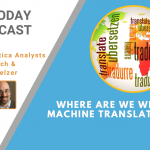
While the concepts behind machine translation are fairly easy to grasp, the process of actually doing fully automated language translation is extraordinarily complex. So, where does the industry stand with regards to machine translation? In this podcast hosts Kathleen Walch and Ron Schmelzer dig deeper into this topic discussing the evolution of machine translation, exploring the current state of the art around machine translation, and why it’s such a hard problem to solve.
Continue reading AI Today Podcast: Where Are We With Machine Translation? at Cognilytica.
AI Today Podcast: AI Center of Excellence in the US Federal Government – Interview with Krista Kinnard, GSA

If you’ve been following our podcast and research, it should come as no surprise that the US Federal Government is making AI a priority. On this episode of the AI Today podcast we have Krista Kinnard who is Director, Artificial Intelligence Center of Excellence at Technology Transformation Services (TTS) at the General Services Administration (GSA).
AI Today Podcast: Insights into AutoML – Interview with Jorge Torres, Founder and CEO at MindsDB

AutoML tools are becoming more widely adopted and changing the way companies use AI. In this episode of the AI Today podcast we interview Jorge Torres, Founder and CEO at MindsDB. He shares with us how AutoML is helping accelerate machine learning model development, the trend that Developers are becoming the new Data Scientists, some of the challenges companies face adopting AutoML tools and more.
AI Today Podcast: Global Perspectives on AI – Interview with Anton van den Hengel at University of Adelaide in Australia

AI continues to be used to enhance the human experience through art, music, language and other aspects. Researchers at the University of Adelaide in Australia recently created the MURMUR project, the world’s FIRST AI Art Exhibit Space. In this episode of the AI Today podcast we interview Anton van den Hengel, a professor at the University and a creator of the MURMUR project to discuss how this project came about, additional research projects, why AI is so hot in Australia right now.
AI Today Podcast: Advancing intelligent automation: Interview with Chris, AVP, Federal, UiPath
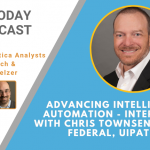
As people, companies, and governments are being asked to do more with less people, automation is playing an increasingly role is handling tasks and helping keep things on schedule. In this episode of the AI Today podcast we interview Chris Townsend who is Area Vice President, Federal at UiPath. He shares with us how automation and RPA is helping deal with significant shifts in the way that the world works, interactions with companies and governments, and changes in global supply chains.
AI Today Podcast: AI at LinkedIn – Interview with Igor Perisic, Chief Data Officer (CDO) and VP of Engineering
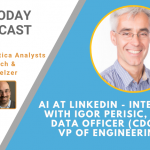
LinkedIn has been at the cutting edge of AI for many years and uses AI in many ways users may not be aware. In this episode of the AI Today podcast we interview Igor Perisic, Chief Data Officer (CDO) and VP of Engineering at LinkedIn. He shares with us how LinkedIn is applying AI and how it’s enhancing the user experience, how data regulations such as GDPR and California’s Consumer Privacy Act impact data used for your AI-enabled systems, and more.
AI Today Podcast: AI Changing the Workforce, Interview with Valerio De Stefano

It’s no surprise that AI will have an impact on the workforce from chatbots, recognition systems, or predictive analytics tools. But what happens when workplaces require employees to use tools that collect data on them such as facial recognition technology? In this podcast we interview Valerio De Stefano, Professor of Labour Law at KU Leuven to discuss how AI will broadly impact the workforce.
AI Today Podcast: Detecting Emotion Through Gait – Interview with Aniket Bera, Assistant Research Professor in Computer Science at University of Maryland GAMMA lab

Humans have long dreamed of machines that could function and perform just like other humans. However, giving machines emotional IQ has been an incredibly hard problem to solve. Aniket Bera and his team of researchers had the idea to create AI systems that can detect emotion based on gait. The applications for this type of robot can be seen in many industries including healthcare, law enforcement, and others especially in the time of social distancing.
AI Today Podcast: AI in the US Federal Government – Interview with Suzette Kent, US Federal CIO

The US Federal Government has made AI a priority. In this podcast we interview Suzette Kent who is the US Federal Chief Information Officer (CIO) to discuss how the US government will adopt AI across agencies, how they will address the need to reskill and upskill the workforce, and what the US needs to do to remain a leader in AI.
AI Today Podcast #139: AI & Entrepreneurship in the US Air Force: Interview with Mark Rowland, AFWERX

A few years ago the US Air Force created AFWERX to find new efficiencies in policy and processes and improve Air Force culture. To date there have been some interesting outcomes and technologies that have come through the AFWERX program. In this podcast we interview Mark Roland, Innovation Actualizer at AFWERX Vegas to share his insights on this program, how it’s helping the Air Force, and more.
AI Today Podcast #138: Interview with Oki Mek, Special Advisor, HHS

The US Department of Health & Human Services (HHS) has been very forward thinking in their adoption of transformative technologies including AI and block chain. In this podcast we interview Oki Mek, Senior Advisor to HHS CIO at HHS. He shares with us various ways HHS is adopting and implementing AI, how adoption of new technologies in the public sectors differs from the private sector, and explains the HHS Reimagine project.
Continue reading AI Today Podcast #138: Interview with Oki Mek, Special Advisor, HHS at Cognilytica.
AI Today Podcast #137: ML Ops in Practice: Interview with Seth Clark, Modzy

While much of the attention up until now has been focused on the development of machine learning models, as the industry moves from innovators and early adopters to the early majority, new customers will be more concerned about consuming third party models and building on top of existing best practices rather than building their own from scratch.
AI Today Podcast #136: ML Model Management and Operations (“ML Ops”)

Machine Learning Model Operationalization Management, referred to as “MLOps”, is focused on the lifecycle of model development and usage, machine learning model operationalization, and deployment. Cognilytica recently published a report on this topic that examines the ML Operationalization Management market, provides visibility into emerging best practices in the MLOps space, identifies open source and commercial vendor solutions, and provides a forecast for the growth of the overall market for solutions and products focused in this space.
AI Today Podcast #135: Special Episode on How AI is Helping to Fight the Global Pandemic

COVID-19 is quickly changing the way people work, live, and interact with others. Social distancing is now becoming the norm and many workers who once went into an office are now working remotely. How can AI help us in a time of global crisis? In the special episode hosts Kathleen Walch and Ron Schmelzer spend time discussing how AI can help detect COVID-19, fight COVID-19, help remote workers, and help predict the global economic impact this virus is having.
AI Today Podcast #134: International Efforts around Use of AI – Interview with Karine Perset, OECD

A little over a year ago the OECD released their AI principles and most recently, in February 2020 the OECD launched the AI Policy Observatory. In the podcast we interview Karine Perset from OECD. She shares why creating international principles around AI is important, why the OECD launched the ONE AI Network of Experts, and where she sees the future of AI headed.
AI Today Podcast #133: Challenges of Managing ML Models: Interview with Luke Marsden, Dotscience
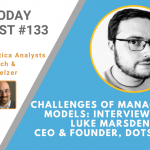
As companies move from building models to buying models the focus shifts from tooling and platforms focused solely on model development to tools and platforms focused on the overall usage, consumption, and management of models. Machine Learning Model Operationalization Management, referred to as “MLOps”, is focused on the lifecycle of model development and usage, machine learning model operationalization, and deployment.
AI Today Podcast #132: Where is AI Heading? Interview with Nick Thompson, Editor-in-Chief, Wired
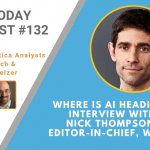
AI is impacting just about every industry and no one has seen that more than publications who cover AI. Cognilytica analysts Kathleen Walch and Ronald Schmelzer interview Nick Thompson, Editor in Chief at Wired. He discusses how the Wired audience has evolved over the past few years with regards to their understanding of AI, where he sees the industry right now with regards to ethical AI, how worldwide adoption of AI can vary across regions and countries especially with regards to China and the US, and more.
AI Today Podcast #131: AI Around the World: Strategies, Laws, and Regulations (2020)

The pace of worldwide adoption continues to accelerate. Not only are companies and researchers competing with each other for advantage in the world of artificial intelligence and machine learning, so too are entire countries. In this podcast, Cognilytica analysts Kathleen Walch and Ronald Schmelzer go over research on how different countries are approaching AI and their different legal and regulatory postures.
AI Today Podcast #130: Future of Cognitive Automation: Interview with Manish Rai, VP, Automation Anywhere

While the Robotic Process Automation (RPA) market is heating up, there are many that say that RPA is not AI per se, but rather a gateway on the path to cognitive automation. Automation Anywhere certainly agrees with this perspective, and in this interview, Manish Rai, VP of Product Marketing at Automation Anywhere shares insights into the RPA industry, the overlap with AI efforts, the new release around autonomous process discovery bots, and the future of cognitive automation.
AI Today Podcast #129: Interview with Colin Angle, Robotics Luminary, Chairman, CEO and Founder of iRobot

In this episode of the AI Today podcast we interview Colin Angle, Chairman, CEO and Founder of iRobot. He shares with us his thoughts on why autonomy is not intelligence, some exciting use cases and examples of robots he’s seen, and how customers have started to become more comfortable with robots inside their homes over the past 30 years.
AI Today Podcast #128: Global AI Adoption Trends
AI Today Podcast #127: AI in Legal

The legal profession is largely the domain of humans. However, despite the very human nature of the legal profession, artificial intelligence is increasingly making waves in the industry, enhancing legal processes and activities in ways that are not possible with humans alone. In this podcast hosts Kathleen Walch and Ron Schmelzer discuss ways that AI is impacting the legal profession.
Continue reading AI Today Podcast #127: AI in Legal at Cognilytica.
AI Today Podcast #126: Autonomous Retail

One of the most remarkable trends in artificial intelligence is the movement to autonomous retailing, which is the use of unmanned and cashier-less retail operations. In this AI Today podcast hosts Kathleen Walch and Ron Schmelzer discuss key players in the autonomous retail market, how these stores are changing the retail experience, and how this trend will impact jobs.
Continue reading AI Today Podcast #126: Autonomous Retail at Cognilytica.
AI Today Podcast #125: Emma – Immigration Chatbot: Interview with Courtney Winship, US Citizenship and Immigration Service (USCIS)

Government agencies are increasingly looking to use AI powered chatbots to help users and citizens more quickly get to the information they seek and increase the overall user experience. In this episode of the AI Today podcast we interview Courtney A. Winship, Chief of the Digital Services Division in the Office of Citizenship and Applicant Information Services at U.S.
AI Today Podcast #124: Semi-Supervised and One-Shot learning

Increasingly, we’ve seen some moves to combine different aspects of machine learning approaches together. What if we could find a way to train supervised learning approaches using less data? In this podcast hosts Kathleen Walch and Ron Schmelzer will explore Semi-Supervised and One-Shot learning. We’ll define what it is, why it can be helpful, and possible use cases.
Continue reading AI Today Podcast #124: Semi-Supervised and One-Shot learning at Cognilytica.
AI Today Podcast #123: AI and the Environment
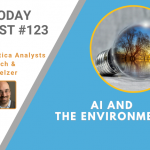
AI is playing an increasing role in helping researchers and conservationists identify and address the impacts of climate change on our planet. However, it’s also very compute and resource intensive contributing to carbon emissions. In this episode of the AI Today podcast we discuss the good, bad, and ugly of AI and it’s impact on the environment.
Continue reading AI Today Podcast #123: AI and the Environment at Cognilytica.
AI Today Podcast #122: The Good, Bad, and Ugly of Facial Recognition

Facial recognition technology is still an area in AI that brings about mixed emotions. While there can be positive use cases for the technology such as enhanced convenience like checking into flights with just your face or helping law enforcement find missing persons or criminals, there are also many potential misuses for the technology as well including bias in systems misidentifying people and criminals using the technology for malicious reasons.
AI Today Podcast #121: 2020 AI Predictions

AI has continued at its unrelenting pace of adoption, investment and growth in both the private and public sectors. In this podcast hosts Kathleen Walch and Ron Schmelzer share their predictions for where AI will make waves in 2020 including the growth of model-as-a-service, Machine learning ops (MLOps) systems, the continued focus on responsible and ethical AI as well as increased awareness around data usage.
Continue reading AI Today Podcast #121: 2020 AI Predictions at Cognilytica.
AI Today Podcast #120: A Look Back at 2019 AI News Makers
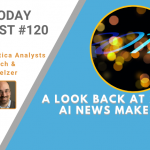
With 2019 quickly fading into the rear view mirror it’s time to reflect on the year that was including some of the year’s biggest AI news headlines, AI use cases and activity. In this podcast hosts Kathleen Walch and Ron Schmelzer discuss some of the big newsmakers and insights from this year in the world of AI.
Continue reading AI Today Podcast #120: A Look Back at 2019 AI News Makers at Cognilytica.
AI Today Podcast #119: Interview with Michael Feindt, JDA

AI in impacting just about every industry and e-commerce, retail, and supply chain management is no exception. In this AI Today podcast we interview Professor Dr. Michael Feindt, Strategic Advisor at JDA and Founder of Blue Yonder. He shares his insights into use cases for AI in retail/eCommerce space and beyond, how companies that are new on their AI journey can begin to adopt AI, and more.
Continue reading AI Today Podcast #119: Interview with Michael Feindt, JDA at Cognilytica.
AI Today Podcast #118: Interview with Alex Measure, BLS

Federal agencies are looking for potential AI use cases that can be implemented today and deliver real value. In this episode of the AI Today podcast we interview Alex Measure, Economist at Bureau of Labor Statistics. He shares with us how he incorporated AI into BLS as well as some of the unique challenges that the federal government has around data usage that could be obstacles for agencies looking to use AI.
Continue reading AI Today Podcast #118: Interview with Alex Measure, BLS at Cognilytica.
AI Today Podcast #117: AI in Javascript: Interview with Infinite Red

Machine learning models can be operationalized anywhere and we’re getting to a point now where it’s actually possible to do a lot with Javascript in your browser. In this episode of the AI Today podcast we interview Gant Laborde, Chief Innovation Officer at Infinite Red. He discusses how he has seen this transformation evolve over the past year, which industries are seeing the most AI adoption, and how companies can get started with AI projects.
AI Today Podcast #116: AI and Procurement in the Federal Government: Keith Nakasone, GSA
AI Today Podcast #115: AI, Navy, and the OODA Loop: Interview with Mark Logic

The public sector, both civilian and defense agencies, have a lot to gain from AI, from predictive analytics to autonomous systems such as unmanned drones, and even logistics management. In this podcast we interview Brigham Bechtel, Chief Strategy Officer, Intelligence and Defense at MarkLogic to discuss how government, and in particular the Navy, is using AI to help with mission success.
AI Today Podcast #114: Patterns of AI – Predictive Analytics / Decision Support

In this episode of the AI Today podcast hosts Kathleen Walch and Ron Schmelzer dig deeper into the Predictive Analytics / Decision Support pattern of AI. This pattern uses machine learning and other cognitive approaches to understand how learned patterns can help predict future outcomes or help humans make decisions about future outcomes using insight learned from behavior, interactions, and data.
AI Today Podcast #113: International AI Standards: Interview with Adam Murray, US Dept. of State

One area that’s heating up is the idea of responsible AI. In this episode of the AI Today podcast we interview Adam Murray from the U.S. Department of State in the Office of International Communications and Information Policy. He shares how the United States seeks to advance internationally our domestic approach to technology policy, particularly when it comes to responsible AI.
AI Today Podcast #112: Patterns of AI – Autonomous Systems

In this episode of the AI Today podcast hosts Kathleen Walch and Ron Schmelzer dig deeper into the Autonomous Systems pattern of AI. Autonomous systems are defined as systems that are able to accomplish a task, achieve a goal, or interact with its surroundings with minimal to no human involvement. This is applied both to physical, hardware autonomous systems as well as software or virtual autonomous systems (software “bots”).
Continue reading AI Today Podcast #112: Patterns of AI – Autonomous Systems at Cognilytica.
AI Today Podcast #111: Secure & Reliable AI, Interview with Bob Gourley, OODA LLC

In this podcast, Cognilytica analysts Kathleen Walch and Ronald Schmelzer interview Bob Gourley, CTO of OODA LLC, publisher of CTOVision and OODAloop.com. We discuss the opportunities and risks of AI as well as talk about the relationship between AI and cybersecurity and ways to deal with the security and reliability of AI.
We recorded this podcast live at the AI World Government event in Washington, DC June 24-26, 2019.
AI Today Podcast #110: Patterns of AI – Patterns & Anomalies

In this episode of the AI Today podcast hosts Kathleen Walch and Ron Schmelzer dig deeper into the Patterns & Anomalies pattern of AI. The primary objective of this pattern is to find which one of the things is like the other and which is not. Example use cases include fraud detection and risk analysis, discovering patterns among data and surfacing insights, automatic error detection or correction, intelligent monitoring, finding hidden groups of data, finding best matches to given data, predictive text, and similar applications.
Continue reading AI Today Podcast #110: Patterns of AI – Patterns & Anomalies at Cognilytica.
AI Today Podcast #109: Live at Amazon Re:MARS – Interview with Tom Soderstrom, Jet Propulsion Laboratory (JPL)

In this episode of the AI Today we interview Tom Soderstrom, IT Chief Technology and Innovation Officer at NASA Jet Propulsion Laboratory. He discusses how AI is being implemented at JPL, and then more specifically about what NASA is doing and how AI is being applied in space, both on other planets and here at home.
AI Today Podcast #108: Content Intelligence – Interview with Bill Galusha, VP Marketing at ABBYY

Content Intelligence solutions are now enabling enterprises to make unstructured content more valuable and equip digital workforces with the necessary skills and understanding to make intelligent business decisions. In this episode of the AI Today podcast we interview Bill Galusha, VP Marketing at ABBYY to discuss how content intelligence is helping organizations derive meaning and intent of documents, and add decision-making intelligence, use cases of how companies are successfully applying levels on content intelligence to their processes, and where he sees the future of AI taking corporations.
AI Today Podcast #107: Benchmarking the Voice Assistants 2.0

In this episode of the AI Today podcast hosts Kathleen Walch and Ron Schmelzer discuss results from Cognilytica’s Voice Assistant Benchmark 2.0. In this benchmark, Cognilytica evaluates the intelligence and knowledge graph capabilities of four voice assistants: Amazon Alexa, Google Assistant (Home), Apple Siri, and Microsoft Cortana. We want to know — just how intelligent is the AI back-end?
Continue reading AI Today Podcast #107: Benchmarking the Voice Assistants 2.0 at Cognilytica.
AI Today Podcast #106: Intelligent Automation in the Public Sector: Intelligent Automation in the Public Sector: Interview with Keith Nelson, Automation Anywhere

In this episode of the AI Today podcast we interview Keith Nelson who is Global Head, Public Sector at Automation Anywhere. He discusses the role RPA plays in moving public sector agencies up the ladder of intelligent automation, some interesting use cases he has seen, do’s and don’ts for agencies looking to get started with RPA and intelligent automation and more.
AI Today Podcast #105: State of AI Worldwide: Interview with Lindsey Sheppard, Center for Strategic & International Studies (CSIS)

Many countries have taken a strategic approach to AI. In this podcast, Cognilytica analysts Kathleen Walch and Ronald Schmelzer interview Lindsey Sheppard, Associate Fellow with the International Security Program at Center for Strategic & International Studies (CSIS) on the competitive, global race for AI dominance. She shares insights into how various countries seek to leverage AI, how countries are approaching concepts of AI ethics, responsibility, and governance, and more.
AI Today Podcast #104: Patterns of AI – Conversation / Human Interaction
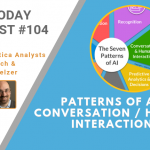
In this episode of the AI Today podcast hosts Kathleen Walch and Ron Schmelzer dig deeper into the Conversation / Human Interaction pattern. The objective of this pattern is machines interacting with humans the way humans interact with each other. We spend time in this podcast going over various use cases and how industry is using this pattern for things such as Chatbots, Voice assistants, Content generation, Sentiment / mood / intent analysis, and Machine Translation.
AI Today Podcast #103: Insights into AI’s future with Naveen Rao, Corporate VP & GM of AI Products group at Intel

In this episode of the AI Today podcast hosts Kathleen Walch and Ron Schmelzer interview Naveen Rao, Corporate Vice President and General Manager of Artificial Intelligence Products Group at Intel. He shares with us how various training tools have evolved over the past few years to help teams more quickly train and deploy AI models and how companies need to maintain and manage models as they move from the training phase to the inference phase.
AI Today Podcast #102: Live at Amazon Re:MARS – Robots in Service of the Environment (RSE)

Robots continue to be used in a variety of ways for useful and creative purposes. In this podcast, hosts Kathleen Walch and Ron Schmelzer interview Adam Cantor and Erika Angle from Robots in Service of the Environment (RSE). They share how underwater robots are helping control the invasive lion fish population, some of the technical challenges they encountered developing an underwater robot, and how they were able to transfer technology and knowledge from industry (particularly iRobot) to help make this robot a reality.
AI Today Podcast #101: Live at Amazon Re:MARS – Interview with Mobiquity

In this episode of the AI Today podcast we interview Jonathan Patrizio, Head of Technical Advisory and Alexa Evangelist at Mobiquity and Randy Sanborn, Principal Solutions Architect at Mobiquity. Both guests share how the market for voice assistants has evolved over the past five years, how organizations should approach conversational applications, and more.
This podcast was recorded live in person at the Amazon re:Mars event.
AI Today Podcast #100: Episode 100! Is AI Overhyped?

We have a special episode for you — #100! We’ve just entered the triple digits on episode numbers, so it’s worth celebrating. In this episode, we cover a number of hot topic issues around the question of whether or not AI is overhyped. We look at what’s happening with end-users in the enterprise and public sector, vendors, the $1B Microsoft investment in OpenAI, and what’s happening in the general ecosystem.
Continue reading AI Today Podcast #100: Episode 100! Is AI Overhyped? at Cognilytica.
AI Today Podcast #99: AI Adoption in the Government and Beyond – Interview Arti Garg – Cray

In this podcast, Cognilytica analysts Kathleen Walch and Ronald Schmelzer interview Arti Garg, Emerging Market and Technology Director at Cray to gain insights into how AI is being used and implemented in government and industry. She also shares insights into how companies should approach AI and how to select the best technology vendor from the 3,000+ vendors in the landscape to fit your needs and desired outcomes.
AI Today Podcast #098: Live at Amazon Re:MARS – Amazon Executive Interviews Provide Insights into Amazon’s Use of AI

For many years Amazon has been leading the way with using AI and machine learning in many parts of their business. In this podcast we interview three Vice Presidents to showcase various ways Amazon uses AI. Our guests include Roger Barga, General Manager, AWS Robotics, Srikanth Thirumalai, Vice President, Search, and Chuck Moore, Vice President, Alexa Shopping.
AI Today Podcast #97: Insights into AI Privacy, Ethics, and Regulations: Interview with Dr. Alvelda, CEO Brainworks

In this episode of the AI Today podcast hosts Kathleen Walch and Ron Schmelzer interview Dr. Philip Alvelda, CEO of Brainworks. He shares his thoughts on government’s role with regard to responsible and ethical AI, how new laws such as GDPR impact AI, whose role it is (companies or governments) to regulate AI, and more.
AI Today Podcast #096: Live at Amazon Re:MARS – Data Prep & Labeling: Interview with Dale Brown, Appen Figure Eight

In this episode of the AI Today podcast hosts Kathleen Walch and Ron Schmelzer interview Dale Brown, VP, Business Development & Operations at Figure Eight live in person at the Amazon re:Mars event. For those of our listeners that were not able to attend this event was June 3-7, 2019. Dale shares with us what organizations need to consider when trying to get a machine learning project off the ground and why high quality data matters for AI projects.
AI Today Podcast #95: AI Use Case Series — AI in Construction

Construction companies are increasingly using AI in a range of ways. From optimizing work schedules to improving workplace safety to keeping a secure watch on construction facilities, AI in the construction industry is already producing value. In this podcast hosts Kathleen Walch and Ron Schmelzer explore various ways AI is being used in the construction industry.
Continue reading AI Today Podcast #95: AI Use Case Series — AI in Construction at Cognilytica.
AI Today Podcast #94: Understanding the Goal-Driven Systems Pattern of AI

In this episode of the AI Today podcast hosts Kathleen Walch and Ron Schmelzer dig deeper into the Goal Driven systems pattern. The objective of this pattern is to find the optimal solution to a problem through trial and error. We spend time in this podcast going over various use cases and how industry is using this pattern for things such as roboadvising, Resource optimization, bidding and real-time auctions, and more.
AI Today Podcast #93: AI Ethics & Government: Interview with Mona Siddiqui US Department of Health & Human Services

In this episode of the AI Today podcast hosts Kathleen Walch and Ron Schmelzer interview Mona Siddiqui, Chief Data Officer, U.S. Department of Health & Human Services. Mona shares some insights into the use of AI and machine learning at HHS as well as how she sees AI playing a role with respect to healthcare, medicine, and improving people’s lives.
AI Today Podcast #92: AI Use Case Series — AI in Project Management

Enterprises are increasingly incorporating AI into their project management processes to make projects more strategic and to make better use of the data created by these processes. From AI chatbots, to intelligent bots that help automate project management duties such as project documentation and quality check activities, or AI-enhanced data visualization then helps identify bottlenecks and areas where process improvements or other changes can be applied to improve overall performance AI is being used to provide a lot of efficiencies.
Continue reading AI Today Podcast #92: AI Use Case Series — AI in Project Management at Cognilytica.
AI Today Podcast #91: The Present and Future of Data Science — Interview with Anthony Scriffignano, Senior Vice President & Chief Data Scientist at Dun & Bradstreet

In this episode of the AI Today podcast we interview Anthony Scriffignano , Senior Vice President & Chief Data Scientist at Dun & Bradstreet. We discuss The State of governance, big data, and ethics, and give a sneak preview of his talk at the upcoming AI World Gov event. He also shares his thoughts on the limitations of machine learning, and his insights on how organizations of all sizes can deepen their machine learning expertise and build data science skills.
AI Today Podcast #90: Understanding The Recognition Pattern of AI

Machine learning is great at identifying and understanding the real world and unstructured data. ML can identify and understand images, sound, items, handwriting, faces, and gestures. In this podcast hosts Kathleen Walch and Ron Schmelzer discuss various use cases in the recognition pattern on AI.
Show Notes:
- Recognition & Computer Vision Workshop & Certification
- CPMAI TRAINING & CERTIFICATION
Continue reading AI Today Podcast #90: Understanding The Recognition Pattern of AI at Cognilytica.
AI Today Podcast #89: AI in Law Enforcement — Use Case Series

Law enforcement is increasing seeing benefits from AI technologies including scanning video footage for anomalies, augmenting capabilities around surveillance and crowd control, transcribing audio, facial recognition technologies, and helping detect counterfeit items. Through AI, law enforcement agencies are enabled to do more than they ever could before to keep the peace, catch and identify and prevent threats before they occur, and speed up the time it takes to catch criminals and solve crimes.
Continue reading AI Today Podcast #89: AI in Law Enforcement — Use Case Series at Cognilytica.
AI Today Podcast #88: AI in the UK and Beyond – Interview with Lord Tim Clement-Jones

In this podcast we interview Lord Tim Clement-Jones, Former Chair of the House of Lords Artificial Intelligence Select Committee and Co-Chair of the All Party Parliamentary Group on Artificial Intelligence. We discuss ethical considerations governments need to address, possible laws and regulations that will need to be put into place around cognitive technologies, and how AI affects the labor market.
AI Today Podcast #87: AI Use Case Series — AI in Education

Learning is not a one size fits all approach — what works for one person, may not work for a peer. This is why vendors and those in the industry have seen such huge potential for AI technologies to assist with learning and education. It’s already transforming the way students learn, providing assistance to teachers and smoothing application and admissions processes.
Continue reading AI Today Podcast #87: AI Use Case Series — AI in Education at Cognilytica.
AI Today Podcast #86: Insights into Data Preparation and Labeling for AI

Garbage in is garbage out. Nothing is more true in the world of AI. The market for data labeling is growing and becoming very important as more and more companies need clean, accurate, well-labeled data for ML training. In this podcast we share key stats and insights from Cognilytica’s recent Data Engineering, Preparation, and Labeling for AI 2019 report including AI’s secret, the market for data prep solutions, and why garbage data in produces garbage out.
AI Today Podcast #85: The Seven Patterns of AI
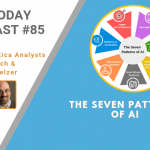
Cognilytica has spent a considerable amount of time on AI use cases and how different industries are using various AI and cognitive technologies and we’ve found that there are seven common patterns that seem to continuously show up in all these use cases. Some use cases use a single pattern for their application while others combine a few together.
Continue reading AI Today Podcast #85: The Seven Patterns of AI at Cognilytica.
AI Today Podcast #84: AI in Agriculture — Use Case Series
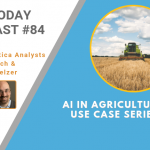
The agriculture industry is turning to AI technologies to improve a wide range of agriculture-related tasks in the entire food supply chain including help yield healthier crops, control pests, monitor soil and growing conditions, help reduce the workloads, and organize data for farmers. In this podcast, Cognilytica analysts Kathleen Walch and Ronald Schmelzer discuss how AI is being used in the agriculture industry.
Continue reading AI Today Podcast #84: AI in Agriculture — Use Case Series at Cognilytica.
AI Today Podcast #83: Interview with Madelene Stolpe, Head of Digital Strategy, Health, City of Oslo, Norway

In this podcast we interview Madelene Stolpe who is the Head of Digital Strategy, Health for the City of Oslo, Norway. We discuss how Oslo is exploring using AI technologies to help its citizens and also help move towards becoming a Smart Connected City, the role that AI plays with labor and employment and the future of jobs, and more!
AI Today Podcast #82: Interview Frank La Vigne and Andy Leonard with Data Driven Podcast
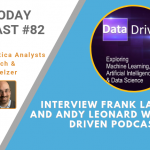
In this podcast we get the rare opportunity to interview fellow podcasters. Frank La Vigne and Andy Leonard are co-hosts of the Data Driven podcast and joined us on this episode of the AI Today podcast to discuss the important role data plays in AI, their take on how data will continue to be used into the future and the idea of pervasive knowledge.
AI Today Podcast #81: How AI Enhances Sales — Use Case Series
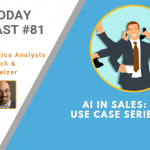
Sales are important for any organization. After all, if companies aren’t selling they are not generating revenue. Increasingly, enterprises are using AI in sales to improve their bottom lines. In this podcast, Cognilytica analysts Kathleen Walch and Ronald Schmelzer explain how AI, machine learning, and cognitive technologies are being applied to enhance the way sales is being done in the enterprise.
Continue reading AI Today Podcast #81: How AI Enhances Sales — Use Case Series at Cognilytica.
AI Today Podcast #80: AI in Mining — Use Case Series

Most of the resources we need to power our growing economies — oil, gold, copper, coal, and more– come from the ground underneath us. Modern mining operations are increasingly turning AI and machine learning technologies to help keep those resources flowing without risking human lives. In this podcast Cognilytica analysts explore various ways that AI technologies are being used in the mining industry.
Continue reading AI Today Podcast #80: AI in Mining — Use Case Series at Cognilytica.
AI Today Podcast #79: AI in Fashion — Use Case Series
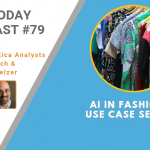
A lot goes into the clothes we wear, covering a spectrum of activities including designing, manufacturing, logistics, marketing and sales. It’s no wonder that fashion and clothing manufacturing firms are applying AI technologies to transform various steps throughout the process. In this podcast, Cognilytica analysts Kathleen Walch and Ron Schmelzer will discuss various ways AI is being used in the fashion industry.
Continue reading AI Today Podcast #79: AI in Fashion — Use Case Series at Cognilytica.
AI Today Podcast #78: AI in Customer Experience
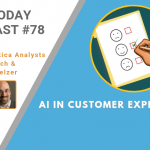
The fight for customer attention is fierce and companies are increasingly turning to technology to discover new ways to help. Artificial intelligence is playing a major role in creating connected customer experiences throughout the entire customer lifecycle. In this podcast hosts Kathleen Walch and Ron Schmelzer explore various ways AI is improving the customer experience.
Continue reading AI Today Podcast #78: AI in Customer Experience at Cognilytica.
AI Today Podcast #77: Hyperpersonalization – The Double-Edged AI Sword
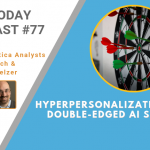
Across many industries and implementations, we see some recurring themes pop up in those use cases. In past podcasts we’ve talked about chatbots, autonomous vehicles, and aspects of natural language understanding, computer vision, and advanced robotics. In today’s AI podcast we want to talk about the concept of hypersonalization, a particular use case that’s applicable across a wide range of industries, but advertising in particular.
AI Today Podcast #76: Cognilytica’s Classification of the AI Vendor Ecosystem
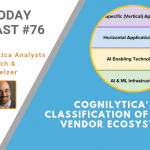
Cognilytica tracks almost 3000 companies that offer AI-specific or AI-enhanced products for sale in the market. However, as you can imagine, there’s a great amount of diversity in these vendors. Some vendors focus on providing low-level “enabling” infrastructure that supports any range of AI, machine learning, or other compute- or data-intensive activity. Others provide a single-industry application that applies AI to a particular, specific business or industry problem.
AI Today Podcast #75: AI in Oil & Gas: Interview with Tim Custer – Apache

In heavily regulated industries such as the energy industry there can be some unique challenges to technology adoption. In this podcast we interview Tim Custer, Senior Vice president – North America land, business development and real estate with Apache. We discuss how AI and ML technologies are being used to extract valuable information from unstructured content, how Apache is leveraging AI technologies to help with a variety of tasks such as contract review, some unique use cases for AI and ML technology, and more!
AI Today Podcast #74: Knowledge Graphs and AI, Interview with Chaitan Baru, UCSD

Knowledge graphs and other ways to encode the relationship between data concepts are putting common sense into AI and machine learning. In this podcast, we interview Chaitan Baru, Senior Advisor, Data Science Research Initiatives at University of California San Diego, and formerly serving a four year rotation at the National Science Foundation (NSF) where he helped with a number of initiatives including the Big Data program and Data Science-related activities.
AI Today Podcast #73: Tackling Transparent & Responsible AI – Interview with Steve Eglash, Director of Strategic Research Initiatives, Stanford University

One of the biggest challenges with AI is making sense of the decisions made by black box machine learning algorithms. In this episode of the AI Today podcast, hosts Kathleen Walch and Ronald Schmelzer interview Steve Eglash, Executive Director of Strategic Research Initiatives in the Computer Science Department at Stanford University to discuss Explainable AI, Responsible AI, and how to get AI systems to behave in a more testable, provable, and error-free way.
AI Today Podcast #72: Interview with Joel Hron, CTO, ThoughtTrace
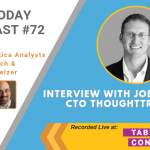
AI and machine learning are impacting just about every industry, and the oil and gas industry is no exception. AI and ML are helping companies with unstructured content and data, as well as augmenting human jobs without replacing them. Listen to this podcast as Cognilytica analysts Kathleen Walch and Ronald Schmelzer interview Joel Hron, CTO at ThoughtTrace, a company applying AI to processing documents many decades old.
Continue reading AI Today Podcast #72: Interview with Joel Hron, CTO, ThoughtTrace at Cognilytica.
AI Today Podcast #71: What does 2019 Have in Store for AI?
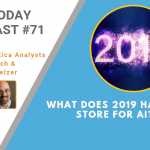
2018 proved to be a great year for AI-related technology and companies alike. We saw countries across the world adopt AI strategies, VC funding for AI focused startups go gangbusters, and industries of all types from retail, pharmaceutical, restaurants, logistics, healthcare and so many more benefit from AI technologies. If you haven’t heard our recap of 2018 AI related news makers and market shakers, you should definitely go and listen to that (after this podcast of course).
Continue reading AI Today Podcast #71: What does 2019 Have in Store for AI? at Cognilytica.
AI Today Podcast #70: 2018 — Cognilytica’s AI Year in Review
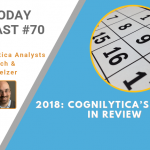
2018 is over and boy was it a crazy year! AI continued to show its strength in 2018, and certainly shows no signs of slowing as we make our way to 2019. In this podcast Cognilytica analysts look back on the year and reflect on some of 2018’s biggest AI news, trends and use cases.
Continue reading AI Today Podcast #70: 2018 — Cognilytica’s AI Year in Review at Cognilytica.
AI Today #69: Driving Digital Transformation through AI and Deep Learning
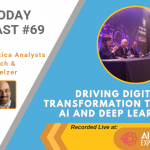
Cognilytica analyst Kathleen Walch recently moderated a panel in November 2018 on “Driving Digital Transformation through AI and Deep Learning”. The following recording is the live panel discussion. We discuss fundamental buildings blocks needed for building a digital organization, process changes brought about from AI technologies that companies of all sizes are adopting, examples of digital transformation projects that depend upon AI to succeed, and more!
AI Today Podcast #68: Interview with Catalina Herrera, Director of Education and Enablement, Thought Trace

AI and machine learning are being used in almost every industry, and the oil and gas industry is no exception. Want to know the various ways in which the oil and gas industry is adopting AI? Listen to this podcast as Cognilytica analysts Kathleen Walch and Ronald Schmelzer interview Catalina Herrera, Director of Education and Enablement at ThoughtTrace, a company applying AI to processing documents many decades old.
AI Today Podcast #67: AI in the museum: Interview with Kristi Delich, Deputy Director, Office of Visitor Services, Smithsonian Institution
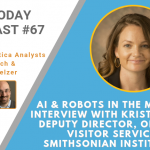
Robots are gaining adoption across a wide range of industries. Recently, the Smithsonian Institution has started to use Softbank Robotics’ Pepper robot to add value to the the visitor museum experience. In this podcast, Cognilytica analysts Ronald Schmelzer and Kathleen Walch interview Kristi Delich, Deputy Director, Office of Visitor Services, Smithsonian Institution on how Pepper is being used at the museum, potential future uses, and observations from how the general public interacts with a robot in a museum environment.
AI Today Podcast #66: AI & Robotics at Stanley black and Decker – Interview with Frank DeSantis, VP Breakthrough Innovation
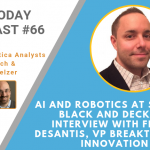
Curious how industrial technology companies are adopting Artificial Intelligence, robotics, and cognitive technology into their product lines and how these technologies help with innovation processes? In this podcast Cognilytica analysts Kathleen Walch and Ronald Schmelzer interview Frank DeSantis, VP of Breakthrough Innovation at Stanley, Black & Decker, Inc., and dig deeper into how AI and cognitive tech is changing the landscape for industrial goods and how these emerging technologies will change the way that consumers and business interact with physical devices and tools in the real world.
AI Today Podcast #65: Interview with Nick Vandivere, CEO, ThoughtTrace

Interested in knowing how AI and machine learning can process documents over a century old and still gain understanding from the text? Want to know how the oil and gas industry is adopting AI? Listen to this podcast as Cognilytica analysts Kathleen Walch and Ronald Schmelzer interview Nick Vandivere, CEO of ThoughtTrace, a company applying AI to processing documents many decades old.
AI Today Podcast #64: Common Sense and Natural Language Understanding – Interview with Catherine Havasi, Luminoso

Machines are able learn how to process images and text and extract intelligence from those images and text. But they still don’t understand the images of know the meanings of words. We’re still at the early days of AI with respect to common sense and real natural language understanding. In this podcast, Cognilytica analysts Kathleen Walch and Ronald Schmelzer interviewCatherine Havasi, Chief Strategy Officer of Luminoso on the current state of the art with Natural Language and what Luminoso is doing to move the industry forward.
AI Today Podcast #63: AI, AR, and VR: Interview with Mariana Acuna, Opaque Studios

Interested in the intersection of Artificial Intelligence, Augmented Reality (AR), and Virtual Reality (VR)? Curious how AI is being used in the entertainment, gaming, and media industries to enhance the overall experience? Listen to this podcast where Cognilytica analysts Kathleen Walch and Ronald Schmelzer interview Mariana Acuña Costa, Chief Product Officer and Co-founder of Opaque Studios as she shares insights into the use of AI in these various industries, how AI can help with content creation, how these industries with continue to adapt and more.
AI Today Podcast #62: AI in the Entertainment Industry – Interview with Hanno Basse, CTO, 20th Century Fox

Film, media, and entertainment industries are using AI and machine learning technologies to enhance and change the way that entertainment is produced, developed, and delivered. In this Cognilytica AI Today podcast, hear from Hanno Basse, Chief Technology Officer of 20th Century Fox Film Corp about how AI, machine learning, and cognitive technologies are forever changing the way that entertainment is being brought to the masses.
AI Today Podcast #61: AI in News & Journalism — Use Case Series
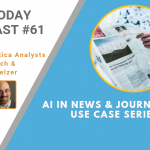
Did you know that many of the articles and news reports you are reading are generated by AI systems? Using natural language generation (NLG) and other techniques these AI systems are not only creating content, but they are helping to manage the editorial process, moderate comments, help with research, and support the entire journalistic process.
Continue reading AI Today Podcast #61: AI in News & Journalism — Use Case Series at Cognilytica.
AI Today Podcast #60: Interview with Nav Kesher, Head of Data Sciences, Facebook Marketplace Experience
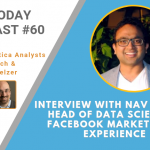
Social media is filled with lots and lots of content and most of it is unstructured data, meaning that it doesn’t fit into databases or rows and columns on a spreadsheet. In particular, lots of text, images, video and audio content is posted daily. In this podcast, Cognilytica analysts Kathleen Walch and Ronald Schmelzer interview Nav Kesher, Head of Data Sciences, Facebook Marketplace Experience on his insights and experience on AI and its various applications in different industries.
AI Today Podcast #59: The Tubman Project – Interview with Darrell Malone Jr.
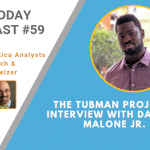
Public defenders in the United States are burdened with large workloads and ever-increasing piles of information they need to sort through. Additionally, they are deeply needed in an environment where defendants are unable to afford the legal protection they are entitled to under the rights of the constitution. This is one problem that AI and machine learning is promising to solve.
AI Today Podcast #057: Is VC Funding for AI Overheated?

Anyone observing the news can see that artificial intelligence and machine learning are getting lots of attention. As long as a startup has AI or cognitive technologies in their business plans or marketing material, they seem to get funding. And the amount of funding some of these startups are getting is eye-opening! So this makes us ask the question: Are we in a bubble?
Continue reading AI Today Podcast #057: Is VC Funding for AI Overheated? at Cognilytica.
AI Today Podcast #056: AI’s Strategic Importance: A Look at Different Countries
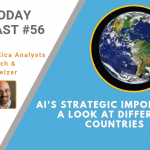
When people hear about the race for AI dominance, they often think that the main competition is between the US and China. The US and China do have most of the largest and most well funded AI companies on the planet, and the pace of funding, company growth, and adoption doesn’t seem to be slowing anytime soon.
AI Today Podcast #055: Autonomous Business Process (ABP)
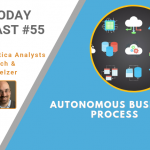
The big idea of AI and cognitive technologies is to address and tackle problems that require human cognitive capabilities. Many vendors in the RPA market are simply using AI as a marketing vehicle and are not fundamentally changing or improving the way business process is done. This is why companies looking to pursue the path of Intelligent Process Automation need to have the desired end state in mind: full autonomous business process (ABP).
Continue reading AI Today Podcast #055: Autonomous Business Process (ABP) at Cognilytica.
AI Today Podcast #054: Anniversary Podcast: Does AI Still Matter?
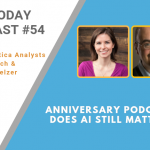
The AI Today podcast is celebrating our 1 year anniversary! With this, we wanted to revisit our first podcast topic “Does AI Matter?” as well as reflect on a year of great podcasts, awesome guests, and some thought provoking content.
In our inaugural podcast hosts Kathleen Walch and Ron Schmelzer discuss our reasons for Why AI Matters and we thought it was a great idea to go back and visit this topic again one year later.
Continue reading AI Today Podcast #054: Anniversary Podcast: Does AI Still Matter? at Cognilytica.
AI Today Podcast #053: The Three Fallacies of Conversational AI — Interview with Martin Reddy, PullString
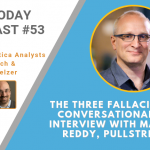
In recent years we have seen amazing advances in the field of conversational AI. Machine learning, and in particular deep learning, has been getting a lot of attention lately. But this is not always the best method when building conversational AI. In this podcast Cognilytica analysts interview Martin Reddy, Co-Founder and CTO at PullString. We discuss 3 fallacies related to conversational AI, why machine learning isn’t always the best approach to solving conversations problems, and how PullString Converse provides an easy to use conversation canvas allowing companies who might not have a technical team in-house to create voice apps.
AI Today Podcast #052: AI on the Campus — Interview with John Rome, Arizona State University
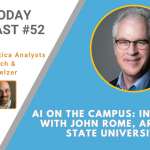
Arizona State University (ASU) is trying something very interesting: in addition to giving their incoming students the usual handbooks and orientation materials, they’re also giving some of them an Amazon Alexa device preloaded with ASU-specific skills. The results of this test are quite remarkable and might suggest that voice assistants could be the future of providing knowledge and interaction to users.
AI Today Podcast #051: Bringing AI to Lego — Interview with James Poulter
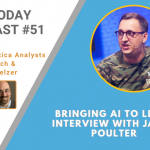
Artificial intelligence (AI) is making inroads into a wide range of industries, and there’s no exception even within the world of kid’s play. In this podcast, Cognilytica analysts Kathleen Walch and Ronald Schmelzer interview James Poulter, Head of Emerging Platforms and Partnerships at Lego. He explains how Lego is adopting AI in a wide range of ways including with its Alexa voice assistant skills and additional insights into adding elements of AI to the various Lego platforms, including Mindstorms and other play elements.
AI Today Podcast #050: Enhancing Experiences with AI – Interview with Tom Edwards, Epsilon Agency
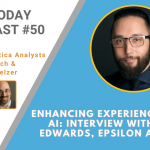
AI and cognitive technologies are enhancing many different industries and providing significant ROI for early adopters. However, AI is also providing benefit in improving our various experiences in life. In this podcast, Cognilytica analysts Kathleen Walch and Ronald Schmelzer interview Tom Edwards, Chief Digital & Innovation Officer at Epsilon Agency, who shares insights into how AI is impacting marketing, customer experience, and more.
AI Today Podcast #049: Surprising Results from the Cognilytica Voice Assistant Benchmark
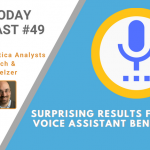
On July 31, 2018 Cognilytica released the latest iteration of the Cognilytica Voice Assistant Benchmark. Conversational interface-based devices are quickly taking off with devices and technology such as Amazon Alexa, Google Home, Apple Siri, Microsoft Cortana, and an increasing number of new entrants into the space. Cognilytica calls these devices “voice assistants”, rather than the less-useful term “smart speakers”.
AI Today Podcast #48: Pseudo AI – Faking it Till You Make it in AI
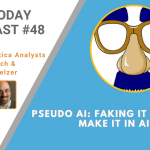
With the rise in popularity of AI has come the inevitable wave of those looking to take advantage of its popularity. Startups are beginning to realize that simply saying they have “AI” capabilities leads to increased valuations, greater attention, and more possibilities. But people are starting to get wise and it’s already starting to catch up with these firms.
Continue reading AI Today Podcast #48: Pseudo AI – Faking it Till You Make it in AI at Cognilytica.
AI Today Podcast #47: AI in Customer Service — AI Use Case Series
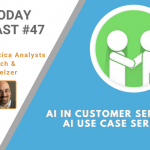
Artificial Intelligence is allowing companies to improve customer service in ways not possible before. Chatbots allow companies to have an always-on agent that can be integrated into customer support service teams to answer questions or help provide more relevant products and services based on customer preferences. AI enabled systems can help handle complicated, multi-step transactions that are often error-prone such as loan application or student applications or real estate.
Continue reading AI Today Podcast #47: AI in Customer Service — AI Use Case Series at Cognilytica.
AI Today Podcast #46: AI in the Back Office — AI Use Case Series
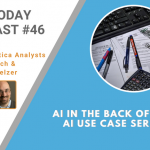
If you’re ever worked in an office you know that there is much to be improved with back office processes. It’s often discussed how AI can help the front office, but it’s doing just as much to improve back office operations as well. AI can be a smart, augmented assistant that can help enhance data, provide research, and collect valuable information.
Continue reading AI Today Podcast #46: AI in the Back Office — AI Use Case Series at Cognilytica.
AI Today Podcast #45: AI and Blockchain in Government: Interview with Jose Arrieta, US Department of Health & Human Services (HHS)
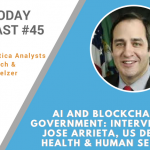
Many governments worldwide are looking at using Artificial Intelligence (AI) and other cognitive technologies as part of making their operations more efficient, better serving their citizens, and increasing the range of ways they can meet their missions. In this podcast, Cognilytica analysts Kathleen Walch and Ronald Schmelzer interview Jose Arrieta, Associate Deputy Assistant Secretary for Acquisitions at the United States Department of Health & Human Services (HHS) who is working to bring AI and blockchain technology into reality in the US federal government.
AI Today Podcast #44: AI in the Banking Industry: Interview with Casey Royer, USAA

AI is seeing increasing adoption across a wide range of industries, and banking is no exception. Founded in 1922, USAA is a Texas-based Fortune 500 diversified financial services company offering banking, investing, and insurance to people and families who serve, or served, in the United States military, with over 12.4 million members. As a result of their broadly geographically distributed customer base and needs for in-person as well as online and mobile offerings, the company has invested deeply in advanced technologies and is frequently at the forefront of emerging technology.
AI Today Podcast #43: A VC’s Perspective on AI: Interview with Doba Parushev, Edison Partners

In this week’s episode of the AI Today podcast we interview Doba Parushev, Senior Associate at Edison Partners. It’s no secret that companies with an AI focus has been receiving lots of funding these days and Edison Partners is a very active VC firm in the AI industry. It’s always interesting to get VCs perspectives on the market and how new technologies are trending.
AI Today Podcast #42: AI in the Digital Mine: Interview with Antoine Desmet, Komatsu
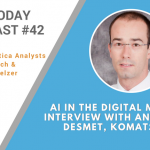
In this week’s episode of the AI Today podcast we interview Antoine Desmet, Analytics Manager at Komatsu. Many people might not realize just how much technology is involved in mining. We discuss the concept of the “Digital Mine” and how Komatsu uses Internet of Things (IoT) in combination with AI and ML to enable a large range of capabilities.
AI Today Podcast #41: Appian’s Low-code AI Environment: Interview with Jorge Sanchez

In this week’s episode of the AI Today podcast we interview Jorge Sanchez, Director of Product Strategy at Appian. It seems that everyone these days is taking notice of AI. We discuss how AI is transforming modern enterprises and how low-code platforms like Appian can help reduce the dependency on highly technical staff to build applications and greatly reduce the time to go from application concept to deployment.
AI Today Podcast #40: Interview with Oliver Mitchell, Autonomy Ventures

In this week’s episode of the AI Today podcast we interview Oliver Mitchell who is a Founding Partner of Autonomy Ventures and syndicated writer and host of local tech events in NYC. As a seasoned professional who has been involved in tech for 20+ years, Oliver shares insights into the future of the AI industry, with a unique focus on hardware and robotics.
AI Today Podcast #39: Interview with Michael Hayes, Government Affairs @ Consumer Technology Association (CTA)

Artificial Intelligence is on most everyone’s radar these days. And it’s no different with governments as well. In this podcast we interview Michael Hayes, Senior Manager of Government Affairs at the Consumer Technology Association (CTA.) We discuss laws and regulations surrounding AI, why it’s important to create workable definitions now for various terms related to AI (such as defining narrow AI), and where he sees AI taking us in the years to come.
AI Today Podcast #38: Interview with Dragos Margineantu, Boeing

The use of Artificial Intelligence (AI) is everywhere and in all industries. In this podcast, we interview long-time AI researcher and thought leader Dragos Margineantu, AI Chief Technologist at Boeing, who shares with us how Boeing is using AI and Machine Learning (ML) for its operations, manufacturing, supply chain, and Internet of Things (IoT) interactions and some thoughts on what the future of autonomous aircraft might be.
Continue reading AI Today Podcast #38: Interview with Dragos Margineantu, Boeing at Cognilytica.
AI Today Podcast #37: Life with Level 5 Autonomous Vehicles

Ever wonder how fully autonomous vehicles at Level 5 on the Society of Automotive Engineers (SAE) classification will impact your life? How will the way you live, work, interact socially, and care for the needy, disabled and elderly change when vehicles that can drive themselves safely from point to point and be beckoned at any time become prevalent?
Continue reading AI Today Podcast #37: Life with Level 5 Autonomous Vehicles at Cognilytica.
AI Today Podcast #36: Interview with Jim Adler, Toyota AI Ventures
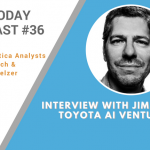
Companies of all sorts are increasing their investment in AI. Toyota has a wide range of applications of AI, so it’s no surprise that they are interested in helping to spur further growth in the industry by investing in early stage startups that are focused on AI and Machine Learning technology. In this podcast, we interview Jim Adler, Founding Managing Director, of Toyota AI Ventures.
Continue reading AI Today Podcast #36: Interview with Jim Adler, Toyota AI Ventures at Cognilytica.
AI Today Podcast #35: Interview with Tom Davenport, Babson College, MIT, and Deloitte — Augmented Intelligence, GDPR, Data Science, and More

In this wide ranging podcast, hear from Professor Tom Davenport, Distinguished Professor at Babson College, fellow of MIT initiative on digital economy, and senior advisor to Deloitte’s Analytics & AI practice. Tom Davenport recently wrote a piece for the Harvard Business Review on “Artificial Intelligence for the Real World”, as well as the widely promoted “Data Scientist: The Sexiest Job of the 21st Century”.
AI Today Podcast #34: Interview with Anant Kale, AppZen — Preventing Employee Expense Fraud with AI

Occupational fraud is not a small issue. On average, a company loses 5% of its revenues to employee financial fraud each year, with the annual median loss at $140,000 and over 20% of companies reporting losses of $1 million or more. The key to keeping a lid on this fraud is identifying the fraud before it takes too much of a bite out of the company’s bottom line, or even further, to put processes and controls in place that automatically audits, monitors, and accepts or rejects transactions that don’t fit an recognized pattern.
Bonus AI Today Podcast: AI & Blockchain Panel from TFE 2018 Event
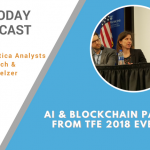
For our podcast listeners and followers, we have a special treat for you on this podcast. Be our special virtual guest and listen to an expert panel from the Conference on Technology and Future Economy 2018 talk about AI and Blockchain. Moderated by Professor Jim Liew (Johns Hopkins University), panelists were Reem El Seed (Deloitte), Kathleen Walch(Cognilytica), Jose Arrieta(US Department of Health & Human Services [HHS] formerly with the General Services Administration [GSA]), David Martens (Dovel Technologies), and Michael Novak (DTP).
Continue reading Bonus AI Today Podcast: AI & Blockchain Panel from TFE 2018 Event at Cognilytica.
AI Today Podcast #33: Interview with Prof. Alex Wissner-Gross — The Definition of Intelligence

How exactly do you define intelligence? Professor Alex Wissner-Gross, President and Chief Scientist at Gemedy and Fellow at Harvard Institute for Applied Computational Science has an answer. In this podcast, we interview Professor Wissner-Gross not only about his equation for defining intelligence, but also his thoughts that we need new challenges around data sets, as he believes data sets will get us to our goals of intelligence over algorithms.
AI Today Podcast #32: Interview with Siraj Raval – School of AI, YouTube Celeb

Understanding Artificial Intelligence (AI) and all its various details including Machine Learning (ML) and Deep Learning is not easy. So it’s always a great delight when someone like Siraj Raval can explain these concepts and work through them in a practical way on his YouTube channel, and his new School of AI. In this podcast, we talk about the importance of data for AI, his thoughts on the future of AI, the connection between AI and blockchain, China’s adoption of AI, and the role of ML and other concepts within the larger strategy of AI.
AI Today Podcast #31: AI and Blockchain — Double the Hype or Double the Value?
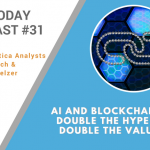
One of the other trends making the news and getting lots of attention is Blockchain. Proponents of blockchain claim that it will have fundamental, ground-breaking impact on all industries, changing the way that we transact with one another. Blockchain will enable greater degrees of transparency, trust, and decentralized control where governments and companies can’t own or manipulate the data at their will.
AI Today Podcast #30: Interview with MIT Professor Luis Perez-Breva — Contrary Perspectives on AI and MLInterview with MIT Professor Luis Perez-Breva — Contrary Perspectives on AI and MLAI Today Podcast #30: Interview with MIT Professor Luis Perez-Breva — Contrary Perspectives on AI and ML
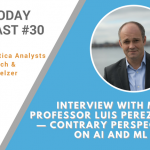
Every once in a while we have a podcast interview with someone that really makes us rethink some of the popular positions in Artificial Intelligence (AI) and Machine Learning (ML). This podcast’s interview with Luis Perez-Breva, faculty director of innovation teams at MIT’s School of Engineering and working with MIT Sloan School of Management, was one of those that really got us thinking about the relationship between data and Machine Learning and between Machine Learning and AI.
AI Today Podcast #29: The First Autonomous Vehicle Fatality — Now What?

On Sunday, March 18, 2018, an autonomous Uber vehicle operating in autonomous mode struck and killed a pedestrian crossing the road — the first fatal autonomous vehicle accident on a public road to occur. We’ve now crossed the realm from the theoretical of what could happen in this scenario to the reality of the situation actually happening.
AI Today Podcast #028: The AI-Enabled Future

Buckle your seatbelts. In this podcast, Cognilytica analysts Kathleen Walch and Ronald Schmelzer explain their vision for what the AI-Enabled Future looks like. Cognilytica believes that AI will impact all aspects of business, personal, and social life, and in this podcast, they explain the four major aspects in which AI will impact our every day lives.
Continue reading AI Today Podcast #028: The AI-Enabled Future at Cognilytica.
AI Today Podcast #027: AI in Music – Interview with Taryn Southern, YouTube Celeb and Musician

AI is impacting all industries and aspects of society, and music is no exception. In this AI Today podcast, we interview YouTube Celebrity, actress, and musician Taryn Southern who has released an album entirely produced and composed by AI called “I AM AI”. We discuss the four (and maybe even five) tools that Taryn used to produce this album as well as how easy it is for creatives to get started with AI in composing and working with music.
AI Today Podcast #026: Cognilytica Tested Voice Assistants, And You Might Be Surprised by the Results

Chatbots, er… maybe we really mean Conversational Interfaces… are becoming more and more ubiquitous and part of our every day business and consumer lives. There’s a wide variety of both text- and voice-based conversational interfaces and devices. But the ones we’re most familiar with are the voice-based ones that sit on our countertops and office desks.
AI Today Podcast #025: Interview with Matt Gardner, St. Louis Blues (NHL Hockey Team) – Facebook Chatbot Fan engagement

In this podcast, we interview Matt Gardner who heads digital strategy for the St. Louis Blues professional hockey team (NHL). The St. Louis Blues have implemented an AI-powered Facebook Messenger bot tool to enhance the fan and spectator experience. Matt realized that fans want to be engaged through social media moreso than websites and email.
AI Today Podcast #024: Interview with Ofer Ronen, Chatbase and Google Area 120

In this podcast, we are thrilled to interview Ofer Ronen, who is a general manager of Chatbase, which is a special project within the Google 120 internal project incubator. Chatbase is pioneering the space of chatbot analytics, and with the backing of Google it’s sure to be dominant in the market. In this podcast, we talk with Ofer about Chatbase, so-called “UMM” errors in chatbots, and also how the Google Area 120 internal incubator works to provide a hybrid startup / large company experience.
AI Today Podcast #023: Hot Topics – Sophia Robot and Andrew Ng’s new $175M AI Fund

In today’s podcast, we’ll address some interesting hot topics that have recently been making news in the AI industry. In particular, Cognilytica senior analysts Kathleen Walch and Ronald Schmelzer talk about Hanson Robotics’ Sophia Robot that’s been making significant waves in popular media and press. We talk about whether Sophia is really advanced, how it’s helping … or not… the field of AI, and if it’s making advances in the field of Artificial General Intelligence (AGI).
AI Today Podcast #022: Intelligent Process Automation (IPA)
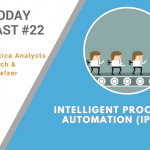
Robotic Process Automation (RPA) is making significant improvements into company’s operations by replacing rote human activity with automated tasks. Artificial Intelligence (AI) is poised to give this new engine of productivity a gigantic boost. Systems that leverage machine learning (ML) to dynamically adapt to new information and data will shift these systems from mere robots that automate processes to Intelligent Process Automation (IPA) tools that can significantly impact the face of the knowledge worker economy.
Continue reading AI Today Podcast #022: Intelligent Process Automation (IPA) at Cognilytica.
AI Today Podcast #021: “Project Katana” – Interview with Santiago Braje, Global Head of Credit Trading at ING

In this podcast, Cognilytica analysts interview Santiago Braje, Global Head of Credit Trading at ING, who is the primary lead of “Project Katana”, a special AI-driven internal project funded by ING’s innovation fund. The goal of project Katana is to provide an Augmented Intelligence platform that assists bond traders in market making. The primary problem they are solving is how to respond to request to bond clients where there isn’t a central exchange and orders are done over the counter.
AI Today Podcast #020: Augmented Intelligence

Many see the future of artificial intelligence (AI) as the replacement of human activities with fully autonomous agents, freeing up or replacing existing human labor to provide greater value for the organization. However, for many companies, fully substituting autonomous agents for their human counterparts is not technically possible at the moment and also may not be feasible or practical.
Continue reading AI Today Podcast #020: Augmented Intelligence at Cognilytica.
AI Today Podcast #019: Cognilytica’s AI Positioning Matrix (CAPM)

To solve the needs of customers trying to evaluate the constantly changing landscape of AI solutions, we’re introducing the Cognilytica AI Positioning Matrix (CAPM)™. The goals of the CAPM matrix are two-fold: identify for each particular application of AI, what the “sweet spot” of required complexity for AI solutions are and how broadly applicable to a range of AI problem areas that solution needs to be; and position various solutions against that same matrix.
Continue reading AI Today Podcast #019: Cognilytica’s AI Positioning Matrix (CAPM) at Cognilytica.
AI Today Podcast #018: Cognilytica AI Predictions for 2018

2018 is here! And we expect it to be a significant year for AI advancement. In particular, we have eight predictions that we believe will come to fruition in this upcoming year. Listen to this podcast and check out the accompanying article to hear about what we believe 2018 has in store for AI and the industry as a whole.
Continue reading AI Today Podcast #018: Cognilytica AI Predictions for 2018 at Cognilytica.
AI Today Podcast #017: Assistant-Enabled Commerce (AEC)

E-commerce has fundamentally changed the nature of retail. The Internet and the world of e-commerce that was created and then mobile has made it such that you can now go from wanting an item to having it in a matter of hours without ever stepping foot outside your home or office and you also have access to a much larger selection of goods.
Continue reading AI Today Podcast #017: Assistant-Enabled Commerce (AEC) at Cognilytica.
AI Today Podcast #016: Explainable AI (XAI)

The more we involve AI in our daily lives, the more we need to be able to trust the decisions that autonomous systems make. Right now, too much of what AI systems do are a “black box”. We have little visibility into how decisions are being made, conclusions drawn, objects identified, and more. AI black boxes are scary when the decisions they make impact people personally.
Continue reading AI Today Podcast #016: Explainable AI (XAI) at Cognilytica.
AI Today Podcast #015: AI Explainability & More – Interview with Mark van Rijmenam

The more we involved AI in our daily lives, the more we need to be able to trust the decisions that these systems make. Right now, too much of what AI systems do are a “black box”. We have little visibility into how decisions are being made, conclusions drawn, objects identified, and more. As the consequences of mistakes become more significant, it becomes more important to have visibility into the inner workings of AI decision-making, or in other words, AI Explainability.
AI Today Podcast #014: AI and IoT – Interview with Rashmi Misra, Microsoft

What do you get when you combine two hot buzzwords? Something super hot, of course. In this case, we’re talking about the combination of Internet of Things (IoT), which has been an area of significant investment and adoption with Artificial Intelligence (AI) which is gathering more and more steam as time progresses. What’s interesting is that AI is uniquely suited for gathering critical information from the vast quantities of data generated by the millions (billions?) of connected devices on the Internet.
AI Today Podcast #013: Avoiding Biases in AI Training Data – Interview with Tess Posner of AI4All
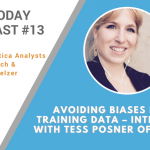
The basis for most modern AI systems are Machine Learning and Deep Learning. It goes without saying that in order for something to be “learning”, something has to teach it. Specifically, what makes these systems effective is a large quantity of good training data that is relevant to the area in which you’re trying to gather intelligence.
AI Today Podcast #012: Chatbots – Are they Useful?

Humans were born to talk and communicate. Much of the brain is devoted to generating, sensing, processing, and understanding speech and communications in its various forms. When humans were building their first civilizations we were also expanding the spoken and written form of communication. We didn’t start communication with swipes and types, in fact for most of human history we did not have technology, so it’s no surprise that what we want from our interactions with machines is what we want with interactions with people: natural conversation.
Continue reading AI Today Podcast #012: Chatbots – Are they Useful? at Cognilytica.
AI Today Podcast #011: BMW investing in AI – Interview with Sam Huang of BMW iVentures

Companies across the board are investing in AI, and certainly automotive companies are ahead of the pack. The progress towards autonomous vehicles, more intelligent driving assistance, and even things like automated parking and crash avoidance are all evidence of AI impacting the automotive industry in deep ways. In addition, there’s a wide range of non-AI technologies that are also providing competitive advantage to automotive companies.
AI Today Podcast #010: AI, Universities and the Knowledge Gap with Steve Kuyan of FutureLabs

NYU Tandon and FutureLabs recently ran an AI Summit (Oct 30-31, 2017) where Cognilytica and AI Today were proud partners. We were able to sit down with Steve Kuyan, a managing Director at FutureLabs to get this thoughts on the Summit, how artificial intelligence is currently being taught in universities, and the knowledge gap that’s taking place around AI.
AI Today Podcast #009: Investing in AI with John Frankel of ffVC

In this week’s podcast we interviewed John Frankel, Founding Partner at ff Venture Capital. We discussed his firm’s role at NYU FutureLabs Summit (where Cognilytica was a proud partner), the current state of the AI market from an investor’s perspective, and advice for enterprise and startup companies looking to have an AI strategy.
Episode Sponsors:
For over 25 years, QS has been helping prospective MBA candidates just like you make informed decisions about choosing the right business school.
Continue reading AI Today Podcast #009: Investing in AI with John Frankel of ffVC at Cognilytica.
AI Today Podcast #008: Weak, Strong AI – Do these Terms Matter?
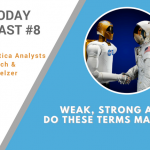
Artificial Intelligence has a broad spectrum of ability. Many people try to classify AI as weak or strong, depending on how generally intelligent we want this system to be. The more an AI system approaches the abilities of a human, with all the intelligence, emotion, broad applicability of knowledge, the more “strong” it is. On the other hand the more narrow in scope, specific to a particular application a particular AI system is, the more “weak” it is in comparison.
Continue reading AI Today Podcast #008: Weak, Strong AI – Do these Terms Matter? at Cognilytica.
AI Today Podcast #007: AI in the FinTech Industry: Interview with Kumar Srivastava

Artificial Intelligence (AI) is making its presence felt in a wide range of industries. In this podcast, we interview Kumar Srivastava of the BNY Mellon Silicon Valley Innovation center on how AI is impacting fintech and what the future holds for the industry.
Episode Sponsors:
For over 25 years, QS has been helping prospective MBA candidates just like you make informed decisions about choosing the right business school.
AI Today Podcast #006: Should We Regulate AI? If So, How?

As the pursuit of AI continues, notable technologists and tech titans are sounding the warning bells for what possibly could happen in a future world dominated by superintelligent AI systems. Cognilytica wrote about this extensively in our Should We Be Scared of AI? [Cognilytica Research CG02] document and companion podcast. In that article, we write about how some are seeking to mitigate those fears through the use of laws and regulations that can be enforced upon adopters and developers of AI technology.
Continue reading AI Today Podcast #006: Should We Regulate AI? If So, How? at Cognilytica.
AI Today Podcast #005: The AI Winters
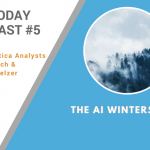
[wpdm_package id=’180′]
Show Notes:
Like all technologies, Artificial Intelligence (AI) is not immune to the waves of obscurity, hyped promotion, plateauing of interest, and decline. In fact, the AI industry has been through two such major waves of interest, hype, plateau, and decline, commonly referred to as the “AI Winters”.
Continue reading AI Today Podcast #005: The AI Winters at Cognilytica.
AI Today Podcast #004 – Guest Expert: James Barrat author of “Our Final Invention: Artificial Intelligence and the End of the Human Era”.
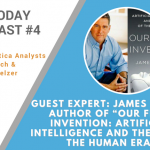
AI Today Podcast #004 – Guest Expert: James Barrat author of “Our Final Invention: Artificial Intelligence and the End of the Human Era”.
Show Notes:
On today’s show we interview James Barrat, author of “Our Final Invention: Artificial Intelligence and the End of the Human Era”. We discuss why James wrote this book 3 years ago now, how far away he really thinks we are from artificial human intelligence, the warning bells recently being sounded about artificial intelligence, and why he thinks there will not be another AI winter.
AI Today Podcast #003 – Guest Expert: Oliver Christie: “Have predictions for AI in 2017 Come True?”

Podcast #003 – Guest Expert: Oliver Christie: “Have predictions for AI in 2017 Come True?”
Show Notes:
On today’s show we interview guest expert Oliver Christie and discuss his 5 predictions for artificial intelligence in 2017. Now that we’re about two thirds of the way through 2017 we discuss what happened with his predictions – which ones came true, which ones are still in the far future.
AI Today Podcast #002: Should We Be Scared of AI?

AI Today Podcast #002: Should We Be Scared of AI?
For a more in-depth and detailed report of the topics discussed in this podcast, download our FREE research report:
[wpdm_package id=’130′]
Show notes:
With the recent resurgence of interest in Artificial Intelligence (AI), there’s a tidal wave of investment, activity, and attention being placed on all things even remotely connected to AI technologies.
Continue reading AI Today Podcast #002: Should We Be Scared of AI? at Cognilytica.
AI Today Podcast #001: Why Does AI Matter?
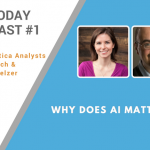
AI Today Podcast #001: Why Does AI Matter
Show notes:
In their inaugural podcast hosts Kathleen Walch and Ron Schmelzer discuss their reasons for Why AI Matters.
- It improves the ability for businesses to serve their customers in reliable and efficient ways
- AI can help people and organizations make better decisions and fewer mistakes
- AI removes repetitive, boring, but necessary tasks from people’s daily lives.
Continue reading AI Today Podcast #001: Why Does AI Matter? at Cognilytica.
En liten tjänst av I'm With Friends. Finns även på engelska.
![Who is on the AI Team? [AI Today podcast]](https://www.cognilytica.com/wp-content/uploads/2024/03/Who-is-on-the-AI-team-150x150.png)



